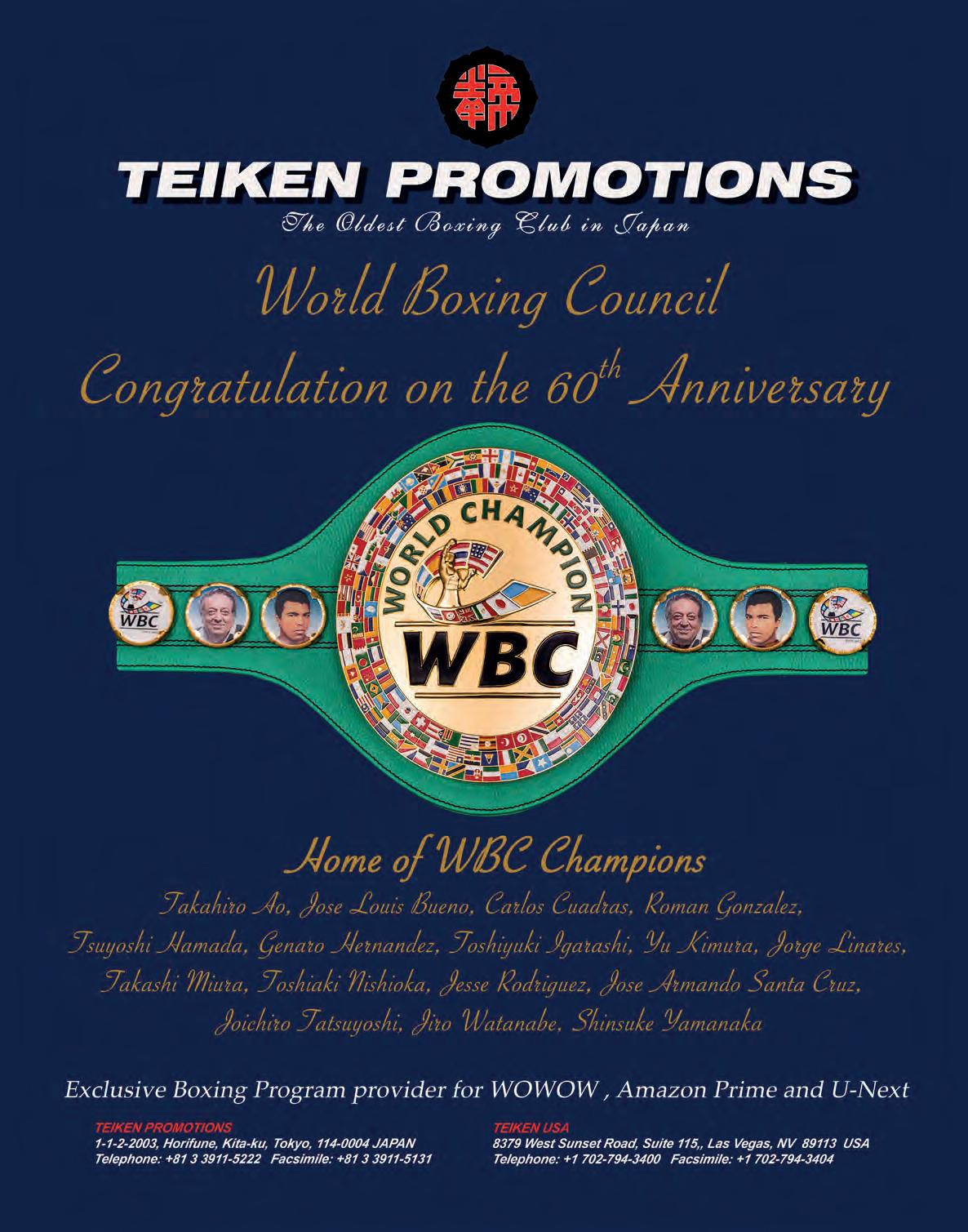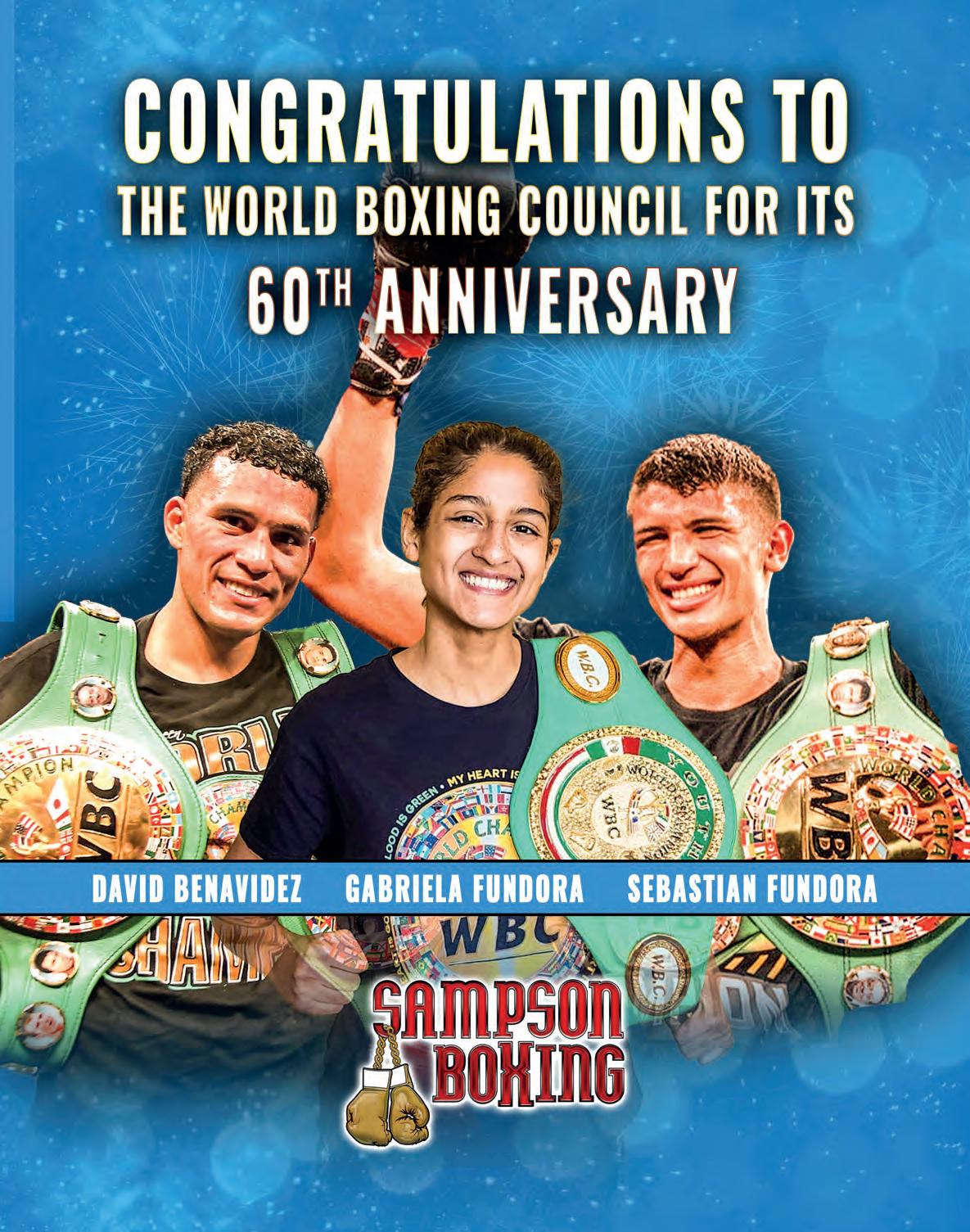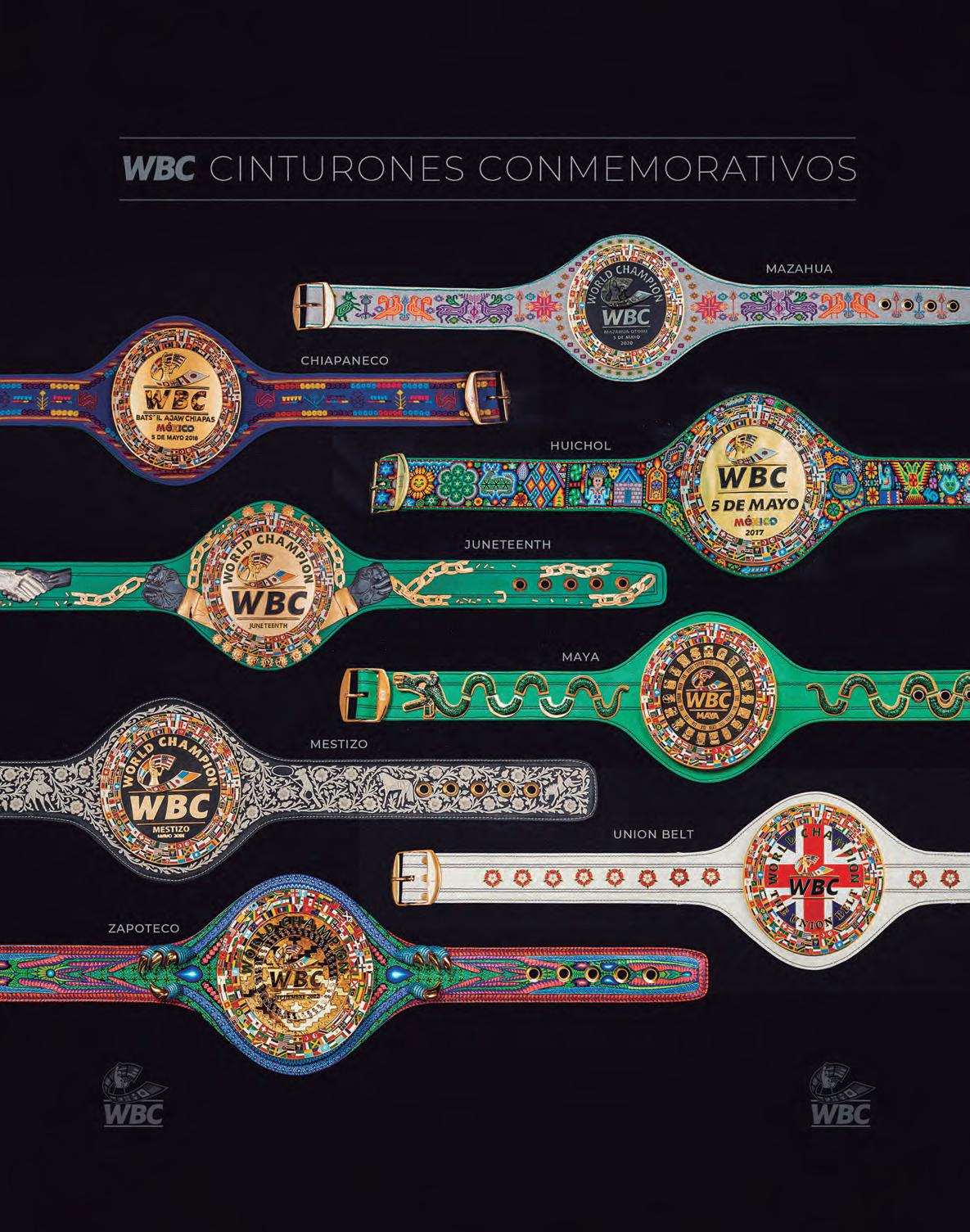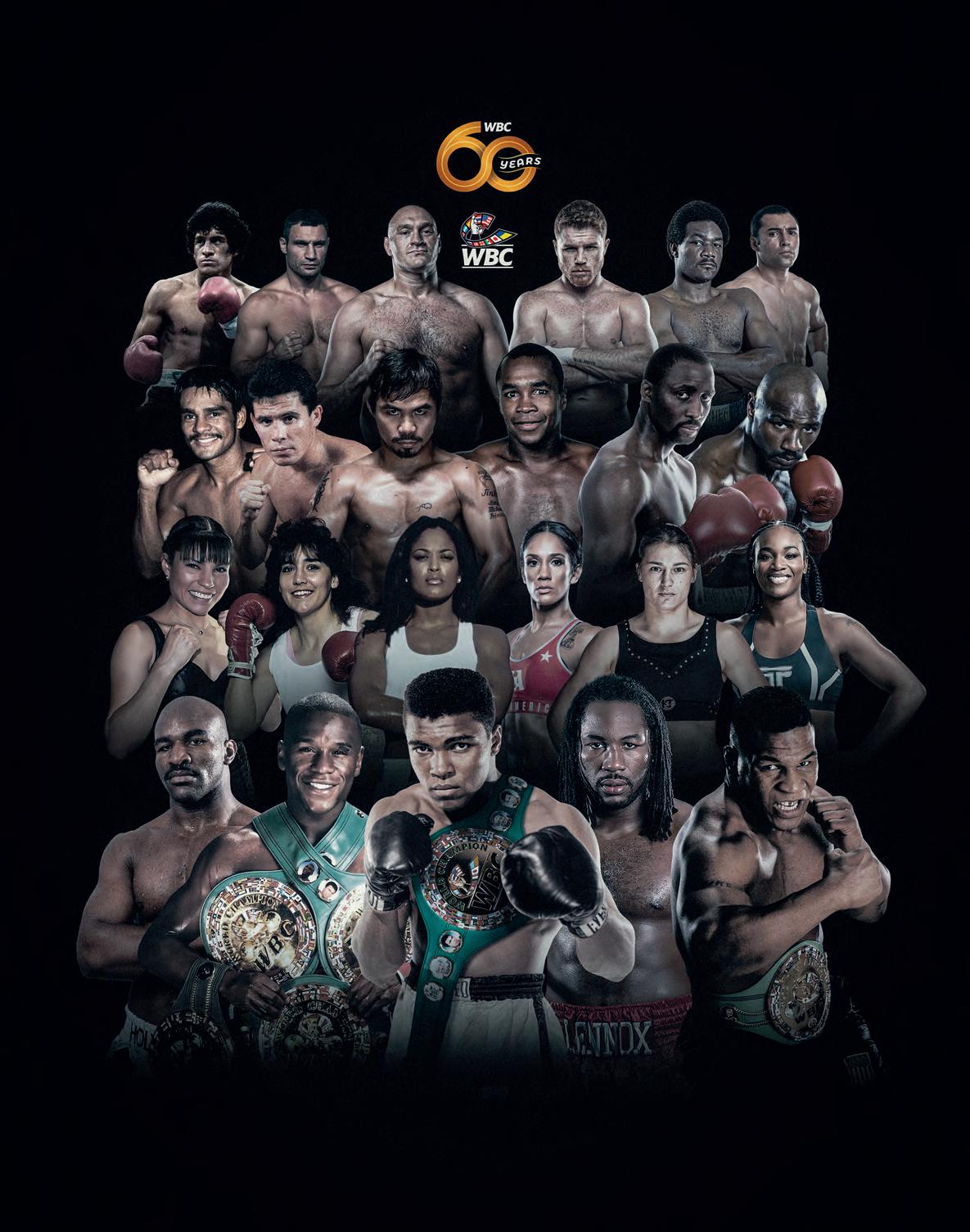Con disciplina y constancia; paso a paso se llega al éxito.

MAURICIO SULAIMÁN JOSÉ SULAIMÁN



Con disciplina y constancia; paso a paso se llega al éxito.



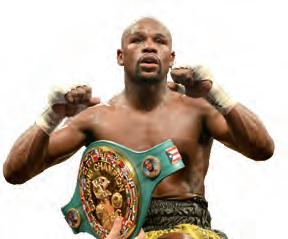
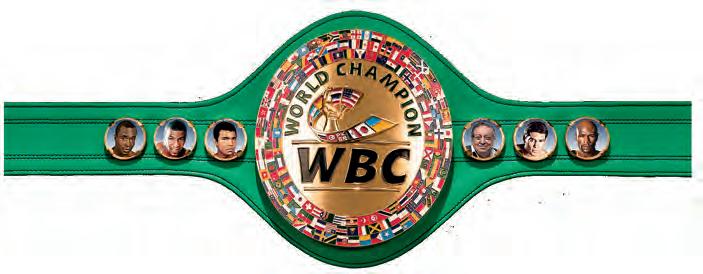
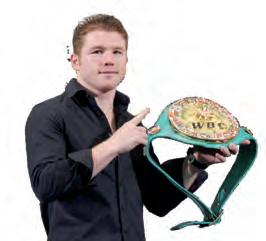

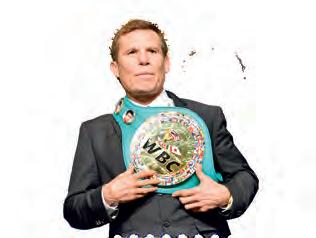
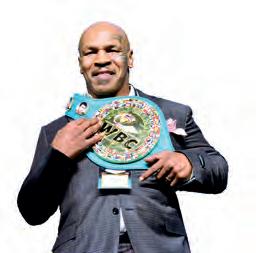
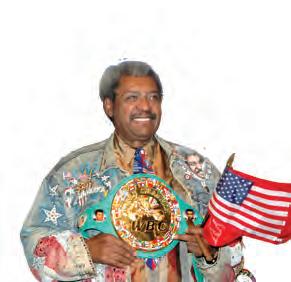
(1963 - 2023) 6 DÉCADAS DE ÉXITOS
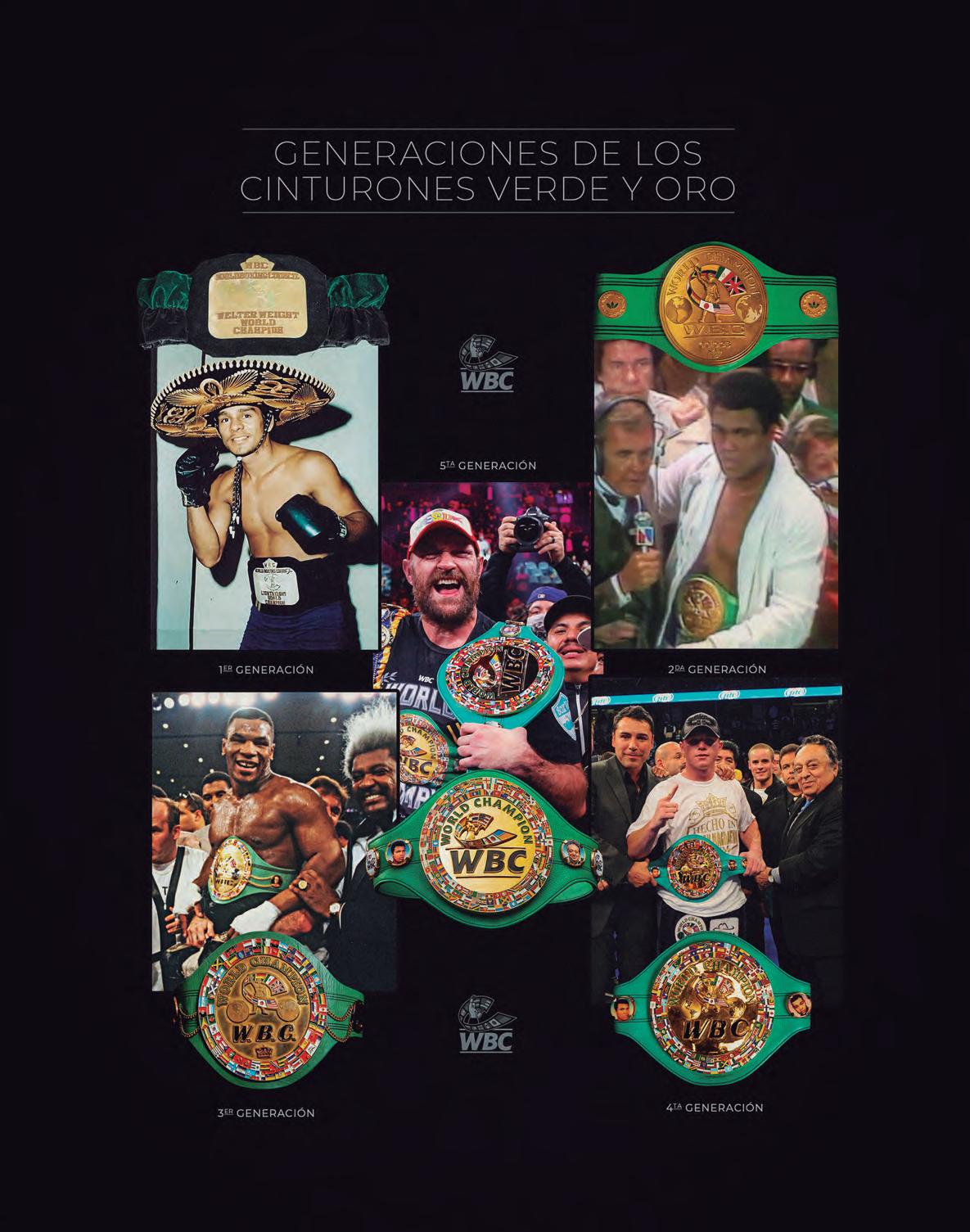
A lo largo de su historia, el Consejo Mundial de Boxeo (WBC) ha desempeñado un papel vital al ser un impulsor clave en la promoción, regulación y avance del boxeo a nivel mundial. Reconocer y honrar a todos aquellos que han contribuido al éxito del WBC, desde sus fundadores hasta los boxeadores, entrenadores, aficionados y todos los involucrados en esta industria, reviste una importancia fundamental. La celebración del 60 aniversario del WBC es un recordatorio de que el boxeo sigue siendo un deporte apasionante que une a personas de diferentes rincones del mundo.
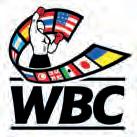
Bob Arum pág. 36
Julio César Chávez pág. 38
Mike Tyson pág. 42
Saúl “Canelo” Álvarez Barragán pág. 46
Mia St. John pág. 72
Christy Salters Martin pág. 74
Erik “Terrible” Morales pág. 76
Carlos “Cañas” Zárate pág. 78
Mauricio Sulaimán Saldívar
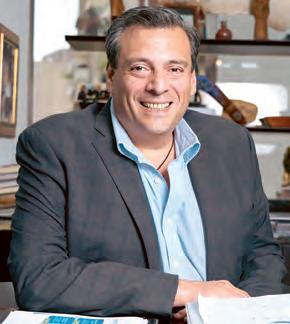
Presidente del Consejo Mundial de Boxeo Pág. 14
Martha Saldívar pág. 20
Claudia Sulaimán Saldívar pág. 22
Martha Lucila Sulaimán Saldívar pág. 24
José Martín Sulaimán Saldívar pág. 26
Fernando Sulaimán Saldívar pág. 28
Héctor Sulaimán Saldívar pág. 30
Don King pág. 32
Roberto Durán “Manos de Piedra” pág. 50
Sugar Ray Leonard pág. 54
Jimmy Lennon Jr. pág. 58
Jackie Nava pág. 60
Humberto “Chiquita” González pág. 62
Marina “Barby” Juárez pág. 66
José Luis Castillo pág. 68
Ahmet Öner pág. 80
Jeff Fenech pág. 82
Rogelio Mora pág. 84
José “Josejas” Sulaimán pág. 90
Luis Menendez pág. 92
Don Majeski pág. 94
Akihiko Honda pág. 96
Sampson Lewkowicz pág. 98
Aniversario 60 del WBC pág. 102
1. Reducción de 15 a 12 rounds en peleas titulares, avalado con estudios en UCLA sobre los graves efectos de la deshidratación y fatiga en los últimos 3 rounds.
2. Pesaje oficial un día antes de la pelea y no el mismo día, para evitar el gran castigo físico y la deshidratación de los boxeadores.
3. Control de peso de los boxeadores cada 30, 14 y 7 días antes del pesaje oficial, para evitar prácticas de pérdida de peso brutales.
4. Batalla sin cuartel en contra del “Aparthaid” en Sudáfrica en apoyo al movimiento con Nelson Mandela.
5. Examen médico anual obligatorio para todos los boxeadores e implementación de diversos exámenes específicos como MRI, EKG, etc….
6. Creación del programa World Boxing Cares que se encarga de la parte filantrópica, humanitaria y de responsabilidad social a nivel mundial.
7. Creación del programa RingTelmex - Telcel, con becas para nuevas promesas y pensión vitalicia y seguridad social para 27 ex campeones mundiales.
8. Creaciones de divisiones intermedias de peso como: paja, minimosca, supermosca, supergallo, superwelter, supermedio, crucero y bridger, buscando mayor equidad competitiva y reducir los riesgos de mantenerse en el mismo peso.
9. Seguro de Vida y Hospitalización para todos los que combaten en funciones con título mundial WBC.
10. Creación del programa contra el dopaje, así como las pruebas sorpresa en conjunto con VADA obligatorio para los boxeadores clasificados.
11. Creación del campeonato Femenil, proyectando de gran manera la participación de las Mujeres en el Boxeo.
12. Creación de los campeonatos mundiales de Muay Thai, acuerdo entre Don José Sulaimán y el Rey de Tailandia.
13. Presencia obligatoria de dos ambulancias en el lugar en donde se desarrollará una función de boxeo.
14. Cuenta obligatoria de 8 segundos tras una caída.
15. Prohibición de hemostáticos, sales de amoniaco y otras substancias en las esquinas.
16. Creación del guante con pulgar adherido para evitar daños en los ojos.
17. Aplicación de la regla de repetición instantánea por medio de un monitor de televisión, para dar mayor justicia, aprovechando la tecnología.
18. Aumento de 3 a 4 cuerdas en el ring para evitar accidentes.
19. Creación del Fondo José Sulaimán para boxeadores retirados o activos que se encuentren en situación de emergencia.
20. Desarrollo del WBC University que imparte y vuelve homogéneo el conocimiento boxístico.
21. Creación de la regla de puntuación abierta con la que se dan a conocer las tarjetas de los jueces al término de los rounds 4 y 8 de las peleas titulares.
1. Reduced championship bouts from 15 to 12 rounds, supported by UCLA studies on the severe effects of dehydration and fatigue in the final 3 rounds.
2. Official weigh-in one day before the fight rather than on the same day to prevent extensive physical punishment and dehydration of boxers.
3. Weight monitoring of boxers 30, 14, and 7 days before the official weigh-in to prevent extreme weight-cutting practices.
4. Fierce battle against "Apartheid" in South Africa in support of the movement with Nelson Mandela.
5. Mandatory annual medical examination for all boxers and implementation of various specific tests such as MRI, EKG, etc.
6. Creation of the World Boxing Cares program focuses on philanthropy, humanitarian efforts, and social responsibility worldwide.
7. Creation of the RingTelmex - Telcel program, offering scholarships for new prospects, lifelong pensions, and social security for 27 former world champions.
8. Establish intermediate weight divisions such as strawweight, light flyweight, super flyweight, super bantamweight, super welterweight, super middleweight, cruiserweight, and bridger, aiming for more significant competitive equity and reduced risks of staying in the same weight class.
9. Life and Hospitalization Insurance for all participants in WBC world title bouts.
10. Creation of the anti-doping program and mandatory surprise tests in collaboration with VADA for ranked boxers.
11. Creation of the Women's Championship, significantly advancing the participation of Women in Boxing.
12. Creation of Muay Thai world championships, a collaboration between Don José Sulaimán and the King of Thailand.
13. Mandatory presence of two ambulances at the location of a boxing event.
14. Mandatory 8-second count after a knockdown.
15. Prohibition of hemostatics, ammonia salts, and other substances in corners.
16. Creation of gloves with attached thumbs to prevent eye damage.
17. Application of instant replay through a television monitor to ensure fairness and utilize technology.
18. Increase from 3 to 4 ropes in the boxing ring to prevent accidents.
19. Creation of the José Sulaimán Fund to aid retired or active boxers in emergencies.
20. Establishment of the WBC University, offering standardized boxing knowledge.
21. Creation of the open scoring rule, revealing judges' scorecards at the end of rounds 4 and 8 in championship fights.
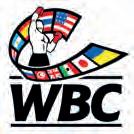

www.lideresmexicanos.com
Raúl Ferráez & Jorge Ferráez
ASISTENTE DE PRESIDENCIA Liliana Morales
DIRECTORA EDITORIAL Ivonne Bacha Baz
EDITORA DE ESTA EDICIÓN ESPECIAL: Marcela Ramos Jiménez
EDITORA DE CONTENIDOS COMERCIALES Eva Ávalos Madrigal EDITOR DE CONTENIDOS ESPECIALES Jesús Issac González REPORTEROS Tania Ramírez Aguirre, Jaime Higuera Mariñelarena
TRADUCCIÓN AL INGLÉS: Mariana Torres
DIRECTOR DE ARTE Fernando Izquierdo Romero
DISEÑO Carlos Cuevas Martínez, Luis Enrique González Piceno, I. Moisés Cervantes Galicia
ADMINISTRACIÓN Susana Sánchez Gasca TESORERÍA Claudia G. García Bejarano CONTABILIDAD María Angélica García FACTURACIÓN Leticia Barrera Yepez, Miguel Ángel Rojas SISTEMAS Alberto Delira Trejo
MENSAJERÍA José A. Barquera, Rogelio Flores, Alfredo Ramírez y Enrique Rosas CIRCULACIÓN Juan Carlos Camarillo circulacion@lideresmexicanos.com
COORDINADOR DE LOGÍSTICA Y SEGURIDAD Alberto León Mejía
DIRECTOR COMERCIAL Gabriel Torres Origel ENLACE COMERCIAL Ana María Hernández Molina PROYECTOS COMERCIALES Marigel Orozco Guzmán SUBDIRECTOR COMERCIAL Rodrigo Piña Hernández VENTAS Y PUBLICIDAD Antonio Salinas Bravo, Humberto Nava Rios, Javier Senderos López y Antonella Escudero Ficachi COORDINADOR COMERCIAL DE ESTA EDICIÓN Yazmín Avilés
Las personas mencionadas participan en la elaboración de la revista y son contratadas por Administradora de Medios SA de CV

REDACTORES Jacobo Bautista, Rocío Estrada, Yolanda Bravo, Lilian Reyes, Adriana Nolasco, Ximena Nagano, Leslie González, Gisela Méndez, Marco Beteta, Roberto Mourey, Georgina Hernández, Gina Álvarez y Ana Laura Santos
FOTÓGRAFOS Vivian Bibliowicz, Alejandro Gamboa Mireles, Maritza López, Eduardo Warnholtz, David Eisenberg, Roberto Tetlalmatzin, Alejandro Fernández, Patricia Aridjis, Jesús Díaz, Bruno Sánchez, Gret Velasco, Oscar Agis y Emma Lozano
Las citadas personas son prestadores de servicios independientes a la revista
Diego Plaza -CEO
Alex Prida - DIRECTOR DE OPERACIONES
Marco Rojas - DIRECTOR COMERCIAL
Guadalupe Flores - DIRECTORA ELIOT MEDIA
@lideresmexicanos
Alberto Rodríguez - INFLUENCER MARKETING DIRECTOR
Eduardo Nuñez - DIRECTOR DE MARKETING
Israel Plaza - DIRECTOR ELIOT PLAY.
Oficina de representación en Estados Unidos escribir a: Ferraez Publications of America Corp. 15443 knoll Trail, Suite 210, 75248 Dallas, TX.
Deyanira Ferráez Washington D. C. deyaniraferraez@hotmail.com Preprensa digital e impresión: SmartPress SA de CV, Caravaggio 30 Col. Mixcoac México D.F. 03910 Tel. 55 5611-9653 Distribuido por: comercializadora gbn s.a. de c.v. Tels. 0155-56188551
Papel Norbrite de 67 grs.
Líderes Mexicanos es publicada once veces al año por FERRÁEZ COMUNICACIÓN, S.A. de C.V., Avenida Revolución 1267, piso 19 Int. 1976, Los Alpes, Alvaro Obregón 01010, México, D.F.; teléfono 91365100. Miembro activo de la Cámara Nacional de la Industria Editorial Mexicana No. 1864. El título de la presente publicación, así como el contenido, se encuentran debidamente autorizados y protegidos por la Comisión Calificadora de Publicaciones y Revistas Ilustradas, Secretaría de Gobernación, como consta en los Certificados de Licitud de Título No. 6375 y de Licitud de Contenido No. 5056 expedidos ambos con fecha 12 de agosto de 1992. Asimismo, esta publicación se encuentra protegida y registrada ante la Dirección General de Derechos de Autor, Secretaría de Educación Pública, según consta en la Reserva de Derechos No. 04-2014-090513591700-102. Derechos Reservados “D.R.”, “C”. Presidente Editorial, Raul H. Ferraez Perez Pascal. Porte pagado y autorizado por SEPOMEX número PP09-0203; Publicada mensualmente por Ferráez Comunicación S.A. de C.V. edición CDXXVIII Septiembre 2023. Las opiniones vertidas en este número no son necesariamente las del editor. Se encuentra totalmente prohibida la reproducción parcial o total por cualquier método de esta publicación. De esta edición fueron impresos 43,000 ejemplares.
ESTE ES EL INICIO DE LA SECCIÓN DURANTE LA CUAL CONOCEREMOS CON MÁS DETALLE LAS HISTORIAS DE NUESTROS PERSONAJES.
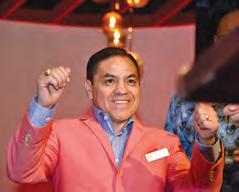

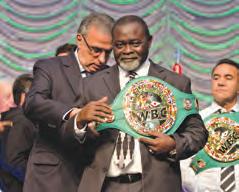
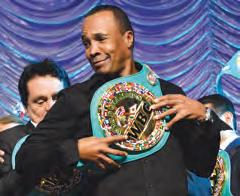
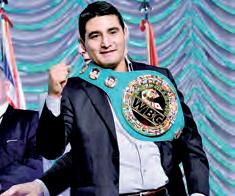

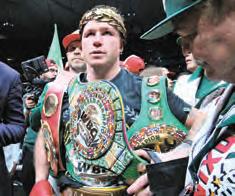
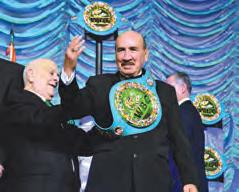

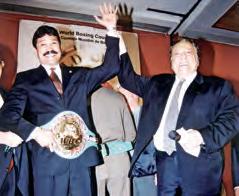

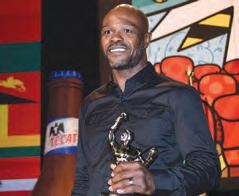
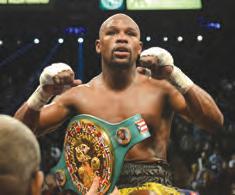

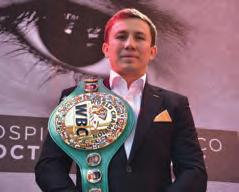
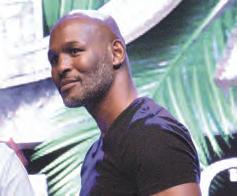
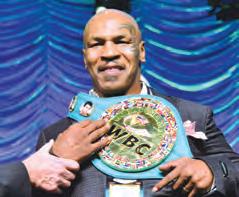
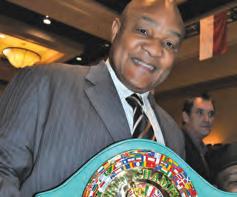
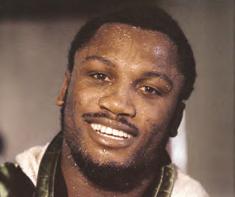


• Muhammad Ali
• Joe Frazier
• George Foreman
• Mike Tyson
• Evander Holyfield

• Lennox Lewis
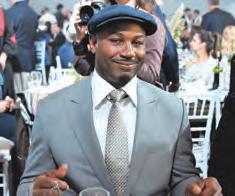
• Vitaly Klitschko
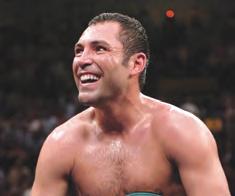
• Deontay Wilder
• Tyson Fury

• Oleksandr Usyk
• Bob Foster
• Thomas Hearns

• Sugar Ray Leonard
• Roy Jones Jr.
• Bernard Hopkins
• Nigel Benn
• Joe Calzaghe
• Saúl “Canelo” Álvarez
• Emile Griffith
• Carlos Monzón
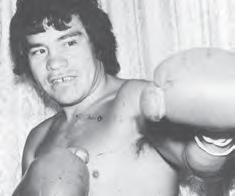
• Marvelous Marvin Hagler
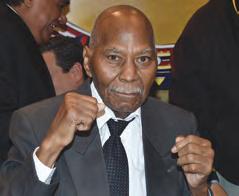
• Roberto Durán
• Julian Jackson
• Sergio Martínez
• Miguel Cotto
• Gennady Golovkin
• Wilfredo Benitez
• Terry Norris
• Oscar De La Hoya
• Manny Pacquiao
• Floyd Mayweather
• José “Mantequilla” Nápoles
• Pernell Whitaker
• Félix Trinidad
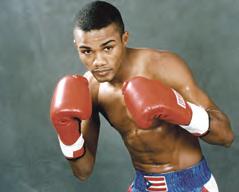
• Shane Mosley
• Bruno Arcari
• Julio César Chávez
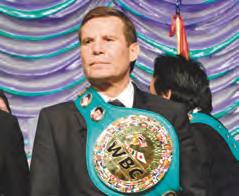
• Konstantin Tszyu
• Érik Morales
• Carlos Ortiz
• Alexis Arguello
• Héctor “Macho” Camacho
• Gabriel “Flash” Elorde
• Azumah Nelson
• Juan Manuel Márquez
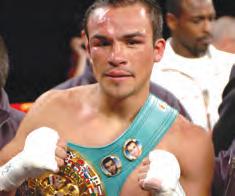
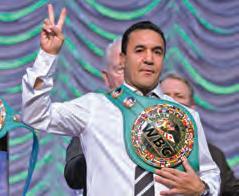
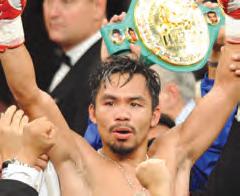
• Ultiminio Ramos
• Eder Jofre
• Rubén “Púas” Olivares
• Salvador Sánchez
• Wilfredo Gómez
• Jeff Fenech
• Marco Antonio Barrera
• Carlos Zárate
• Larry Holmes
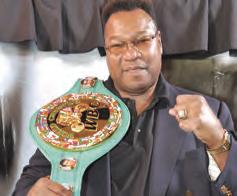
• Joichiro Tatsuyoshi
• Naoya Inoue
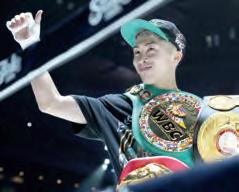
• Román “Chocolatito” González
• Humberto “Chiquita” González
• Ricardo “Finito” López
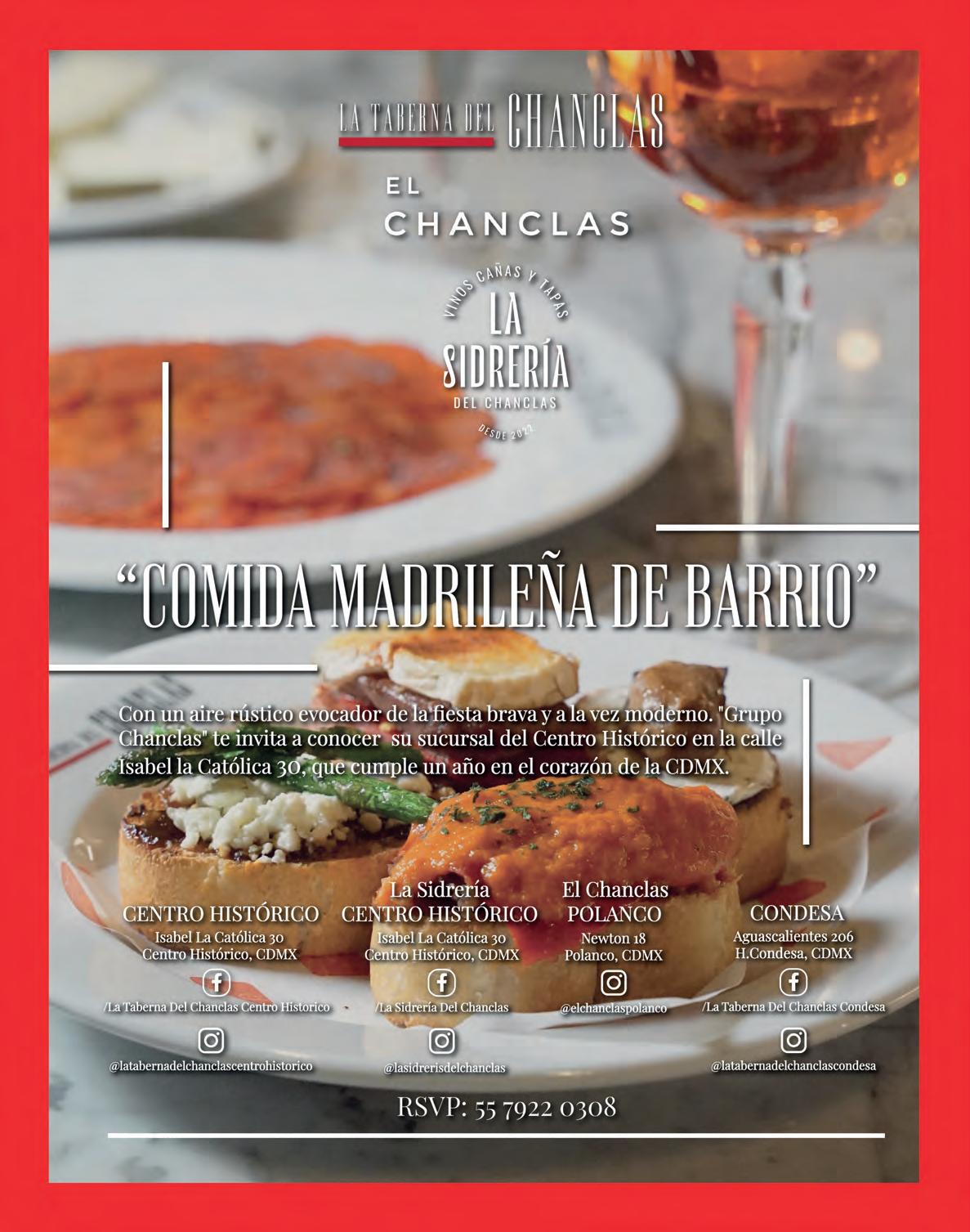
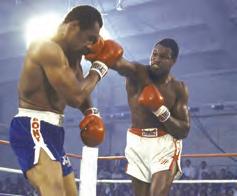
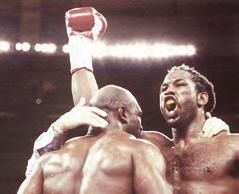
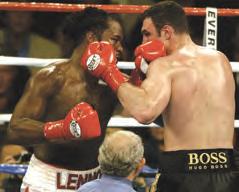
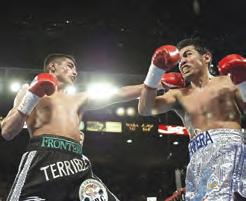
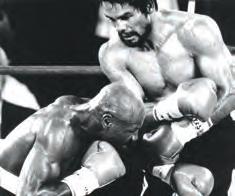


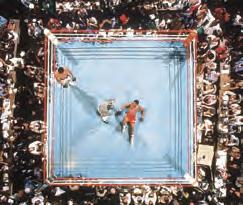
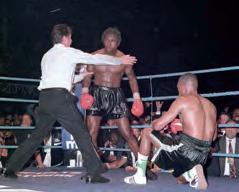
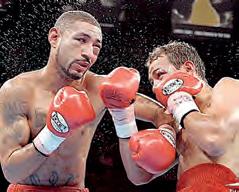
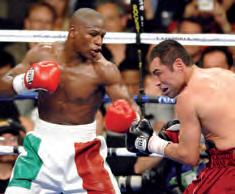
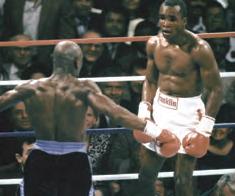
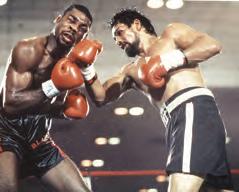
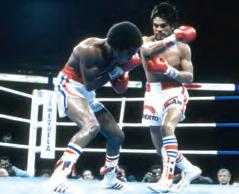

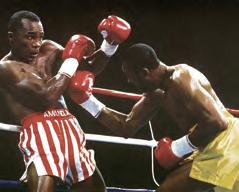
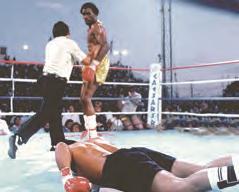
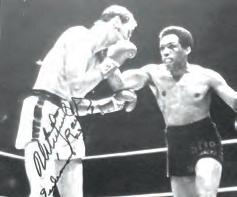
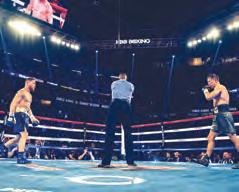
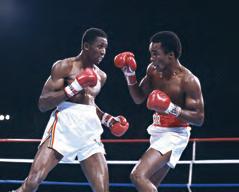
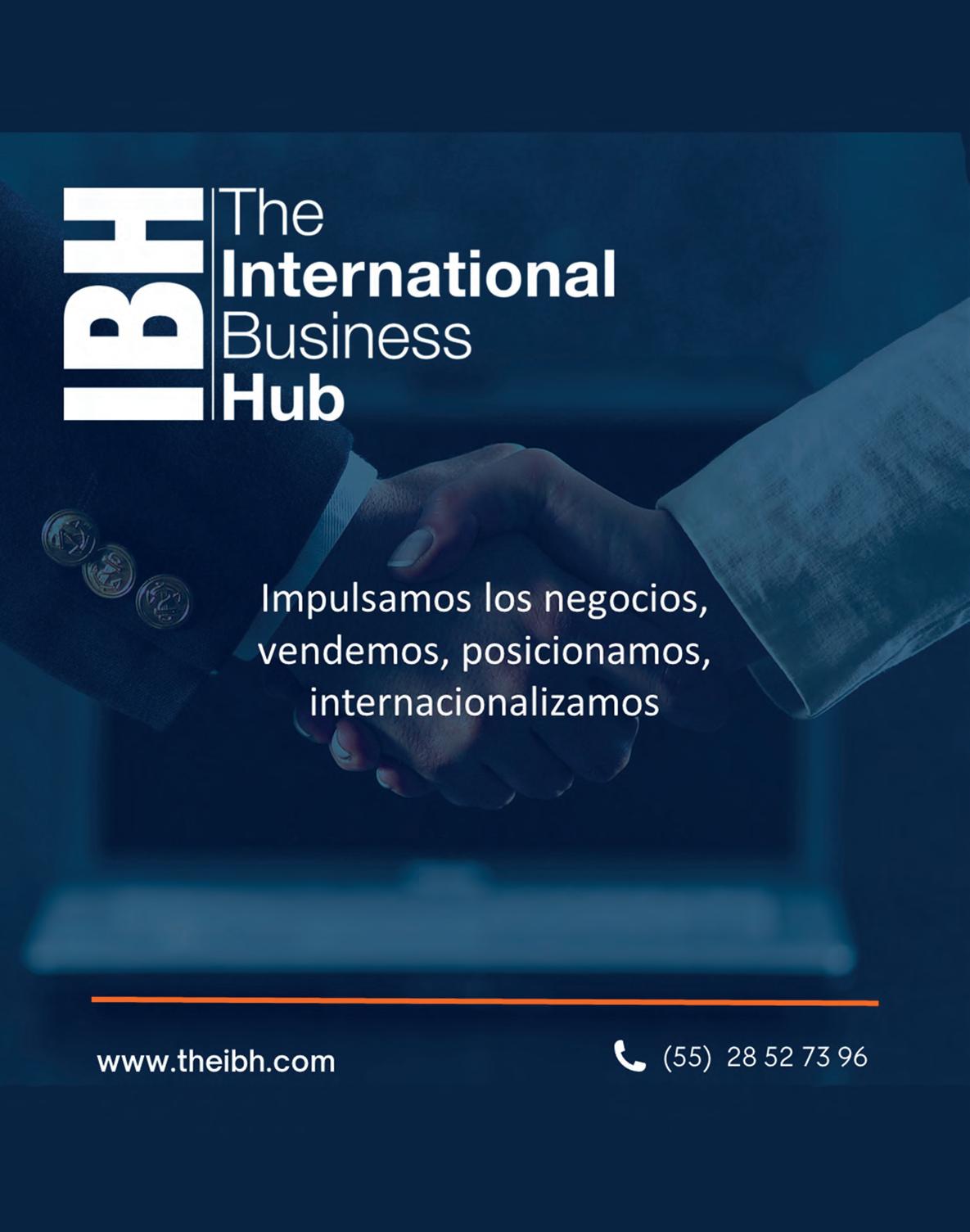
• Ali vs Frazier
• Álvarez vs Golovkin I,II y III
• Arce vs Hussein II
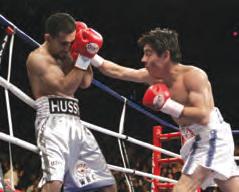
• Barkley vs Durán
• Barrera vs morales I, II y III
• Benn vs McClellan
• Chacon vs Limón IV
• Chávez vs Camacho
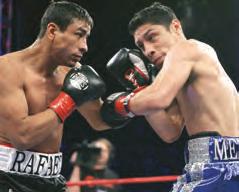
• Chávez vs Taylor
• Corrales vs Castillo
• De la Hoya vs Mayweather
• De la Hoya vs Quartey
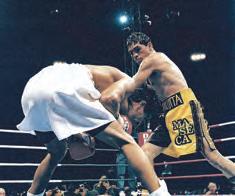
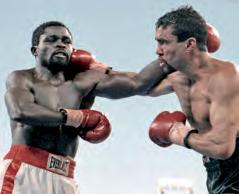
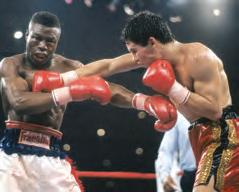
• Fenech vs Nelson
• Foreman vs Ali

• Fury vs Wilder I, II y III
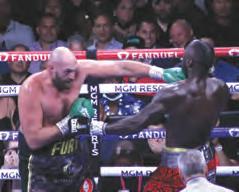
• Hagler vs Durán
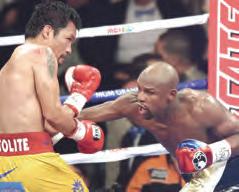
• Hagler vs Hearns
• Hagler vs Leonard
• Hearns vs Durán
• Holmes vs Cooney
• Holmes vs Norton
• Holyfield vs Bowe
• Holyfield vs Lewis
• Hopkins vs Trinidad
• Leonard vs Durán II
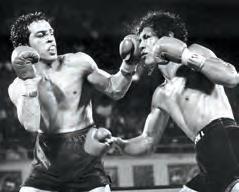
• Leonard vs Hearns
• Lewis vs Klitschko
• Mayweather vs Cotto
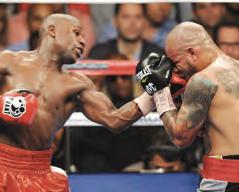
• Mayweather vs Pacquiao
• Ortiz vs Ramos
• Sánchez vs Gómez
• Torres vs Chionoi
• Trinidad vs De la Hoya
• Tyson vs Douglas
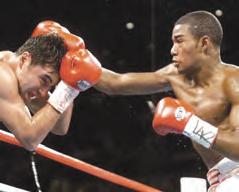
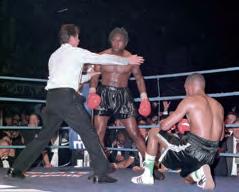
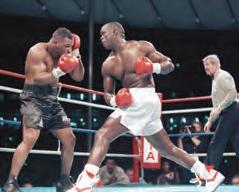
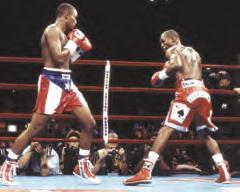
• Tyson vs Spinks
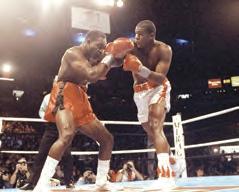
• Whitaker vs De la Hoya
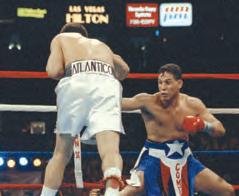
• R. Márquez vs I. Vázquez I, II y III
•"Chiquita" González vs M. Carbajal I,II,III



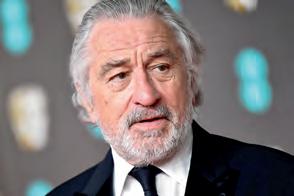
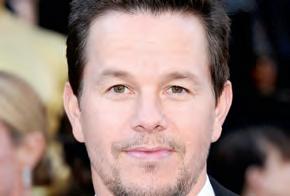
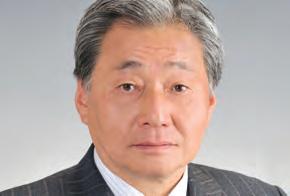
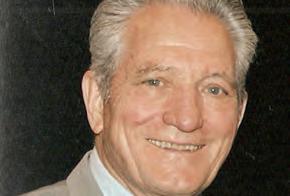
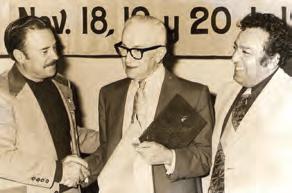
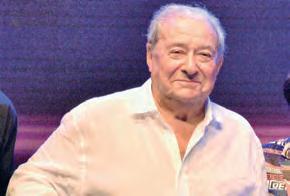
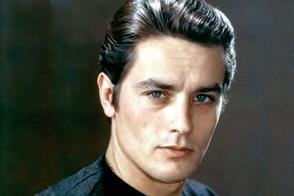
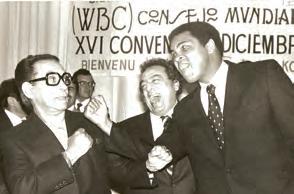
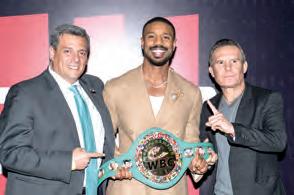
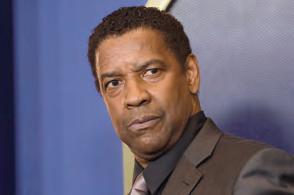
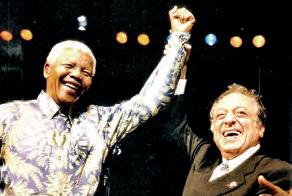

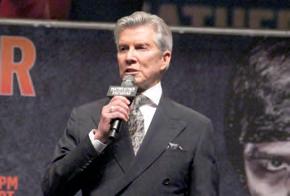
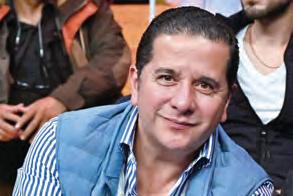
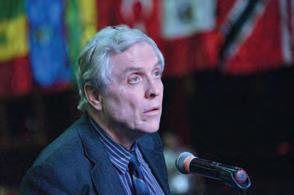

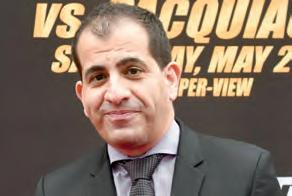
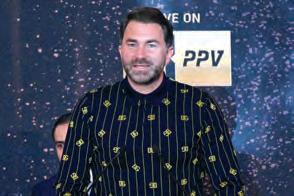
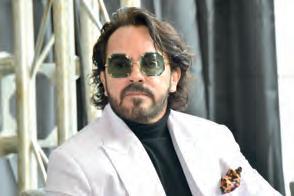
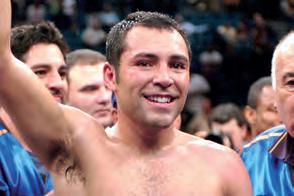
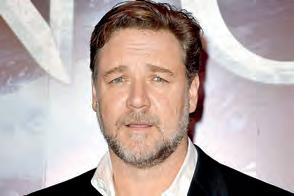
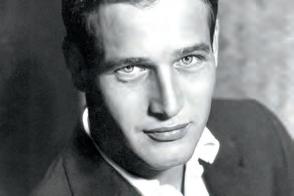
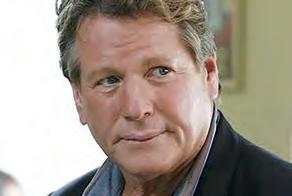
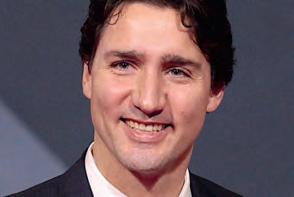
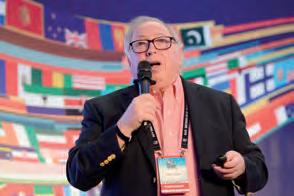
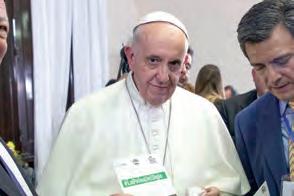
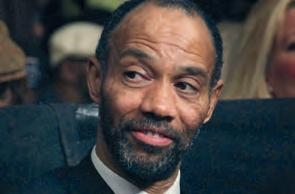
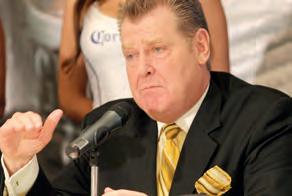
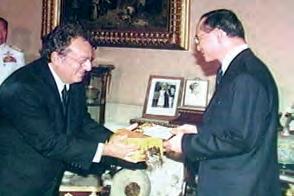
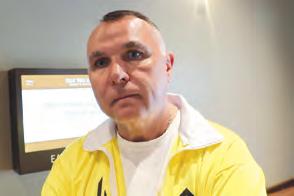 Don Majeski
Richard Sturm
Stephen Espinoza
Oscar De La Hoya
Eddie Hearn
Fernando Beltrán
Pepe Gómez
Russell Crowe
Paul Newman
Ryan O´neal
Justin Trudeau
Neil Leifer
Papa Francisco
Al Haymon
Dan Goosen
Rey de Tailandia
Don Majeski
Richard Sturm
Stephen Espinoza
Oscar De La Hoya
Eddie Hearn
Fernando Beltrán
Pepe Gómez
Russell Crowe
Paul Newman
Ryan O´neal
Justin Trudeau
Neil Leifer
Papa Francisco
Al Haymon
Dan Goosen
Rey de Tailandia
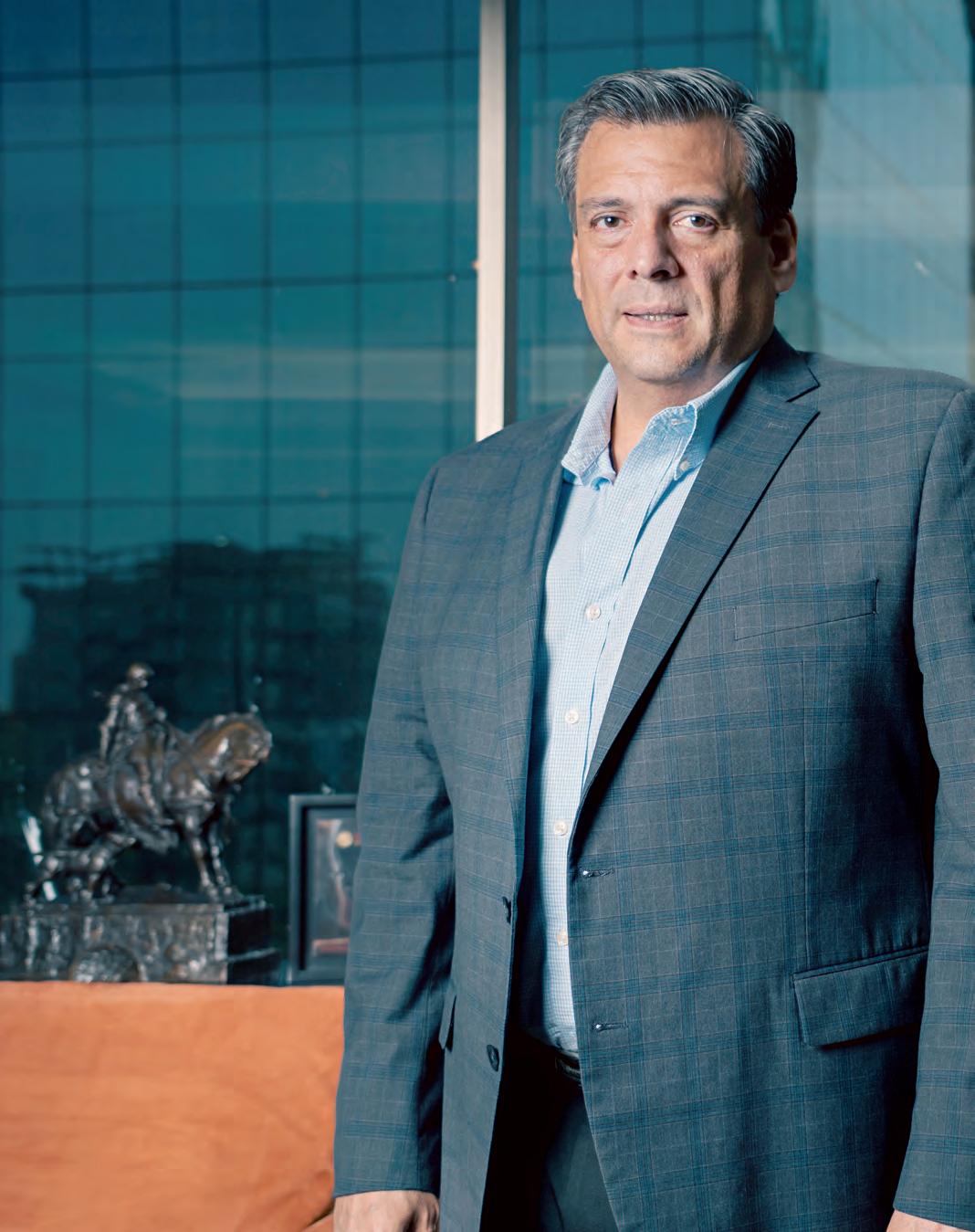
#WBC. PRESIDENCY. LEGACY

2014 fue un año de grandes cambios para el boxeo mundial y para la familia Sulaimán; con gran tristeza se dio el último adiós a Don José Sulaimán Chagnón, pero al tiempo y con júbilo se daba la bienvenida a Mauricio Sulaimán Saldívar como presidente del Consejo Mundial de Boxeo, asegurando con esto, la continuación del legado de progreso, protección e impulso al pugilismo mundial.
Lilian Reyes Berriel Bruno Sánchez Carlos CuevasDESDE ESE entonces, Mauricio Sulaimán Saldívar ha sido ejemplo de que lo que se hereda no se hurta y sin lugar a duda heredó los valores, la disciplina y el amor al boxeo de su padre, lo que le ha servido para enfrentar los grandes retos de un boxeo que requiere de nuevas semillas que den a luz nuevos y grandes campeones mundiales.
“Yo nací el penúltimo día de 1969 y a mi papá lo eligen presidente del Consejo Mundial de Boxeo en 1975, entonces nací en una casa 100% boxística, desde que tengo uso de razón, el box ha estado dentro del día a día de la familia. En la sala de casa vi a Mohamed Alí, Don King, Sugar Ray Leonard, Julio César Chávez, Mike Tyson, en fin, todo mundo pasaba por la casa e incluso hubo algunos boxeadores que vivieron con nosotros, entonces puedo decir que tuve una niñez rodeada de boxeo,” recordó Mauricio Sulaimán.
Agregó que “a mi papá yo me le pegué mucho desde chiquitito. Me empezó a llevar a peleas, a conferencias de prensa, a eventos. Ya cuando estaba más grande, le empecé a ayudar nada más para quitarle un poco de carga de trabajo, hacía algunas cartas, contestaba teléfonos, tomaba recados y así me fui metiendo, sin darme cuenta, al Consejo Mundial de Boxeo, hasta que, lamentablemente, se nos fue hace nueve años”.
Y ahí “yo pensé que todo acababa para mí y mi camino en el Consejo, pero no fue así ya que la Junta de

Nació el 30 de diciembre de 1969 en Ciudad de México.
Estudió la licenciatura en Administración de Empresas en el Tecnologico de Monterrey. Desde el 2014 preside el Consejo Mundial de Boxeo (WBC).
Gobierno votó a favor de nombrarme presidente y así comenzó la historia”.
El reto de ser un Sulaimán
Pese a lo que se pueda creer o pensar, el legado de Don José Sulaimán, dejó para Mauricio una vara muy alta que ha tenido que mantener e incluso elevar para que el pugilismo mundial siga firme y el nombre del WBC siga siendo respetado.
“El Consejo Mundial de Boxeo es un centro de esperanza para muchos boxeadores antes, durante y después de su época de gloria. Entonces mi responsabilidad es darle continuidad a un organismo que ha sido artífice de cambio para el boxeo”.
Especialmente en México, el boxeo está viviendo un renacimiento, la gente está de vuelta en las arenas e incluso está atenta a las transmisiones sabatinas por televisión abierta, al respecto, Sulaimán Saldívar aseguró que “hoy en día el boxeo mexicano está muy bien, está sólido. El mejor campeón de todo el mundo es mexicano, Saúl “Canelo” Álvarez; tenemos otros campeones de muy buen nivel, como son Rey Martínez, Rey Vargas y un posible rival del Canelo, que es David Benavidez, un muchacho mexico-americano. Además de muchas mujeres campeonas y buenos prospectos que vienen empujando fuerte”.
Pese a este empuje, Mauricio Sulaimán reconoció que existe una gran amenaza para la continuidad del boxeo. “Se está olvidando al boxeo amateur y ese es un problema importante. Por ello, estamos tomando cartas en el asunto, formamos un Comité llamado WBC Amateur, desde donde hemos trabajado mucho en hacer torneos, en capacitar a jueces, referís, promotores y entrenadores para darle una plataforma sólida al boxeo amateur”.
Agregó que “hacemos mucho para apoyar a quienes han estado abandonados, como son los gimnasios, los clubes, las federaciones pequeñas de algunos estados y también trabajamos con otros países”.
Respecto a torneos tan importantes como los Guantes de Oro que fueron semilleros de ídolos, Mauricio Sulaimán aseguró que “tuve una reunión muy importante con la familia Lutteroth, en la cual, una de las propuestas es revivir los Guantes de Oro, así como revivir la función sabatina de Box en la Ciudad de México. Entonces ahí vamos avanzando”.
Se quiere “revivir esas épocas, hay mucha gente que habla con nostalgia de haber visto el boxeo con su papá, con su abuelo, con la familia, con los amigos; el boxeo reunía familias enteras, eran los sábados de este deporte tanto frente a la televisión como en la Arena Coliseo de Perú 77. Vamos avanzando muy bien, pero es cosa de no aflojar y de buscar que se logre”.
Otro reto importante “que estamos enfrentando es el hecho de que el boxeo no es una industria como todos los demás deportes donde hay una liga, un calendario, una temporada, en donde si un jugador se lastima no hay problema, la temporada sigue, aquí no, el boxeo es un deporte individual que va programándose sin tener un calendario. Los promotores muchas veces no trabajan en conjunto para darle al público las peleas que este quiere ver, lo cual es uno de los problemas que enfrentamos: buscar la unidad entre promotores y entre plataformas”.
2014 was a year of significant changes for world boxing and the Sulaimán family. With great sorrow, the final farewell was bid to Don José Sulaimán Chagnón. Yet, simultaneously, with jubilation, Mauricio Sulaimán Saldívar took the helm as President of the World Boxing Council. This marked the continuation of a legacy of progress, protection, and support for global boxing.
SINCE THEN, Mauricio Sulaimán Saldívar has been a faithful example of inheriting values, discipline, and a love for boxing from his father. These traits have equipped him to face the formidable challenges of a sport that requires new seeds to bear new and great world champions.
"I was born on the penultimate day of 1969, and my father was elected President of the World Boxing Council in 1975. I was born into a home that was 100% focused on boxing. As far back as I can remember, boxing has been part of our daily lives. In our living room, I saw Muhammad Ali, Don King, Sugar Ray Leonard, Julio César Chávez, Mike Tyson—everyone passed through our house. There were even some boxers who lived with us. So, I can say that I had a childhood surrounded by boxing", Mauricio Sulaimán recalled.
He added, "I closely shadowed my father from a young age. He started taking me to fights, press conferences, and events. When I got older, I began helping him to ease his workload. I'd wrote letters, answered phones, and took messages. I unknowingly became involved with the World Boxing Council until, unfortunately, he left us nine years ago".
And at that point, "I thought everything was over for me regarding the Council, but that wasn't the case. The Board of Governors voted to name me president, and that's how the story began".
Contrary to what might be believed or thought, Don José Sulaimán's legacy left Mauricio with a high bar to maintain and raise. This ensures that global boxing remains firm and that the WBC's name continues to command respect.
"The World Boxing Council is a beacon of hope for many boxers, before, during, and after their glory days. So, my responsibility is to continue an organization that has been an agent of change for boxing".
Born on December 30, 1969, in Mexico City
Studied Business Administration at Tecnológico de Monterrey
President of the World Boxing Council (WBC) since 2014
Mauricio remembers that his father was always very demanding, and his words remain with him. "When he coached us in baseball, he'd say, 'Here, you either win or you win. If you lose, you lose, even if you give your best effort. But for the next time, you need to do better'".
"Boxing is a sport, not a game. In soccer, you score goals; in basketball, you make baskets; in baseball, you run. But you can't play boxing because it's a combat sport".
Para Mauricio Sulaimán, el futuro del boxeo es brillante pero también es necesario adaptarse a lo actual, “usar la tecnología que existe y no resistirse a los cambios. Normalmente la resistencia al cambio es tremenda en un deporte tan tradicional como lo es el boxeo. Poner una regla nueva o poner un protocolo o una práctica diferente, es complicadísimo, pero definitivamente sí tenemos que entenderlo y ponernos al día con las redes sociales, con la tecnología, con la diversificación de competencia”.
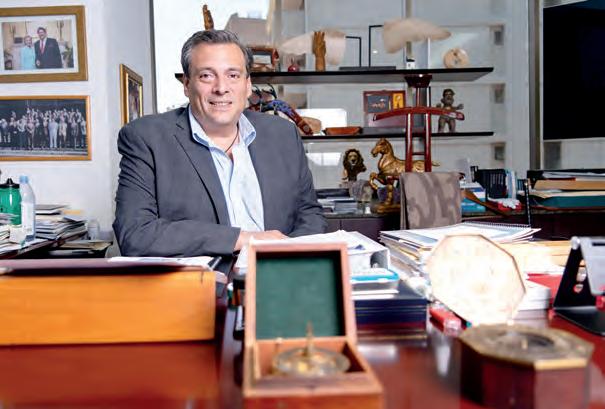
El público “pide y exige, ahora la sociedad pide todo rápido y esto nos está impactando. El reglamento del boxeo de nuestro organismo tiene 60 años, entonces en un intento de adaptación estamos buscando intervenir para tener modificaciones y otras opciones para satisfacer al público”.
Para concluir Mauricio Sulaimán hizo un llamado a dejar de ver el boxeo como el patito feo de los deportes.
“Tenemos que dejar de estigmatizar al boxeo y comenzar a verlo
como el deporte que brinda muchas oportunidades. Es tan lamentable ver cómo somos el deporte que más medallas olímpicas ha dado a México, más satisfacciones en campeonatos mundiales se han tenido, somos referente a nivel mundial. Es triste ver que cuando un boxeador está haciendo sus pininos, nadie lo quiere apoyar, las empresas ponen de pretexto que no patrocinan deportes de contacto, así como los políticos, quienes no le dan la atención que debería tener como deporte; pero cuándo son famosos ya todo mundo quiere estar en sus calzoncillos, sentarse en su mesa y demás”.
Eso “no debería ser, todos deberíamos apoyar al boxeo mexicano. Un ejemplo muy grande es el fondo que tiene Don Carlos Slim desde hace 15 años, el cual es un programa que le da una mensualidad a 20 boxeadores, además de una pensión vitalicia a 27 excampeones mundiales. Precisamente, el Canelo salió de ahí de Ring Telmex Telcel y, de ahí han salido 19 campeones mundiales de esa labor calladita, sin presunciones”.
Es muy penoso, “insisto, ver cómo el boxeo no tiene apoyo, el boxeador no tiene apoyo y los que
Mauricio recuerda que su papá siempre fue muy exigente y sus palabras siguen presentes. “Cuando nos entrenaba en el beisbol nos decía, ‘aquí o se gana o se gana, si perdiste, perdiste, aunque hayas hecho el mejor esfuerzo y para la siguiente tienes que hacerlo mejor’”.
Especially in Mexico, boxing is experiencing a renaissance. People are returning to the arenas and tuning in for Saturday broadcasts on open television. Mauricio Sulaimán
Saldívar assured that "Mexican boxing is thriving now. It's solid. The best champion in the world is Mexican Saúl 'Canelo' Álvarez. We have other champions of high caliber, like Rey Martínez, Rey Vargas, and a potential opponent for Canelo, David Benavidez, a Mexican-American young man. Moreover, many women champions and promising prospects are pushing strongly".
Despite this momentum, Mauricio Sulaimán acknowledged a significant threat to the continuity of boxing. "Amateur boxing is being forgotten, and that's a significant problem. That's why we're taking action. We've formed a committee called WBC Amateur. From there, we've worked hard to organize tournaments and train judges, referees, promoters, and coaches to provide a solid platform for amateur boxing".
He added, "We're doing much to support those neglected—gyms, clubs, small federations in some states, and we collaborate with other countries".
Regarding significant tournaments like the ‘Golden Gloves’ that served as a breeding ground for idols, Mauricio Sulaimán stated, "I had an important meeting with the Luttero-
“Cada boxeador que está en un gimnasio es un criminal en potencia fuera de las calles”.
llegan a sobresalir es porque realmente se encontraron una persona que creyó en ellos y los ayudó o porque fue tanta su dedicación que llegaron al éxito. Pero si el boxeo fuera visto de una manera diferente, tendríamos muchos más campeones, más medallas olímpicas”. Hay siempre que recordar que el boxeo “promueve programas sociales, combate de manera directa las adicciones, promueve la salud y la actividad física, combate todo tipo de delincuencia. Cada boxeador que está en un gimnasio es un criminal en potencia fuera de las calles, así de sencillo. Por ello, debemos continuar con el apoyo, valorar al boxeo y dejar de verlo como el patito feo del deporte”, finalizó.
an industry like other sports, where there's a league, a calendar, a season. In other sports, if a player gets injured, there's no problem—the season continues. But in boxing, it's different. It's an individual sport that's scheduled without a fixed calendar. Promoters often don't work together to give the audience the fights they want to see. This is one of the problems we face—seeking unity among promoters and platforms".
For Mauricio Sulaimán, the future of boxing is bright, but it's also crucial to adapt to the present. "We should use the available technology and not resist change. Resistance to change is typically hard in a sport as traditional as boxing. Introducing a new rule, protocol, or different practice is extremely challenging. But we must understand and keep up with social media, technology, and diversification of competition".
"The public demands and expects things quickly now. This is affecting us. Our Organization rules are 60 years old. Therefore, as an attempt to adapt, we're working on interventions to make modifications and offer other options to satisfy the audience".
ne wants to be on their side, wearing their endorsements, sitting at their table, and more".
"This shouldn't be the case. We should all support Mexican boxing. A significant example is the fund that Carlos Slim has had for 15 years. The program provides a monthly stipend to 20 boxers and a lifelong pension to 27 former world champions. Precisely, 'Canelo' emerged from there at Ring Telmex Telcel. Nineteen world champions have come from that quiet work without fanfare".
It's pretty regrettable, "I emphasize, how boxing lacks support, how boxers lack support. Those who manage to succeed usually do so because they either found someone who believed in them and helped them or because they were so dedicated that they achieved success. But if boxing were seen in a different light, we would have many more champions, more Olympic medals".
We must recognize that boxing "promotes social programs, directly combats addiction, promotes health and physical activity, and combats all types of crime. Every boxer in a gym is a potential criminal out of the streets. It's that simple. Therefore, we must continue supporting, valuing, and stop seeing boxing as the ugly duckling of sports", he concluded.
th family, and one of the proposals is to bring back ‘Golden Gloves’,' as well as bring back the Saturday boxing event in Mexico City. So, we're making progress there".
He wants to "bring back those times; many people fondly remember watching boxing with their fathers, grandfathers, families, and friends. Boxing is used to bring entire families together. Saturdays were about this sport in front of the television and at the Arena Coliseo on Perú 77 Street. We're making good progress, but it's a matter of not letting up and striving to achieve it".
Another significant challenge "that we're facing is that boxing isn't
In conclusion, Mauricio Sulaimán pleaded to stop viewing boxing as the ugly duckling of sports.
"We need to stop stigmatizing boxing and begin to see it as a sport that offers numerous opportunities. It's disheartening that we're the sport that has given the most Olympic medals to Mexico. We're a global reference. It's sad that when a boxer is starting, no one wants to support them. Companies use the excuse that they don't sponsor combat sports, as do politicians, who fail to give the attention that the sport deserves. But when they become famous, everyo-
wbcboxing.com
@WBCBoxing
World Boxing Council
wbcboxing
World Boxing Council
“El boxeo es un deporte que no es un juego. En el futbol metes goles; canastas en el básquet; carreras en el beisbol, pero no puedes jugar boxeo porque es un deporte de combate”.
"Every boxer in a gym is a potential criminal out of the streets".
Esta historia de amor nació en Ciudad Victoria, Tamaulipas. Él, un joven entusiasta, emprendedor y siempre altruista. Ella una señorita de casa, de gran corazón mismo que fue cautivado por este intrépido muchacho, sin saber que juntos formarían una pareja pilar del boxeo mexicano.
EL CORAZÓN y el hogar de Martha Saldívar siempre estuvieron abiertos a todos los pugilistas tanto nacionales como internacionales. Con el cariño de una madre, recibía a un Julio César Chávez, quien le decía “jefa, ¿me invita a comer?, pero quiero comida árabe”, o un Mike Tyson quién le llamaba amorosamente, ‘Mamá’.
“José siempre decía que él que no vivía para servir, no servía para vivir y esa frase nos marcó a todos, por eso siempre buscamos ayudar a los demás. Exactamente no sé cómo llegó al Consejo Mundial de Boxeo, pero lo que sí me tocó, gracias a Dios, fue acompañarlo a Túnez, en aquel tiempo eran 24 países afiliados. Y ahí fue elegido Presidente del Consejo,” recordó la viuda de José Sulaimán.
“Fue una cosa maravillosa, porque yo recuerdo que estaba en la calle, acompañada de dos hombres
gran respaldo que Sulaimán necesitaba para dar y dejar su corazón en el WBC. Tras su partida, sus hijos han continuado su legado. “Para mí es un orgullo que Mauricio haya seguido lo que dejó su papá. Yo estoy feliz, porque lo está haciendo muy bien”.
Martha Saldívar se dice feliz de haber compartido su vida con José Sulaimán y de haber formado una gran familia, amorosa y con muchos valores.
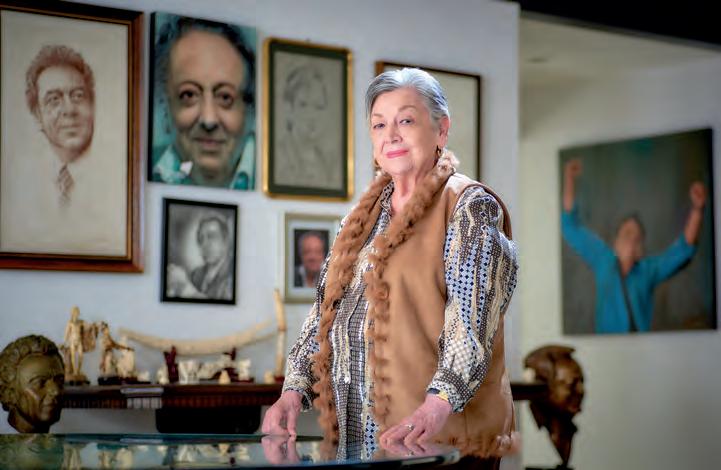
“Ha sido una vida intensa, pero muy bonita, y más porque, José era muy especial. Le caía tan bien a todos”, recordó feliz.
porque en ese tiempo las mujeres no podían salir solas a la calle, cuando de repente se escuchó una música muy especial y uno de ellos me dice: ‘escuche están pidiendo que elijan a José Sulaimán’. Fue un momento maravilloso”.
Al pasar de los años, los pasillos del hogar de Martha Saldívar fueron testigos de cómo esta gran mujer recibió y cobijó a cientos de pugilistas que veían a Don José Sulaimán como un mentor, amigo y gran respaldo.
“Es algo que no es tan difícil de explicar, si ves a una persona con necesidad, la ayudas. Tengo una lista de 36 personas que vivieron en mi casa. Algunos boxeadores cubanos, amigos de mi hijo Pepe, parientes, conocidos, entre otros. Son cosas que se vivieron con mucho cariño”.
Martha y José compartieron 42 años de amor que, sin duda, fueron el
“Un día, José se quedó trabajando hasta la madrugada, yo estaba dormida y me despierta diciéndome, Martha, ¿no tendrás por ahí una ensaladita?, a lo que yo enojada respondí, sí, aquí tengo una bajo la cama… Me despertó porque tenía hambre, total le hice su ensalada y luego nos reíamos mucho”.
This love story was born in Ciudad Victoria, Tamaulipas. He was a young enthusiast, entrepreneur, and always altruistic. She was a homely lady with a big heart captivated by this fearless young man, not knowing that together, they would become a cornerstone couple of Mexican boxing.
MARTHA SALDÍVAR'S heart and home were always open to all national and international boxers. With a mother's affection, she welcomed Julio César Chávez, who would say, "Will you invite me to eat? But I want Arabian food", or a Mike Tyson who affectionately called her "Mom".
“José always used to say that he who didn't live to serve didn't serve to live, and that phrase marked all of us. That's why we always seek to help others. I don't know how he came to the World Boxing Council, but I did experience, thank God, accompanying him to Tunisia when there were 24 affiliated countries at that time. And there, he was chosen as the President of the Council", recalled José Sulaimán's widow.
"It was a wonderful thing because I remember I was on the street, accompanied by two men because
women couldn't go out alone at that time, when suddenly we heard extraordinary music, and one of them said to me, 'Listen, they're asking for José Sulaimán to be chosen.' It was a marvelous moment".
Over the years, the halls of Martha Saldívar's home witnessed how this remarkable woman received and sheltered hundreds of boxers who saw Don José Sulaimán as a mentor, friend, and firm support.
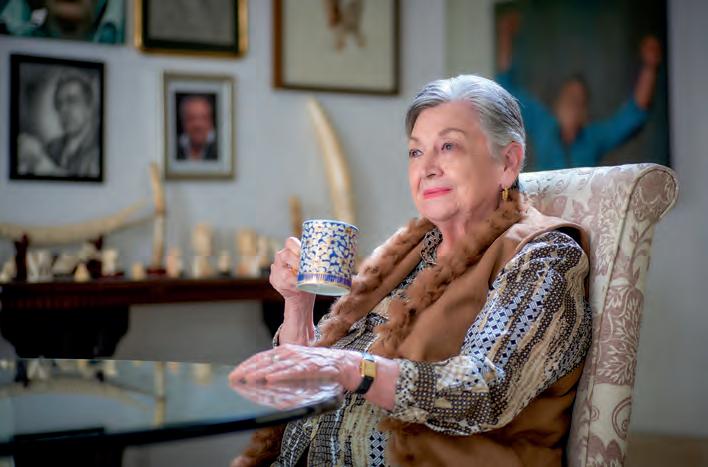
"It's not that hard to explain. If you see a person in need, you help them. I have a list of 36 people who lived in my house. Some Cuban boxers, friends of my son Pepe, relatives, acquaintances, among others. These are things that were experienced with much love".
Martha and José shared 42 years of love that undoubtedly provided the vital support Sulaimán needed to give
his heart to the WBC. After his passing, their children have continued his legacy. "For me, it's a source of pride that Mauricio followed in his father's footsteps. I'm happy because he's doing very well".
Martha Saldívar says she's happy to have shared her life with José Sulaimán and formed a loving family with strong values.
"It has been an intense life, but a beautiful one, especially because José was exceptional. Everyone loved him so much", she fondly remembered.
"One day, José worked until the early morning. I was asleep, and he said, 'Martha, do you have a small salad somewhere?' Annoyed, I replied, 'Yes, I have one under the bed.' He woke me up because he was hungry. I ended up preparing his salad, and we laughed a lot".

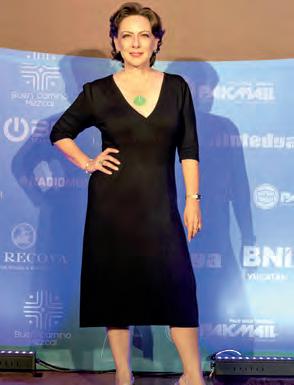
El legado que marcó su papá, Don José Sulaimán, dejó en Claudia y en cada uno de sus hermanos, grandes lecciones de lo que la perseverancia y disciplina puede traer consigo. La menor de seis hermanos, ha dedicado su vida a la parte empresarial, pues desde muy joven comenzó a trabajar, siempre impulsada por el apoyo de su papá quien estuvo muy pendiente de su carrera profesional.
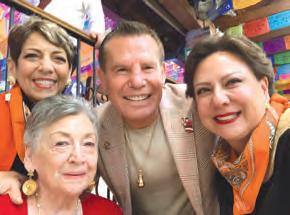

MI PAPÁ fue elegido presidente del WBC cuando yo tenía un año, así es que, desde que tengo memoria, mi mundo ha estado en medio de increíbles personalidades y eventos de boxeo.
Recuerdo que cuando tenía 9 años ¡estaba enamorada de Sal Sánchez! Fue muchas veces a nuestra casa, era un muchacho muy cariñoso y sensible. Y la noticia de su fallecimiento fue muy dolorosa para mí.
A pesar de que la dinámica familiar giraba en torno al boxeo, a mi papá no le gustaba que las mujeres fuéramos a las peleas porque no se podía concentrar por cuidarnos. Pero cuando mi hermana y yo supimos
que pelearía JC Chávez con Macho Camacho en Las Vegas, nos sentamos en su estudio una noche por horas hasta que logramos convencerlo. Fue mi primera experiencia en vivo y por mucho la mejor.
En todo ese mundo de escándalos y noticias constantes, mi papá se mantuvo siempre humilde y en servicio a todo el que lo necesitara. De hecho, por enseñanza de su madre, todos los días tenía como meta hacer una buena obra. Una noche recuerdo que me llamó preocupado porque ese día no había ayudado a nadie, y mientras yo pensaba qué podía hacer, se metió a su computadora para leer mails y encontró la solución; en ese mismo momento levantó el teléfono para llamar a un amigo suyo y de inmediato le consiguió trabajo al hijo de quien le había escrito. Así era él, todo servicio y amor para quien se le acercara.
Hoy disfruto orgullosa la imagen del gran ser humano que fue y tuve la bendición de tener como papá. Sigue vivo en mi corazón y estoy segura de que me acompaña y aconseja cada día.
“Mi papá tenía una capacidad impresionante, una visión y una sensibilidad especial, yo siempre digo que era de otro planeta”.
The legacy that her father, Don José Sulaimán, left in Claudia and each of her siblings imparted profound lessons about the rewards of perseverance and discipline. The youngest of six siblings, she has dedicated her life to the business realm, having started working at a young age, always driven by the support of her father, who closely followed her professional journey.
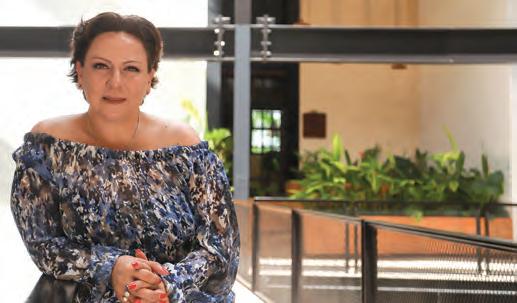
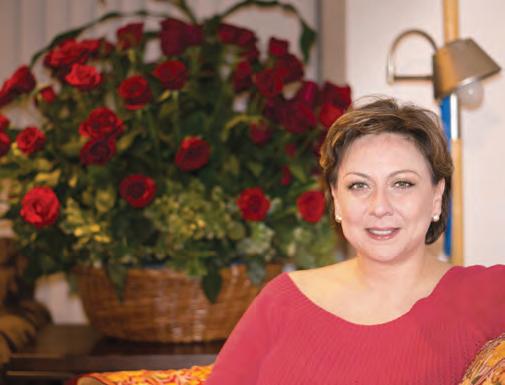
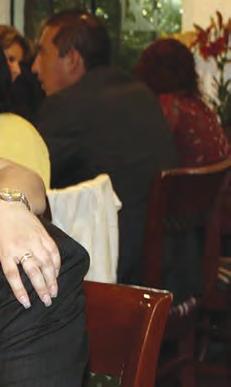
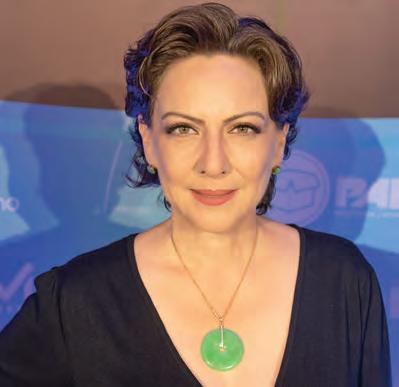
MY DAD was elected president of the WBC when I was one year old, so from my earliest memories, my world has been surrounded by incredible personalities and boxing events. When I was nine, I was in love with Sal Sánchez! He visited our house many times; he was a very affectionate and sensitive young man. The news of his passing was harrowing for me.
Even though the family dynamics revolved around boxing, my dad didn't like us women going to fights because he couldn't concentrate, worrying about us. But when my sister and I found out that JC Chávez was going to fight Macho Camacho in Las Vegas, we sat in his study for hours one night until we convinced him. It was my first live experience and by far the best.
Amid all the scandal and constant news in that world, my dad remained humble and in service to an-
yone who needed him. In fact, following his mother's teaching, he set out to do a good deed every day.
I remember one night he called me worried because he hadn't helped anyone that day, and while I was thinking about what I could do, he sat down at his computer to read emails and found a solution. Right then, he picked up the phone to call a friend and immediately helped secure a job for the son of the person who had emailed him. That's how he was: all about service and love for anyone who approached him.
Today, I proudly cherish the image of the incredible human being he was and how blessed I am to have had him as my father. He lives on in my heart, and I'm sure he accompanies and advises me every day.
"My dad had an impressive capacity, a vision, and a special sensitivity. I always say he was from another planet".
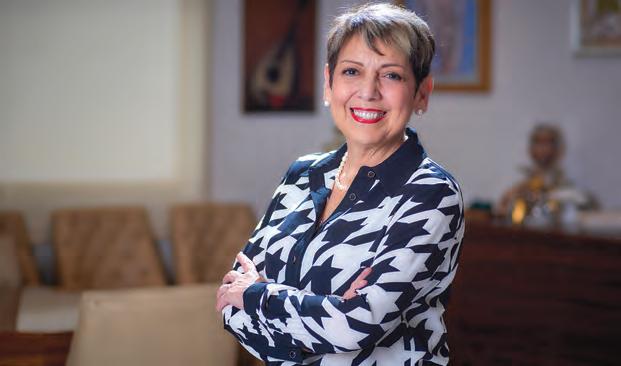
De su madre aprendió a ser una gran anfitriona, de su padre el amor por servir a los demás y es por eso por lo que desde muy pequeña, Lucila se vio involucrada en el mundo del boxeo, siendo, junto con su madre, la gran anfitriona de los banquetes que, Don
José Sulaimán Chagnón ofrecía a los boxeadores, managers, empresarios y demás personalidades relacionadas con el pugilismo nacional e internacional.
CUANDO José Sulaimán se convirtió en Presidente del Consejo Mundial de Boxeo, Lucy, como le llaman amorosamente sus familiares, tenía solo 13 años, siendo para ella “una experiencia inolvidable. A partir de ese momento, todos los años que hemos vivido y hemos sido parte de la familia del Consejo Mundial de Boxeo, han sido maravillosos. El boxeo está en nuestra piel, crecimos desayunando, comiendo y cenando boxeo y fue maravilloso ver desfilar a tantas personalidades en casa”.
Los boxeadores, “nosotros decimos que son como nuestros hermanos. Mi papá los quería tanto y los cuidaba tanto, ahora a Mauricio le toca hacer lo mismo y lo está haciendo maravilloso; a pesar de estar innovando, todo lo hace con el mismo cariño con que lo hacía mi papá”.
Lucy, la muñequita de José Sulaimán, recuerda a su padre como un hombre sumamente cariñoso y respetuoso, pero sobre todo, apasionado del boxeo. “Las luchas de mi papá, desde que nosotros tenemos memoria, están relacionadas con proteger a los boxeadores, cómo cuidarlos, cómo ver por esos seres humanos que se están partiendo el lomo por hacer algo en la vida y por tener algo para ellos. El cuidaba a la gente, atendía a la gente y nosotros aprendimos a hacerlo igual, pero no de una manera obligada, sino como algo natural”.
Además del boxeo, José Sulaimán Chagnón tenía otra gran pasión: el beisbol. “A mi papi le encantaba el beisbol, era su pasión porque él fue muy buen beisbolista de joven. Entonces también, de niños, mis
hermanos hicieron béisbol. Mi papi y mi mami hicieron una familia muy unida, somos seis hermanos y siempre nos vemos, estamos pendientes de todos y esa es la mejor herencia que nos pudo haber dejado”.
Dentro de los recuerdos que Lucy tiene, está el hecho de un día llegar a casa de sus padres, con su hijo mayor y encontrarse con Mohammed Alí, quien tomó a su hijo en brazos, dejando “al muchachito mudo, le empezó a acariciar la cara. Él estaba encantado en los brazos de ese hombre. Ese fue un gran recuerdo; el boxeo era la vida de mi papá y pasó a ser nuestra vida”.
Otra anécdota “que recuerdo mucho fue una pelea de Julio César Chávez vs el “Macho” Camacho; mi papá casi nunca nos llevaba al boxeo porque no podía estar atendiéndonos, pero en esa ocasión lo obligamos a que nos llevara. Mi hermana Claudia, que es más arrebatada que yo, por ahí del tercer round comenzó a gritarle al “Macho” y pues yo comencé también; mi papá que era muy decente al escuchar los gritos volteó y nos vio y nos mandó callar. Fue muy gracioso para nosotras, pero él estaba muy avergonzado”.
“Yo era muy cariñosa con mi papá y siempre me esperaba en la escalera para que cuándo él llegara, yo lo abrazaba y le decía que era mi muñeco”.Lilian Reyes Berriel Roberto tetlalmatzin Luis E. González Traducción: Mariana Torres
From her mother, she learned to be a gracious hostess, from her father, the love of serving others. That's why Lucila became involved in boxing from a very young age. Alongside her mother, she became the gracious hostess of the banquets Don José Sulaimán Chagnón organized for boxers, managers, entrepreneurs, and other personalities linked to national and international boxing.

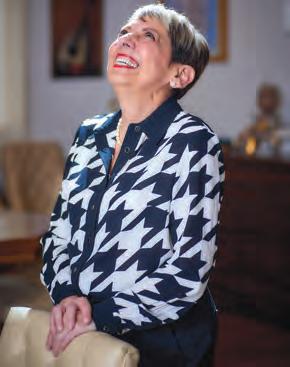
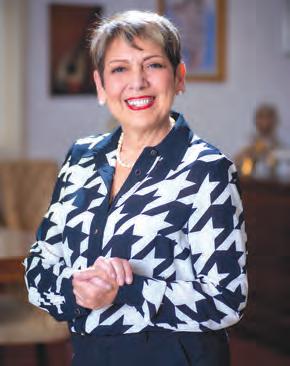
WHEN José Sulaimán became President of the World Boxing Council (WBC), Lucy, as her relatives affectionately call her, was just 13 years old. This marked an "unforgettable experience. Since then, all the years we've lived and been part of the WBC family have been marvelous. Boxing is in our blood. We grew up with boxing as our breakfast, lunch, and dinner. It was wonderful to see so many personalities parading through our home".
The boxers, "we say they are like our brothers. My dad loved them so much and took care of them so much. Now, Mauricio is doing the same thing wonderfully. Despite innovating, he does everything with the same love that my dad had".
Lucy, José Sulaimán's little doll, remembers her father as a highly affectionate and respectful man, but above all, passionate about boxing. "My dad's battles, as far as we can remember, were related to protecting the boxers, looking after them, how to care for these human beings who are working hard to achieve something in life and for themselves. He took care of people, help them, and we learned to do the same, not in a mandatory way, but naturally".
In addition to boxing, José Sulaimán Chagnón had another great
passion: baseball. "My dad loved baseball; it was his passion because he was a great baseball player when he was young. So, as kids, my siblings played baseball. My dad and mom created a very united family. We are six siblings, and we always see each other, we take care of each other, and that's the best inheritance he could have left us".
Among the memories that Lucy treasures is the day she arrived at her parent's house with her eldest son and found Muhammad Ali, who picked up her son and left "the young boy speechless. Ali started caressing his face. He was enchanted in the arms of that man. That was a great memory; boxing was my dad's life and became our life".
Another anecdote "that I remember a lot was a fight between Julio César Chávez and "Macho" Camacho. My dad rarely took us to boxing matches because he couldn't be tending to us, but we forced him to take us on that occasion. My sister Claudia, who is more fiery than I am, started shouting at "Macho" around the third round, and I joined in too. My very proper dad turned around upon hearing the shouts, saw us, and told us to be quiet. It was very amusing for us, but he was quite embarrassed".
"I was very sweet with my dad and always waited for him on the stairs. When he arrived, I would hug him and tell him he was my doll".
Desde que tiene uso de memoria, el boxeo ha sido parte de su vida, el que fuera cargado en brazos por Raúl “Ratón” Macías o en la sala de su casa tuviera a personalidades como Julio César Chávez o Mike Tyson han sido sucesos de lo más común para Pepe Sulaimán, quien se dice bendecido y afortunado de poder continuar con el legado de su padre, Don José Sulaimán Chagnón.
“YO NACÍ en el boxeo y toda la vida he tenido relación con este maravilloso deporte, pero una relación directa con el trabajo de oficina nunca tuve hasta hace nueve años que me fui a vivir a Los Ángeles porque para Mauricio era importante tener presencia en esa ciudad que es considerada la capital del boxeo en el mundo”, explicó Pepe Sulaimán.
Agregó que, “yo inauguré la oficina en Los Ángeles y mi función principalmente era hacer cuestiones de video, de comunicación, de redes sociales, además de ser el representante del Consejo en conferencias de prensa, en pesajes; por supuesto fui supervisor varias veces, a la par de llevar a cabo varios eventos de caridad con jóvenes y niños”.
Para Pepe Sulaimán uno de los más importantes legados que dejó su padre para el boxeo fue la empatía y protección hacia los pugilistas. “Mi papá se dedicó a proteger a los boxeadores, a veces
de ellos mismos, porque en ocasiones ellos son los que se aventuraban a seguir peleando cuando ya no podían; él se dedicó a mejorar la calidad de vida de los boxeadores sin perder el interés en el deporte”. Entonces “eso es algo que nosotros aprendimos de él y con él y que tratamos de seguir, ya que, aunque parece que ya no hay nada más que hacer, siempre hay algo que podemos mejorar. El Consejo es la única organización que ha hecho reglas, las reglas del boxeo moderno son reglas del Consejo Mundial de Boxeo y que afortunadamente, todos han adoptado”. Pepe Sulaimán, desde siempre, ha sido el genio creativo del Consejo Mundial de Boxeo. “En 1982 o 1983 hice un audiovisual para el Museo de Arte Moderno del escultor Luis Ortiz Monasterio, mi papá lo vio y me pidió que hiciera en audiovisual su siguiente informe para la Convención. Entonces empecé a hacerlo primero a través de proyectar transparencias con la narración y música, hasta ahora que los hago en video”.
Para Pepe Sulaimán, pese a que el boxeo está viviendo una época de nuevas glorias, el tiempo de antaño era mejor, “más instintivo, más crudo, más enfocado en el deporte y en la disciplina y más alejado del espectáculo”.
Además, para Pepe Sulaimán, el Consejo Mundial del Boxeo significa “la salvación del deporte, antes todo mundo abusaba de los boxeadores, nadie los atendía, ni los protegía, si salían lastimados después de una pelea nadie los atendía y tenían que ver quién los llevaba al doctor. Con la llegada de José Sulaimán al Consejo las cosas cambiaron, se dignificó a los boxeadores; mi papá siempre dijo ‘yo voy a estar con los boxeadores antes, durante y después’ y siempre lo cumplió, prueba de ello es que instituyó que los boxeadores tengan pensión para su retiro y que tengan una vida digna”.
Para concluir, Pepe Sulaimán afirmó que “ser hijo de José Sulaimán es y será un privilegio. Mi papá nos dejó grandes enseñanzas, pero la mayor fue la humildad, el nunca ver a nadie para arriba y mucho menos para abajo, todos somos iguales. Siempre nos enseñó que el que no vive para servir, no sirve para vivir”.
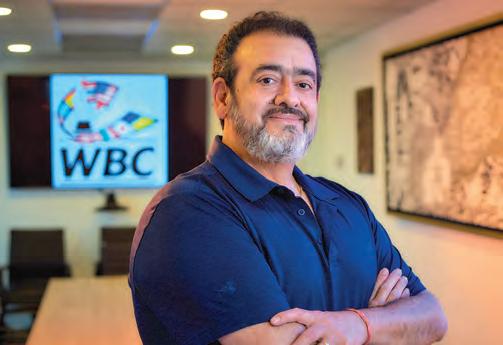
“El box de antaño era más instintivo, más crudo, más enfocado en el deporte y en la disciplina y más alejado del espectáculo”.
Boxing has been a part of his life for as long as he can remember. Being carried in the arms of Raúl "Ratón" Macías or having personalities like Julio César Chávez or Mike Tyson in his living room have been everyday occurrences for Pepe Sulaimán. He considers himself blessed and fortunate to carry on his father's legacy, Don José Sulaimán Chagnón.
"I WAS BORN into boxing, and I've always had a connection with this wonderful sport. However, I never had a direct office job until nine years ago when I moved to Los Angeles. It was important for Mauricio to have a presence in the city known as the world's boxing capital", explained Pepe Sulaimán.
He added, "I established the office in Los Angeles, and my primary role was to handle video, communication, social media, and to represent the Council at press conferences and weigh-ins. I also acted as a supervisor multiple times, all while organizing various charity events for youth and children".
One of the most significant legacies Pepe Sulaimán's father left for boxing was empathy and protection for boxers. "My father dedicated himself to safeguarding boxers, sometimes from themselves, as they often continued fighting even when they shouldn't. He devoted his life to improving boxers' quality of life while maintaining an interest in the sport".
"So, that's something we learned from and with him, something we strive to continue. Even though it might seem like there's nothing left to do, there's always room for improvement. The Council is the only organization that established rules. The rules of modern boxing are the rules of the World Boxing Council, and fortunately, everyone has adopted them".
Pepe Sulaimán has always been the creative genius behind the World Boxing Council. "In 1982 or 1983, I created an audiovisual for the Museum of Modern Art featuring sculptor Luis Ortiz Monasterio. My father saw it and asked me to produce his upcoming Convention report using the same method. I started by projecting slides with narration and music, and now I create them as videos".
For Pepe Sulaimán, even though boxing is experiencing a new era of glory, the past was better, "more instinctive, rawer, more focused on the sport and discipline, and further removed from showmanship”.
Moreover, to Pepe Sulaimán, the World Boxing Council represents "the sport's salvation. In the past, everyone took advantage of boxers; no one cared for or protected them. If they got hurt after a fight, no one attended to them, and they had to figure out who would take them to the doctor. When José Sulaimán came to the Council, things changed; he dignified boxers. My father said, 'I will be with the boxers before, during, and after,' and always fulfilled that promise. He established pensions for boxers upon retirement and ensured their dignified lives".
Pepe Sulaimán affirmed, "Being José Sulaimán's son is and will always be a privilege. My father left us with great lessons, but the most significant was humility. He never looked up to anyone and certainly never looked down on anyone. We are all equals. He taught us that if your purpose is not to serve, it serves no purpose".
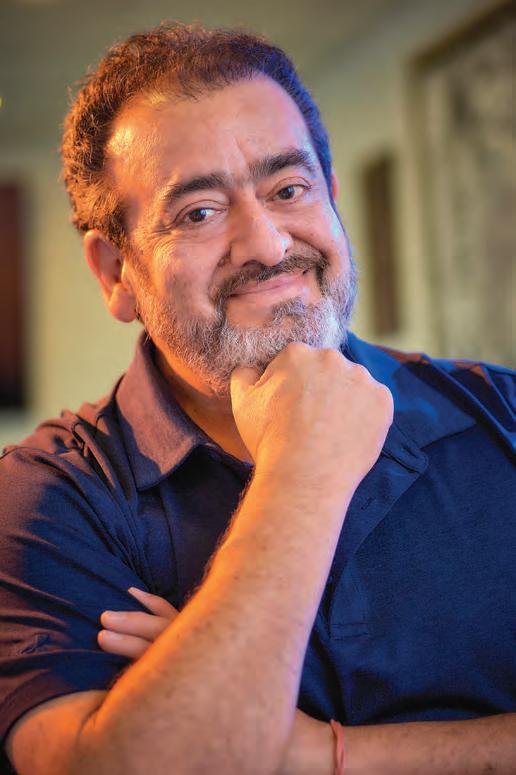
"The boxing of yesteryear was more instinctive, rawer, more focused on the sport and discipline, and further removed from showmanship".

Jaime Higuera Mariñelarena
Cortesía Carlos Cuevas
Traducción: Mariana Torres
El boxeo, como lo conocemos actualmente y sobre todo un organismo del prestigio internacional como el Consejo Mundial de Boxeo, no se entendería sin la participación, la dedicación, la pasión y el trabajo de la familia Sulaimán.
DESDE QUE FUE nombrado la cabeza del WBC, José Sulaimán trabajaría hasta el último de sus días para que el deporte fuera mucho más seguro para los atletas que lo llevan a cabo y también para que fuera una disciplina profesional con reglas claras y justas para todos sus integrantes, no importando su relevancia.
Fernando Sulaimán, hijo de Don José, describe que su papá se encontraba trabajando todo el día para cumplir adecuadamente sus funciones y aun en las noches era común que recibiera llamadas de varias partes del mundo para resolver asuntos importantes de los diferentes asociados al Consejo.
“Fue un hombre incansable, todos sus esfuerzos los dedico a implementar reglamentos para el beneficio de los atletas. Gracias a él, inició una investigación exhaustiva de los efectos de los golpes en los boxeadores. Este conocimiento ha sido traslada-
do a otros deportes como el hockey, entre otras disciplinas, para buscar mitigar los daños que sufren las personas al desempeñarse continuamente en deportes de contacto”, explicó acerca de la labor desempeñada por su padre.
Este es un legado que desde 2014 ha estado principalmente encargado a su hijo Mauricio, pero toda la familia Sulaimán ha llegado a desempeñar diferentes funciones al frente de una de las organizaciones más importante del deporte, el Consejo Mundial de Boxeo.
Fernando, al igual que su hermano, siempre ha estado colaborando con la organización, a pesar de que él no ostenta un cargo oficial en el organismo.
“Siempre he estado pegado al WBC, desde 1975 que eligieron a mi papá, es un compromiso que ha tomado la familia de unirse a los deportistas y a todos los involucrados”, declaró acerca de la filosofía que siguen los hijos de José Sulaimán.
En la administración de José Sulaimán se tomaron medidas en pro de los boxeadores como:
• Reducción de rounds de 15 a 12
• Aumento de cuerdas a 4
• Ceremonia de pesaje 24 horas antes
• Creación del Consejo Médico Mundial
• Guantes especiales con el pulgar de la mano integrado
• Programas de investigación de la UCLA para lesiones cerebrales
• Creación de divisiones intermedias
Comentó también que para todos ellos era bastante común la convivencia con figuras emblemáticas del boxeo y que en algunos casos incluso llegaron a vivir con varios atletas que necesitaban un lugar donde poder estar.
Es así que la familia Sulaimán ha dejado un legado permanente en el boxeo, así como sus principales figuras, sus aportaciones han ayudado al profesionalismo del deporte y a cuidar la vida de sus integrantes durante y posteriormente a su desarrollo profesional.
Boxing, as we know it today, and especially a prestigious international organization like the World Boxing Council (WBC), wouldn't be what it is without the participation, dedication, passion, and work of the Sulaimán family.
SINCE BEING appointed the head of the WBC, José Sulaimán worked tirelessly until his last days to make the sport safer for the athletes who participated and to ensure that it became a professional discipline with transparent and fair rules for all its members, regardless of their significance.
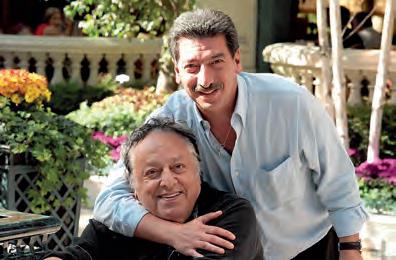
Fernando Sulaimán shares how his father, Don José, dedicated himself to his work with tireless efforts day and night. He even made himself available to take calls from across the globe to address vital Council matters. His father put in a lot of hard work and dedication to his role.
"He was a tireless man, dedicating all his efforts to implementing regulations for the benefit of the athletes. Thanks to him, an in-depth study of the effects of blows on boxers was initiated. This knowledge has been transferred to other sports like hockey and other disciplines to mitigate the damages suffered by individuals engaging in continuous contact sports", he explained about his father's work.
It's been quite a responsibility for Mauricio Sulaimán ever since 2014, being entrusted with this legacy. Nevertheless, the entire Sulaimán family
has pitched in with various roles to steer the WBC, one of the most significant organizations in sports.
Despite not holding an official position, Fernando has always been actively involved in the organization, just like his brother.
“I've always been closely connected to the WBC. Since 1975, when they chose my father, it's been a commitment that the family has made to join the athletes and everyone involved", he declared regarding the philosophy followed by José Sulaimán's children.
He also mentioned that it was standard for them to interact with iconic boxing figures; sometimes, they even lived with several athletes who needed a place to stay.
The Sulaimán family's dedication to boxing has left a profound and enduring legacy. Their tireless efforts to promote safety and professionalism have significantly impacted the lives of those who pursue this sport, both during their careers and beyond.
Under José Sulaimán's administration, measures were taken in favor of boxers such as:
Reduction of rounds from 15 to 12
• Increase in ropes to 4
• Weigh-in ceremony 24 hours before the fight
• Creation of the World Medical Council
• Special gloves with integrated thumb
• UCLA research programs for brain injuries
• Creation of intermediate divisions
“Llegábamos de la escuela a comer y nos encontrábamos con que Muhammad Ali estaba sentado en la mesa. Nos tocó compartir mucho tiempo con Don King, ‘Mantequilla’ Nápoles, el Ratón Macías entre muchos otros. Nosotros siempre buscamos que se sintieran en casa y a todos se les trataba como si fueran de la familia”, detalló.
"We'd come home from school and find Muhammad Ali sitting at the table. We spent much time with Don King, ‘Mantequilla’ Nápoles, Ratón Macías, among many others. We always aimed to make them feel at home, treating everyone as family", he detailed.
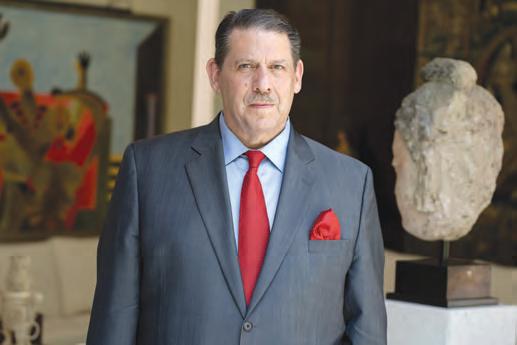
La pasión es el factor absoluto que ha llevado a Héctor Sulaimán a cumplir todas sus metas; digno heredero del apellido Sulaimán, para Héctor, los obstáculos no existen, siempre se debe tener en la mira el éxito y la ayuda a los demás.
Asimismo, como parte del cuidado para los boxeadores, se “propuso cambiar de 15 a 12 los rounds, lo cual para los medios de comunicación fue un ataque brutal porque eran 3 minutos menos de descanso, que, para temas de publicidad significaba mucho dinero”.
• Combates de 15 a 12 rounds, medida que fue avalado por la Junta de Gobierno del Consejo Mundial de Boxeo.
• Pesaje 24 horas de las peleas lo que beneficia a la recuperación del peleador.
• Más campeones y más oportunidades gracias al aval del Consejo Mundial de Boxeo.
• Se hizo obligatorio que el dedo pulgar del guante estuviera adherido para evitar lesiones en los ojos del contrario.
MI PADRE FUE un hombre triunfador, un trotamundos que rompió fronteras y que dejó un legado de cambio y bienestar para el boxeo. Él era un apasionado de todos los deportes, incluso fue seleccionado a los Juegos Panamericanos formando parte del equipo de beisbol; pero el boxeo fue su vida y es por ello por lo que llevó al Consejo Mundial de Boxeo a ser uno de los tres organismos más importantes del mundo”, explicó el también licenciado en Derecho y Administración de Empresas.
Para Héctor Sulaimán, el Consejo Mundial de Boxeo ha humanizado al pugilismo no solo nacional sino internacional. “Anteriormente las reglas eran muy pocas, no había la cuenta de ocho para cuando se caían; antes había muchos lastimados, pero un año después de que mi papá fue nombrado Presidente, las cosas cambiaron y además de buscar cambios en las reglas, se creó un Comité Médico, cuya base principal estaba en la UCLA, en donde se destinó dinero para desarrollar programas de investigación para cuidar a los boxeadores, en especial el uso de diversos guantes y caretas, así como la hidratación que debían tener”.
Y aunque para muchos es desconocido, José Sulaimán fue el primero en institucionalizar el antidopaje en el boxeo, luego de que, en uno de sus viajes a Venezuela, “en una pelea, uno de los boxeadores estaba prácticamente noqueado y el round 14, después de beber ‘agua’ salió imparable. Mi papá fue y tomó esa botella y llegando a México la mandó analizar y resultó que tenía algún tipo de estimulante”.
Más allá de los golpes
Además, “fundó el WBC Cares, el cual es un programa en el que figuras del deporte apoyan a niños de escasos recursos o con enfermedades terminales, lo cual también ayudaba a los a exboxeadores a mantenerse vigentes y lograr nuevas oportunidades de trabajo”.
Para muchos, el boxeo es un deporte violento lejos de toda hermandad, por ello, para Héctor Sulaimán, el reto más grande que enfrentan desde el WBC es “convencer a la gente de que más allá de la parte deportiva, hay una parte humanitaria importantísima, en la que se vela por el futuro de los pugilistas para que al final de sus días de gloria tengan una vida digna”, concluyó.
• Puntuación abierta, el anuncio de las tarjetas de los jueces tras el cuarto y octavo asalto.
• Creación del WBC Cares, programa en el que figuras del deporte se dedicaban a apoyar a niños de escasos recursos o con enfermedades terminales.
• Creación de la Fundación José Sulaimán que ofrece sustento a boxeadores de todo el mundo, ya sea por lesiones o por miseria.
• Creación del Comité Médico, cuya base principal estaba en la UCLA, en donde se desarrollan programas de investigación para cuidar a los boxeadores.
Héctor Sulaimán Vicepresidente vitaliciodel Consejo Mundial de Boxeo Egresado de la carrera de Administración de Empresas por el ITESM y Licenciado en Derecho por la Universidad Iberoamericana, con Posgrado en Gobierno en Harvard University.
Passion is the absolute factor that has driven Héctor Sulaimán to achieve all his goals, a worthy heir to the Sulaimán name. For Héctor, obstacles don't exist; success and helping others should always be in sight.
“MY FATHER was a successful globetrotter who broke boundaries and left a legacy of change and well-being for boxing. He was passionate about all sports; he was even selected for the Pan American Games as part of the baseball team. But boxing was his life, and that's why he turned the World Boxing Council into one of the three most important organizations in the world", explained Héctor, who is also a Law and Business Administration graduate.
For Héctor Sulaimán, the World Boxing Council has humanized boxing, not only on a national level but also internationally. "Previously, there were very few rules; there was no count of eight when they were knocked down. Before, there were many injuries. But a year after my father was named President, things changed. Besides seeking rule changes, a Medical Committee was created, with its main base at UCLA, where money was assigned for research programs to care for boxers, especially regarding the use of different gloves and headgear, as well as proper hydration".
Also, as part of boxer care, "the proposal to change the rounds from 15 to 12 was made. This was met with fierce
opposition from the media because it meant 3 minutes less of rest, which meant less money in terms of advertising".
Although many may not know it, José Sulaimán was the first to institutionalize anti-doping in boxing. This came after, during one of his trips to Venezuela, "in a fight, one of the boxers was practically knocked out, and in round 14, after drinking 'water,' he came out unstoppable. My dad took that bottle and had it analyzed in Mexico, and it turned out to contain some stimulant".
Furthermore, "he founded WBC Cares, a program in which sports figures support underprivileged children or those with terminal illnesses. This also helped former boxers stay engaged and find new job opportunities".
For many, boxing is a violent sport, far from any sense of brotherhood. Therefore, for Héctor Sulaimán, the biggest challenge they face at the WBC is "convincing people that beyond the sports aspect, there's an essential humanitarian aspect, where we ensure the boxers' future so that at the end of their glory days, they have a dignified life", he concluded.
Héctor Sulaimán
Lifetime Vice President of the World Boxing Council Graduate in Business Administration from ITESM and a Law degree from the Universidad Iberoamericana, with a Postgraduate in Government from Harvard University.
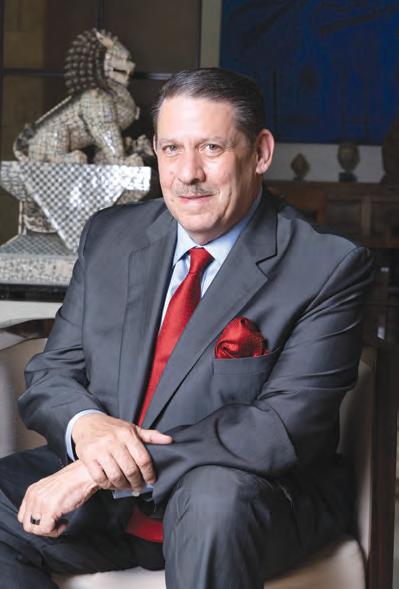
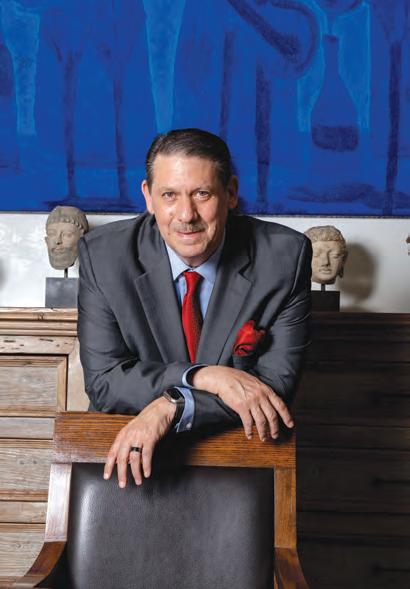
• Changed fights from 15 to 12 rounds, a measure endorsed by the World Boxing Council's Board of Governors.
• 24-hour weigh-ins for fights, benefiting the fighters' recovery.
• More champions and opportunities thanks to the World Boxing Council's endorsement.
• Made it mandatory for the glove's thumb to be attached to prevent eye injuries to the opponent.
• Open scoring judges' scorecards to be announced after the fourth and eighth rounds.
• Created WBC Cares, a program where sports figures dedicated themselves to supporting underprivileged children or those with terminal illnesses.
• Established the José Sulaimán Foundation, which supports boxers worldwide, whether due to injuries or poverty.
• Established the Medical Committee, primarily based at UCLA, where research programs are developed to care for boxers.
Redacción LM Cortesía
Luis E. GonzálezTraducción: Mariana Torres
DONALD KING, mejor conocido como “Don King” atribuye al boxeo la oportunidad de tener una segunda vida. Después de cumplir una condena de tres años por un accidente fatal que alteró su vida, este deporte llegó a su camino, brindándole una nueva perspectiva y una oportunidad de redención. “Fue Muhammad Ali mi inspiración y mi camino para poder limpiar mi nombre ante la sociedad de mi natal Cleveland en el estado de Ohio”.
El gobierno de su estado anunció que, debido a un recorte presupuestal, se vería obligado a cerrar el hospital civil que brindaba servicio a las personas de color. Esta grave situación generaría un riesgo para muchas vidas y dejaría a las personas sin esperanza, ante ello King hizo contacto con Ali. “Le propuse realizar una pelea para recaudar los fondos necesarios para mantener el hospital funcionando; así sucedió y juntos logramos salvar la operación del hospital”.
Al organizar dicho evento de boxeo, King descubrió su verdadera pasión. “El boxeo es el deporte más noble sobre la faz de la tierra, es uno en el que individuos que han sufrido de diversas maneras suben al ring con orgullo y coraje para demostrar supremacía”.
Don King es una figura icónica en el mundo del boxeo. Actualmente se ha establecido como uno de los promotores más influyentes y exitosos en la historia de este deporte. Su legado y contribución son innegables, convirtiéndolo en una figura influyente y reconocible para los aficionados del boxeo.
Sí de admiración se trata, para este gran promotor del pugilismo, Muhammad Ali solamente se puede comparar con José Sulaimán, a quien él llama “el otro gran hombre, el más grande dirigente de la historia del deporte mundial, no solamente del boxeo, de todos los deportes. Mi hermano, mi amigo, mi compañero de vida. José entendió los tiempos en los que se vivía y siempre lucho en contra de la discriminación y el abuso del poder. Como presidente del Consejo Mundial de Boxeo siempre me trató con respeto y con su gran visión preparo el mundo para la grandeza”.
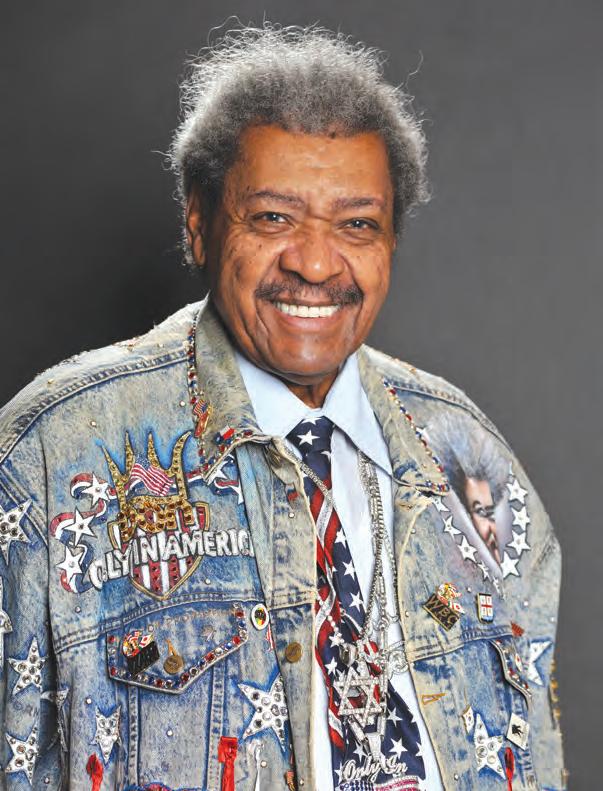
Como promotor de boxeo, Don King comentó que ha tenido la oportunidad de trabajar con miles de peleadores, desde novatos que llegan con un sueño y no logran avanzar, hasta los más grandes de la historia del boxeo mundial. “Tengo el gran placer y orgullo de ser el único promotor en la historia del boxeo. De haber pagado un millón de dólares o más a 125 boxeadores por una pelea. Poseo todos los récords imaginables y mis carteleras están en los libros de la historia con muchas páginas escritas con letras de oro”.
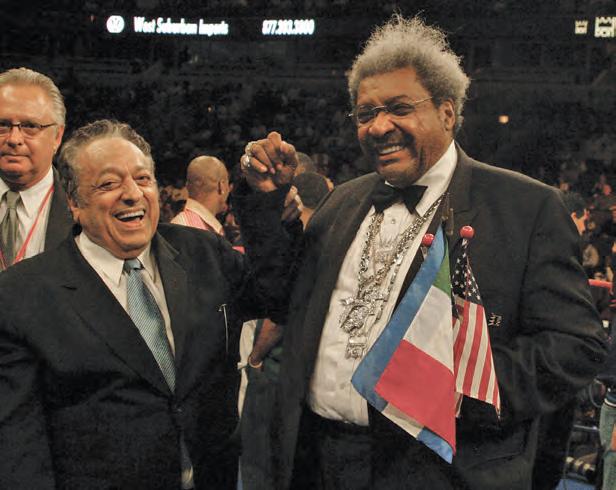
Grandes nombres como el de Muhammad Ali, George Foreman, Joe Frazier, Ken Norton, Larry Holmes, Mike Tyson, Evander Holyfield, entre otros más son a los que él denomina ‘mastodontes de la división madre del boxeo’.
“Sugar Ray Leonard, Roberto Durán, Julián Jackson, Terry Norris y decenas más en las divisiones medianas, Chiquita González, Michael Carbajal y Ricardo López en las divisiones pequeñas y absolutamente si, si, si … Julio César Chávez, el más grande de la historia, recorrió los rings del mundo a mi lado”.
Don King is an iconic figure in the world of boxing. He has established himself as one of the most influential and successful promoters in the sport's history. His legacy and contribution undeniable, making him a compelling and recognizable figure for boxing enthusiasts.
DON KING is an iconic figure in the world of boxing. He has established himself as one of the most influential and successful promoters in the sport's history. His legacy and contribution to the sport are undeniable, making him a compelling and recognizable figure for boxing enthusiasts.

Donald King, better known as "Don King", credits boxing with giving him a second chance at life. After serving a three-year sentence for a fatal accident that changed his life, boxing crossed his path, providing him with a new perspective and an opportunity for redemption. "It was Muhammad Ali who inspired me and paved the way for me to clear my name in the eyes of society in my hometown of Cleveland, Ohio".
When his state's government announced that budget cuts would force them to close the civil hospital that served people of color, Don King saw a problematic situation that would put many lives at risk and leave people without hope. To address this, he contacted Ali. "I proposed organizing a fight to raise the funds needed to keep the hospital running, and it happened. Together, we saved the hospital".
Organizing that boxing event revealed his true passion. "Boxing is the noblest sport on the face of the earth. It's a sport where individuals who have suffered in various ways step into the ring with pride and courage to demonstrate supremacy".
This exceptional boxing promoter can only compare Muhammad Ali to José Sulaimán, whom he calls "The other great man, the greatest leader in the history of world sports, not only in boxing but all sports: my brother, my friend, my lifelong companion.

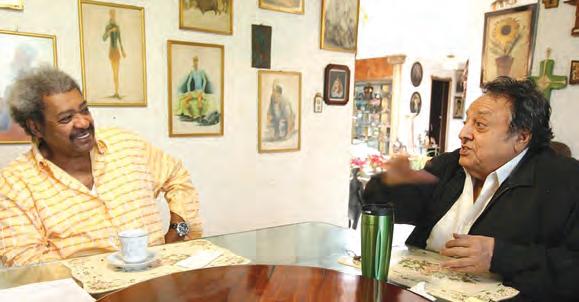
Incluso cincuenta años después de suceder, continúan siendo reconocidas como los eventos más importantes en la historia del deporte:
• TheRumbleintheJungle – En el corazón de África, en Zaire, ahora conocido como la República Democrática del Congo, tuvo lugar una de las peleas más trascendentales en la historia del boxeo. George Foreman, reconocido campeón mundial de peso completo y considerado invencible debido a sus impresionantes victorias sobre Frazier y Norton, quienes habían derrotado a Ali previamente, le brindó una oportunidad a Muhammad Ali, quien en ese momento se pensaba que había perdido su mejor forma. Sin embargo, Ali sorprendió a todos al noquear a Foreman en tan solo ocho rounds”.
• TheThrillainManila–“Fue en la capital de Filipinas, donde logré promover la tercera pelea entre Muhammad Ali y Joe Frazier. Una de las peleas más salvajes, ambos peleadores exhaustos fueron a sus esquinas al descanso después de 13 asaltos. Ali dijo a su esquina, ‘no puedo más, siento morir’ y su entrenador le dijo, ‘Muhammad, solamente párate al sonar la campana, yo detendré el combate, pero no te humilles quedándote sentado’. Así sucedió, solo la campana, Ali se incorporó para la gran sorpresa de mirar a la esquina de Frazier deteniendo el combate, Frazier ya no salió y Ali ganó”.
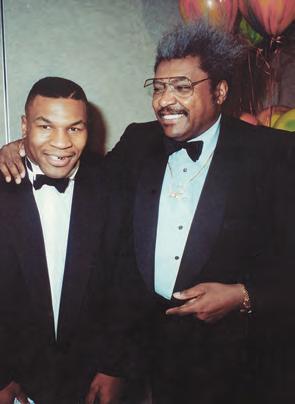
• PokerdeAses–“Julio César Chávez llenando el estadio Azteca en 1993. Una promoción memorable que me hace sentir vivo cada vez que pienso en ese día. El gran campeón mexicano frente a 136, 346 personas”.
Promover el boxeo es considerado un privilegio para quienes se dedican a esta labor. Para Don King, la clave del éxito ha sido siempre trabajar arduamente, más que cualquier otro, tratando a los peleadores con dignidad y buscando constantemente formas de generar la mayor cantidad de dinero posible para asegurar su futuro. “El glamour y los lujos llaman la atención, los sueños se construyen y debes de sentir y actuar como el mejor, nadie es mejor que tú”.
Don King ha sido sometida a terribles actos de discriminación y abuso de poder, enfrentando acusaciones, ridiculización, provocaciones y ataques. A pesar de ello, nunca
se ha considerado como una víctima, ya que nadie ha logrado derrotarlo. Su historia y legado se mantienen intactos, siendo considerado el mejor en la historia. Nadie ha logrado doblegarlo debido a su integridad, lealtad y perseverancia.
“He sido muy afortunado de recorrer el mundo y ser reconocido por reyes y ministros, así como por la gente el pueblo. Amo la vida, disfruto cada segundo de mi vida, me gusta servir a los demás y lograr los sueños de quien confía en mí. Don King pertenece a la gente, trabaja por la gente y para la gente…. Viva México y recuerden OnlyinAmerica”, finalizó.
Even fifty years later, they are still recognized as the most significant events in the history of the sport:
• TheRumbleintheJungle
– In the heart of Africa, in Zaire, now known as the Democratic Republic of Congo, one of the most momentous fights in boxing history occurred. George Foreman, the renowned heavyweight world champion and considered invincible due to his impressive victories over Frazier and Norton, who had previously defeated Ali, gave Muhammad Ali a chance. Ali was considered past his prime then, but he surprised everyone by knocking out Foreman in just eight rounds.
• TheThrillainManila–"It was in the capital of the Philippines where I promoted the third fight between Muhammad Ali and Joe Frazier. In one of the wildest fights, both exhausted fighters went to their corners after 13 rounds. Ali said to his corner, 'I can't go on. I feel like I'm dying', and his trainer told him, 'Muhammad, stand up when the bell rings. I'll stop the fight, but don't humiliate yourself by staying seated'. That happened; just as the bell rang, Ali was surprised to see Frazier's corner stopping the fight. Frazier didn't come out, and Ali won".
• PokerdeAses(Aces' Poker)–"Julio César
Chávez filling the Azteca Stadium in 1993. A memorable promotion that makes me feel alive every time I think about that day. The outstanding Mexican champion against 136,346 people".
José understood the times he lived in and always fought against discrimination and abuse of power. As the World Boxing Council president, he always treated me with respect and, with his great vision, prepared the world for greatness".
As a boxing promoter, Don King mentioned that he has worked with thousands of fighters, from aspiring novices who never make it to the top to the greatest names in the history of world boxing. "I take great pleasure and pride in being the only promoter in the history of boxing to have paid one million dollars or more to 125 fighters for a single fight. I hold all imaginable records, and my fight cards are written in the history books with golden letters".
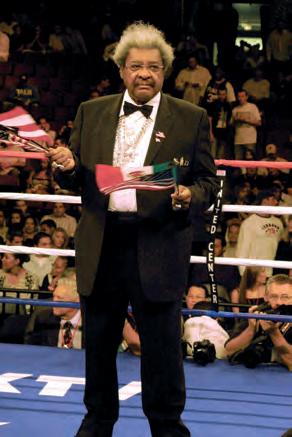
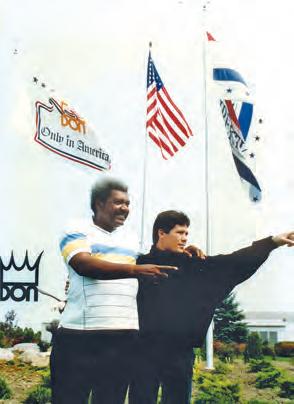
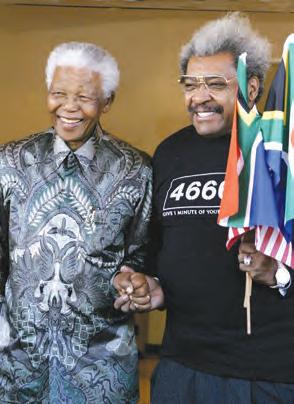
Great names like Muhammad Ali, George Foreman, Joe Frazier, Ken Norton, Larry Holmes, Mike Tyson, Evander Holyfield, and many more are the "mastodons of the heavyweight division", according to him. "Sugar Ray Leonard, Roberto Durán, Julián Jackson, Terry Norris, and dozens more in the middleweight divisions; Chiquita González, Michael Carbajal, and Ricardo López in the lower divisions; and absolutely, yes, yes, yes... Julio César Chávez, the greatest in history, traveled the world's rings by my side".
Promoting boxing is a privilege for those who dedicate themselves to this profession. For Don King, the key to success has always been hard work, treating fighters with dignity, and constantly seeking ways to generate as much money as possible to secure their future. "Glamour and luxury may catch the eye, you build dreams, and you must feel and act like the best—no one is better than you".
Don King has faced terrible acts of discrimination and abuse of power, enduring accusations, ridicule, provocation, and attacks. Nevertheless, he has never seen himself as a victim because no one has been able to defeat him. His story and legacy remain intact, and he is considered the best in history. No one has been able to break him due to his integrity, loyalty, and perseverance.
"I have been fortunate to travel the world and be recognized by kings, ministers, and everyday people. I love life; I enjoy every second of it; I like serving others and fulfilling the dreams of those who trust me. Don King belongs to the people; I work for the people and with the people... Viva México, and remember, Only in America", he concluded.
BOB HA promocionado muchas de las grandes peleas en la historia del boxeo, desde Muhammad Ali hasta Manny Pacquiao, grandes campeones como Marvelous Marvin Hagler, Tommy Hearns, George Foreman, Sugar Ray Leonard, Floyd Mayweather, Carlos Monzón, Julio César Chávez, Roberto “Manos de Piedra” Durán, Erik Morales y Terence Crawford, solo por mencionar algunos.
Todo gran peleador, ha llegado a serlo por la calidad de sus rivales, en el caso de Bob Arum no es diferente, ha tenido casi toda su trayectoria enfrente y en competencia al histórico promotor Don King, con quien, en ocasiones ha rivalizado y en otras ha co-promovido, de hecho, después de más de ocho años de no haber coincidido, ambos llevaron a cabo la histórica pelea número 2000 de título para el Consejo Mundial de Boxeo en el Madison Square Garden entre José Carlos Ramírez y Amir Imam.
Comenzó su camino después de graduarse como abogado en la Universidad de Harvard, trabajando para el Departamento de Justicia de los Estados Unidos. Su primer contacto con el boxeo fue en 1962, durante el proceso de la pelea entre Sony Liston y Floyd Patterson en el que estaba auditando los números de tal evento y ahí se dio cuenta de el gran negocio que puede ser este deporte. Algunos años después, Jim Brown, estrella de la NFL, le presentó a Muhammad Ali y fue entonces que decidió convertirse en promotor de boxeo, más tarde decidió fundar la promotora Top Rank, con la que ha hecho historia, su primera pelea de título mundial fue Muhammad Ali vs George Chuvalo por el cinturón Verde y Oro de los completos.
Bob Arum siempre ha tenido un gran equipo de colaboradores en su empresa, en particular sus matchmakers quienes han sido genios para lograr llevar de manera genial las carreras de sus campeones , Bruce Trampler y Brad Goodman son parte muy importante de Top Rank, al igual Carl Moretti, Brad Jacobs y Jeremy Koegler bajo el liderazgo de Todd Duboef .
En números, Top Rank ha producido más de 9,000 peleas, más de 2000 eventos en más de 22 países. Siempre buscando innovar, creó grandes series de boxeo en cadenas tan importantes como ESPN, HBO, Univisión. Eventos como Muhammad Ali vs Joe Frazier II, George Foreman vs Ken Norton en Venezuela, Sugar Ray
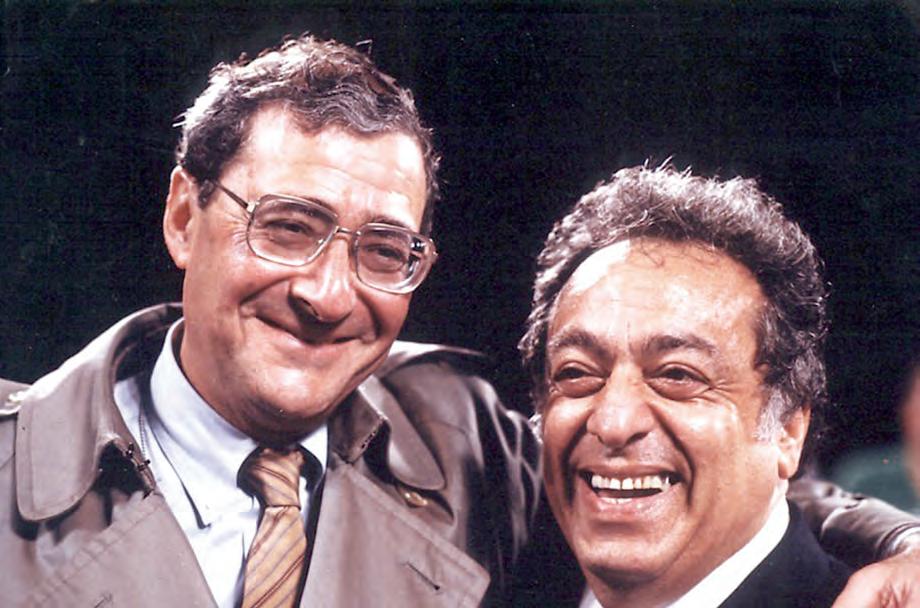
Leonard vs Marvin Hagler, Óscar de la Hoya vs Fernando Vargas, las 3 peleas entre Manny Pacquiao vs Erik Morales, Pacquiao vs Juan Manuel Márquez, La pelea del Siglo Floyd Mayweather vs Manny Pacquiao y así como todo buen promotor se aventuró a organizar el famoso salto de Evel Knievel en Snake River Canyon.
Bob Arum siempre ha buscado innovar, ha participado activamente en nuevas tecnologías y durante un momento muy complicado para el boxeo y el mundo, Top Rank creó la “burbuja” en Las Vegas, siguiendo los protocolos establecidos por el WBC para lograr continuar con la actividad boxística aún durante esta época.
1931 fue un año importantísimo para el boxeo mundial ya que, tres de los actores más importantes para el boxeo mundial nacieron, Don José Sulaimán, Don King y Bob Arum.
BOB HAS been essential in promoting some of history's most legendary boxing matches. He has had the pleasure of working alongside iconic champions such as Marvelous Marvin Hagler, Tommy Hearns, George Foreman, Sugar Ray Leonard, Floyd Mayweather, Carlos Monzón, Julio César Chávez, Roberto "Hands of Stone" Durán, Erik Morales, and Terence Crawford, as well as legends like Muhammad Ali and Manny Pacquiao. This is just a glimpse of the numerous notable fighters he has had the opportunity to collaborate with over the years.
Every great fighter owes their status to the quality of their opponents. In the case of Bob Arum, it's no different. Throughout his career, he faced and competed against the historic promoter Don King. They have sometimes been rivals and other times co-promoters. In fact, after more than eight years without collaboration,
His journey began after graduating as a lawyer from Harvard University, where he worked for the United States Department of Justice. His first encounter with boxing was in 1962 during the Sonny Liston vs. Floyd Patterson fight, where he audited the numbers for the event. Here, he realized this sport's immense potential as a lucrative business. A few years later, NFL star Jim Brown introduced him to Muhammad Ali, which led him to become a boxing promoter. He later founded the promotional company Top Rank, with which he has made history. His first world title fight was Muhammad Ali vs. George Chuvalo for the Green and Gold heavyweight belt.
they came together to organize the historic 2,000th title fight for the World Boxing Council at Madison Square Garden between José Carlos Ramírez and Amir Imam.
Bob Arum has always had an exceptional team of collaborators within his company, particularly his matchmakers, who have been instrumental in managing the careers of Top Rank's champions. Bruce Trampler and Brad Goodman are vital parts of Top Rank, along with Carl Moretti, Brad Jacobs, and Jeremy Koegler, under the leadership of Todd Duboef.
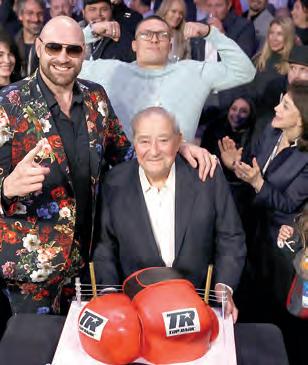
In terms of numbers, Top Rank has produced over 9,000 fights and more than 2,000 events in over 22 countries. Constantly seeking innovation, Bob Arum created iconic boxing series for major networks such as ESPN, HBO, and Univisión. Events like Muhammad Ali vs. Joe Frazier II, George Foreman vs. Ken Norton in Venezuela, Sugar Ray Leonard vs. Marvin Hagler, Oscar De La Hoya vs. Fernando Vargas, the trilogy between Manny Pacquiao and Erik Morales, Pacquiao vs. Juan Manuel Márquez, the Mayweather vs. Pacquiao Fight of the Century, and as any excellent promoter would, he even organized Evel Knievel's famous jump over Snake River Canyon.
Bob Arum fully embraces innovation and is a pioneer in utilizing new technologies. Despite the challenging circumstances facing boxing and the world, Top Rank's "bubble" in Las Vegas, in compliance with WBC protocols, has allowed boxing activities to continue.
1931 marked a significant milestone for the sport, as three of its most influential figures, Don José Sulaimán, Don King, and Bob Arum, were born.
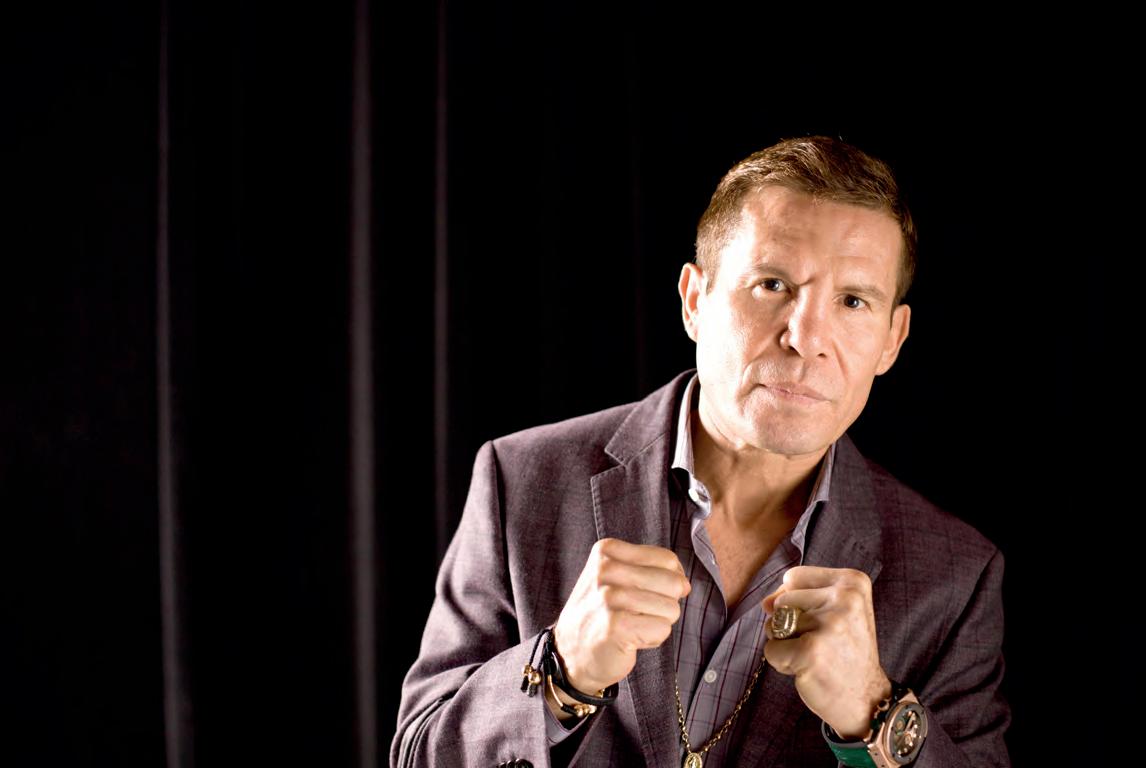
#CHAMPION. THE GREATEST. SUPER FEATHERWEIGHT. LIGHTWEIGHT.
SUPER LIGHTWEIGHT
Para Julio el boxeo es una forma de sobrevivir, para él fue una forma de salir adelante y sacar a su familia, es un deporte que aleja de las drogas y el alcohol, es una forma de ser que ayuda a vivir mejor y menciona “si yo volviera a nacer, definitivamente volvería a ser boxeador”. Podría parecer contradictorio, pero Chávez explica “el boxeo no me llevó a las adicciones, fueron las malas compañías, la fama y el dinero”.
CUANDO Julio César Chávez peleaba, principalmente en un periodo de más de 8 años, para los mexicanos era imposible que perdiera. 37 peleas de título mundial, 14 años invicto. Pero ¿cómo le llegó la oportunidad de título? “Fue gracias a Don José, él me dio la oportunidad”, riendo dice, “yo me había robado a mi señora y estaba a punto… cuando llegó la policía, me asusté, pero me estaban buscando para avisarme que iba a pelear por el campeonato del mundo contra el Azabache Martínez, así que ya no hice nada”.
Julio recuerda con cariño, “La oportunidad me la dio Don José y siempre voy a estar agrade-
cido con él, recuerdo que, en alguna de nuestras pláticas interminables, comenzó a bromear y llamarme ´Campeón Balín (muy malo) ´, por lo que yo también le decía ´Presidente Balín´. Hay algo que nunca podré pagarle y terminar de agradecerle y es haberme salvado la vida, él me decía ´usted no sabe lo que vale para México, yo no voy a permitir que usted acabe en la calle´, y fue el primero que me llevó a una clínica, él pagó porque yo estaba mal y siempre voy a estar agradecido y le di el gusto de verme limpio y bien”. Mauricio Sulaimán recuerda
PELEADORES:
• La pegada de Mike Tyson
• La quijada de Saúl “Canelo” Álvarez
• La velocidad de Sugar Ray Leonard
• Las piernas de Floyd Mayweather Jr.
• El boxeo fino de Julio César Chávez
• La dedicación para entrenar de Salvador Sánchez
• El valor de Jorge “el Travieso” Arce
“mi papá estaba muy feliz cuando lo fuiste a visitar al hospital y te vio limpio, en ese momento nos dijo, ´esa es la grandeza de Julio, no lo que hizo sobre el ring´ y no paraba de sonreír” concluye.
Sobre sus adicciones, Julio pasó todas, esa ha sido su mayor pelea, la más difícil, encontrar que, el poner las clínicas no solo ha sido para ayudar a gente que sufre lo mismo, incluso trabajar para poder fondear esos gastos, pero saber que esas clínicas también significan su compromiso consigo mismo, es lo más responsable que se puede hacer.
Algo que no pensaríamos es que el Gran Campeón Mexicano tuviera miedo, pero en un principio, le tenía miedo a volar. “La primera vez que me subí a un avión fue cuando fui a firmar el contrato con Don King para la pelea contra el Azabache, siempre viajaba en camión, pero cuando recibí el boleto, me sentía nervioso, aunque
For Julio, boxing is a means of survival, overcoming challenges, and providing for his family. It's a sport that steers away from drugs and alcohol, a lifestyle that enhances well-being. He mentions, "If I were born again, I would choose to be a boxer". It might seem contradictory, but Chávez explains, "Boxing didn't lead me to addictions; it was the wrong company, fame, and money".
DURING Julio César Chávez's fights, especially over more than 8 years, Mexicans believed he was invincible. 37 world title fights, 14 years undefeated. But how did he get his title opportunity? "It was thanks to Don José; he gave me a chance", he laughs and says, "I had eloped with my lady, and things were about to...
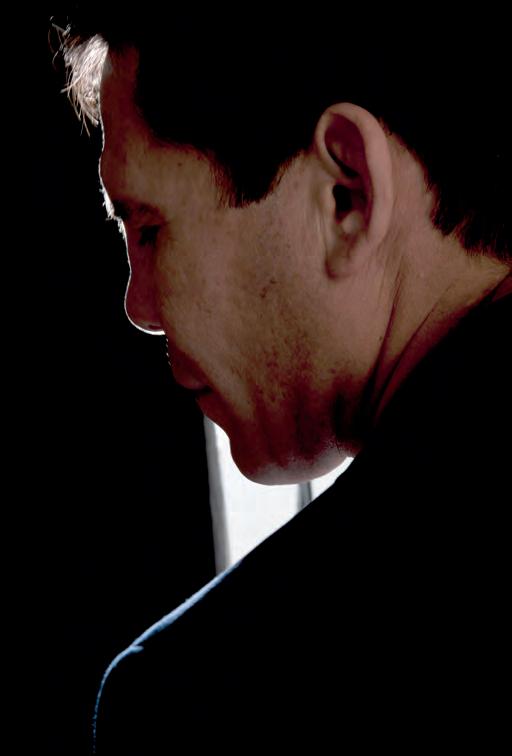
when the police showed up, I got scared. But they were looking for me to let me know that I would fight for the world championship against Azabache Martínez, so I didn't do anything".
Julio fondly recalls, "Don José gave me the opportunity, and I'll always be grateful to him. I remember that in one of our endless conversations, he started joking and called me 'Champion Balín (over rated),' and I'd call him 'President Balín'. There's something I can never repay or fully thank him for, and that's saving my life. He used to tell me, 'You don't know how much you mean to Mexico. I won't allow you to end up on the streets'. He was the first one who took me to a clinic; he paid because I was in a bad state, and I'll always be grateful. I fulfilled his wish to see me clean and well". Mauricio Sulaimán remembers, "My dad was so happy when you visited him in the hospital, and he saw you clean. At that moment, he said, 'That's Julio's greatness, not what he did in the ring', and he couldn't stop smiling", he concludes. Regarding his addictions, Julio conquered them all. That has been his biggest fight, the most challenging one. Creating clinics has been about more than just helping people suffering from the same issue and working to fund those expenses. Knowing that these clinics reflect his commitment to himself is the most responsible thing he can do.
“Yo entrenaba mucho con José Luis Ramírez, que, por cierto, es uno de los peleadores más olvidados, creo que debería estar en el Salón de la Fama y aprendí muchísimo de él”.
"I used to train a lot with José Luis Ramírez, who I believe is one of the most forgotten fighters. In my opinion, he should be in the Hall of Fame and I learned so much from him".
muy emocionado porque iba a cerrar la oportunidad de ser campeón, oportunidad que no dejaría ir. Le tengo mucho respeto a los aviones, de hecho, hubo una vez viajando a Tailandia en el cual entramos a una turbulencia muy fuerte, de pronto subió y bajó y yo casi perdí el conocimiento, me quería quedar a vivir en ese país, no porque me gustó, sino porque no quería volar de regreso. Ahora vivo en aviones”.
Cuando quisimos saber quién era el ídolo en el boxeo de Julio en sus inicios respondió “Siempre veía y admiraba a Rubén “el Púas” Olivares, me gustaba mucho ver sus peleas, tenía una gran izquierda y cuando tiraba el gancho al hígado era impresionante, yo siempre decía que no iba a ser igual de borracho que él y creo que fui peor”. “Yo entrenaba mucho con José Luis Ramírez, que, por cierto, es uno de los peleadores más olvidados, creo que debería estar en el Salón de la Fama y aprendí muchísimo de él”.
Al preguntarle sobre qué era lo mejor de visitar a la familia Sulaimán comenta “la comida que me hacía la ´Jefa´ (Doña Martha Saldivar de Sulaimán) siempre me acuerdo, aunque la última vez la dejé plantada, pero ya le llamé y me perdonó, pero estoy esperando la siguiente oportunidad para poder ir a visitarla y comer la típica comida Árabe tan sabrosa que cocina”.
Durante las grandes peleas de Julio, tuvo a un promotor histórico en su esquina, alguien que, con su visión, su peinado y risa estruendosa lo acompañó durante la mayor parte de su carrera. “Don King para mí ha sido el mejor promotor del mundo, sin él, no hubiera logrado lo que logré, él fue el que me llevó y encumbró, lógicamente tuvimos nuestras diferencias, pero eso ya pasó y yo a Don King le tengo un gran aprecio”.
Something we wouldn't expect is that the Great Mexican Champion would be afraid of something. At first, he was scared of flying. "The first time I got on a plane was when I went to sign the contract with Don King for the fight against Azabache. I always traveled by bus, but when I received the ticket, I felt nervous, although very excited because I was about to close the opportunity to become a champion – an opportunity I wouldn't let slip away. I have much respect for planes. There was a time when we were flying to Thailand and hit extreme turbulence. It suddenly went up and down, and I almost lost consciousness. I wanted to stay and live in that country, not because I liked it, but because I didn't want to fly back. Now, I live on airplanes".
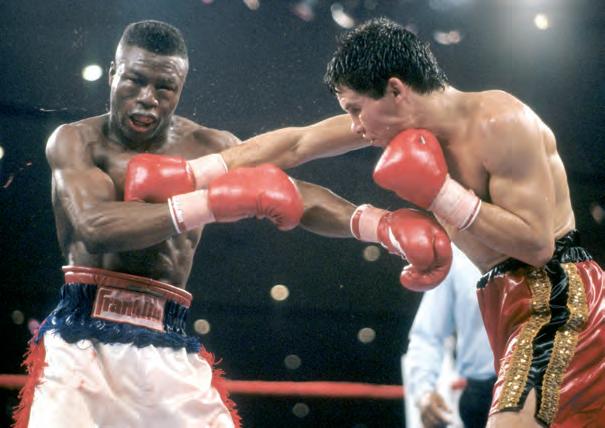
When we asked who his boxing idol was in his early days, Julio answered, "I always watched and admired Rubén 'el Púas' Olivares. I
www.jcchavezmexico.com
@Jcchavez115
jcchavez115
jcchavez115
jcchavez115mx@gmail.com
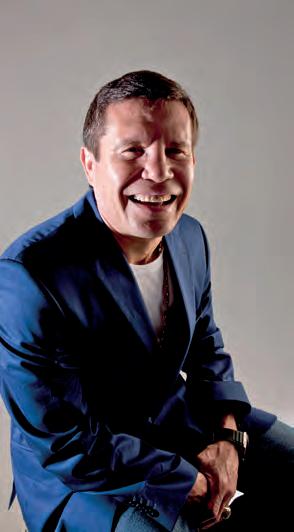
"La oportunidad me la dio Don José y siempre voy a estar agradecido con él...Hay algo que nunca podré pagarle y terminar de agradecerle, es haberme salvado la vida".
enjoyed watching his fights; he had a great left hand, and it was impressive when he threw a body hook. I used to say I wouldn't end up as much of a drinker as him, but I think I ended up worse". "I trained a lot with José Luis Ramírez, who, by the way, is one of the most forgotten fighters. I think he should be in the Hall of Fame, and I learned a lot from him".
When asked about the best thing about visiting the Sulaimán family, he comments, "The food made by the 'boss' (Doña Martha Saldivar de Sulaimán) is what I remember the most. Although I stood her up the last time, I called her, and she forgave me. But I'm waiting for the next opportunity to visit her and enjoy the delicious typical Arabian food she cooks".
During Julio's major fights, he had a historic promoter in his corner –someone whose vision, hairstyle, and thunderous laughter accompanied him throughout his career. "For me,
Don King has been the best promoter in the world. Without him, I wouldn't have achieved what I did. He's the one who took me to the top. We had our differences, but that's in the past, and I hold Don King in high regard".
• Mike Tyson's punch
• Saúl "Canelo" Álvarez's chin
• Sugar Ray Leonard's speed
• Floyd Mayweather Jr.'s footwork
• Julio César Chávez's refined boxing
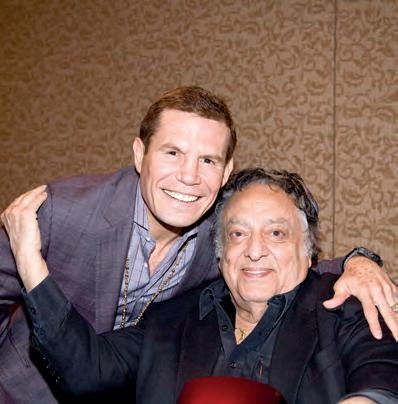
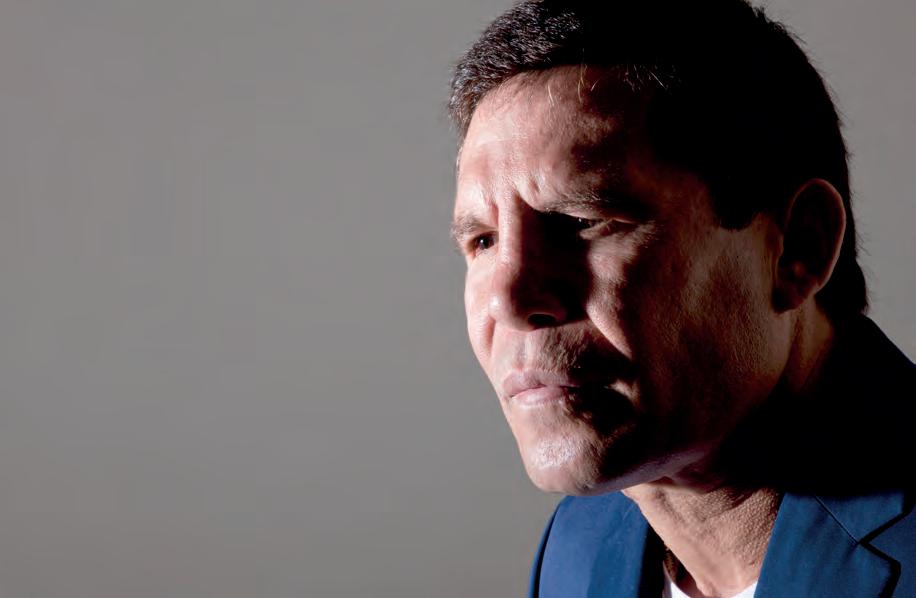
• Salvador Sánchez's dedication to training
• Jorge "el Travieso" Arce's courage
"Don José gave me the opportunity and for that I'll always be grateful... There's something I'll never be able to repay him and thank him enough for, and that's saving my life"
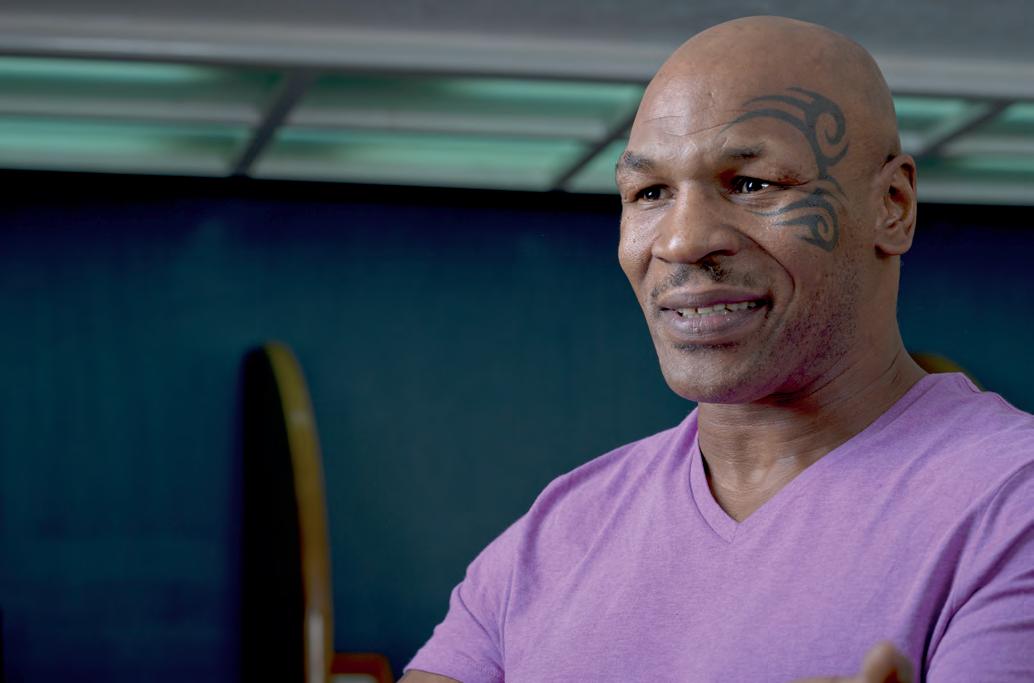
Michael Gerard “Mike” Tyson, ex boxeador nacido en Nueva York, EEUU que trazó una línea en la historia del boxeo mundial, nunca antes uno igual y aún no hay quien lo supere. Gran temperamento, dotado de un físico irrepetible, vivió una etapa en su deporte que rompió todos los esquemas imaginados. Gran amigo de don José Sulaimán, de su hijo Mauricio y del WBC, es un hombre con grandes aprendizajes que compartir.
MAURICIO SULAIMÁN en algún momento de su vida llegó a considerar dedicarse al boxeo, y en quien se inspiraba era en el gran campeón Mike Tyson, Miguel, como lo llama afectuosamente Mauricio, quien tan solo le lleva tres años. La primera vez que lo vio en un ring fue en cuando Tyson se convirtió en el monarca mundial más joven de todos los tiempos como Peso Completo. Con los años, don José y Mauricio cultivaron una relación muy cercana con el gran campeón
En su época de gloria ganó dos veces el título de Pesos Completos y se coronó como el más joven de la historia en conseguirlo el 22 de noviembre de 1986 con 20 años cuatro meses y dos días, ganando el
• En 2011 fue incluido en el Salón Internacional de la Fama del Boxeo.
• En sus peleas obtuvo 50 victorias de las cuales 44 fueron por KO y 6 derrotas.
título del WBC contra el jamaiquino
Trevor Berbick. Enfrentó a grandes rivales como Frank Bruno, Larry Holmes, “Buster” Douglas, Evander Holyfield y Lennox Lewis posicionándose como el más temido y uno de los mejores de la época.
Hombre singular que en su etapa de entrenamiento pasaba horas viendo los grandes encuentros boxísticos que se volvieron históricos, compartió anécdotas de esa época. “Lo mío era ver peleas, así que tenía seis semanas de entrenamiento, me la pasaba viendo peleas porque eso es todo lo que quería. La gente normal que tiene que pelear ni siquiera quiere ver una pelea y mi entrenador Cus D'amato pensó que algo andaba mal conmigo, porque me emocionaba viendo las peleas”, recordó.
Mike Tyson consideraba que esa experiencia se la tenía que apropiar, tenía que ser parte de su carne, su cerebro, su mente. “Tenía que ser parte de eso, y me convertí en parte de la pelea, conocía a todos los campeones, conocí a todos esos muchachos como Rubén Olivares, Alexis Arguello, Aaron Pryor conocí a todos los peleadores que admiraba, incluso los viejos como Billy Graham”, recordó.
José Martín Sulaimán, amigo suyo, platicó con Mike Tyson y entraron en una conversación única en donde el ex campeón de los Pesos Completos le compartió la forma en la que hoy entiende la vida en lo general, apoyado en su carrera como boxeador pero, sobre todo, en los aprendizajes que le fue brindando la vida. “Esto es lo que aprendí, todos con quien peleas no son tus enemigos y todos los que te ayudan no son tus amigos, y eso es lo que la vida me enseñó. La gente con la que peleas es la mejor que conoces, la mejor, tus mejores aliados, mi experiencia, la gente con la que peleé son mis mejores aliados al final. El universo dual negro-blanco, bueno-malo”.
Mike Tyson no tuvo una vida sencilla, durante años estuvo en la mira de los medios y de la polémica, brindó espectáculo y también dio lecciones sobre su derecho a ser el hombre que ha sido. “Siempre debemos buscar estar
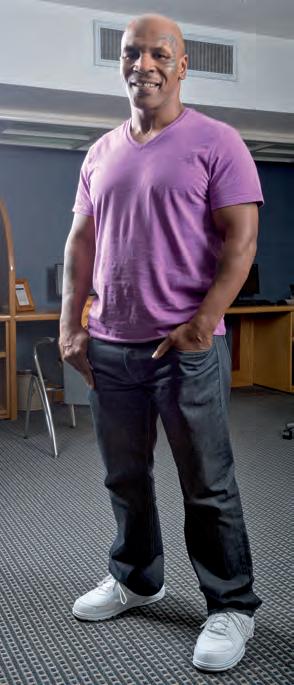
Mike Tyson, a legendary former boxer born in New York, USA, made an unforgettable impact on the boxing world. With his exceptional temperament and oneof-a-kind physique, he broke all boundaries and norms of his sport. He was a dear friend of Don José Sulaimán, his son Mauricio, and the WBC, and he has important lessons to teach.
MAURICIO SULAIMÁN once contemplated a career in boxing and looked up to the legendary champion, Mike Tyson. Despite being only three years apart in age, Mauricio fondly referred to him as Miguel. He first witnessed Tyson's talent when he became the youngest Heavyweight World Champion ever. Throughout the years, Mauricio and his father, Don José, formed a strong bond with the heavyweight icon.
During his prime, Tyson won the Heavyweight title twice and became the youngest Heavyweight Champion in history on November 22, 1986, at the age of 20 years, four months, and two days, winning the WBC title against Jamaica's Trevor Berbick. He faced formidable opponents such as Frank Bruno, Larry Holmes, "Buster" Douglas, Evander Holyfield, and Lennox Lewis, solidifying his status as the most feared and one of the greatest boxers of his era.
In his training days, Tyson spent hours watching historic and memorable boxing matches, a practice that he cherished. "I loved watching fights, so during my six weeks of training, I watched combats because that's all I wanted. Regular people who have to fight don't even want to watch one, and my trainer Cus D'Amato thought there was something wrong with me because I got excited about them", he reminisced.
Mike Tyson believed he needed to absorb that experience and fully immerse himself. "I had to be a part of that; I became a part of the fight. I knew all the champions; I knew all those guys like Rubén Olivares, Alexis Arguello, and Aaron Pryor. I knew all the fighters I admired, even the old ones like Billy Graham", he recalled.
Apodo: Iron Mike Fecha y lugar de nacimiento: 30 de junio de 1966, Brooklyn, Nueva York
Altura: 1,78 mts.
División: Peso Completo
“No es propiamente frente a un contrincante cuando se encuentra cara a cara con la muerte, ya que, en cualquier segundo podemos morir y cuando te estás muriendo, la vida se vuelve más hermosa”.
MICHAEL GERARD TYSON
en medio, porque si estás ahí, ya sabes, tienes un poco de todo, no puedes evitar tener mal o tener bien. La vida de otra manera no sería emocionante, entonces si todo fuera puro bien… desde una buena perspectiva no inspiraría a la gente, ya que la adversidad hace al fuerte más fuerte y al débil más débil. Todos necesitamos la adversidad en nuestra vida, necesitamos ser competitivos para mejorar el mundo”, compartió el ex campeón mundial.
Y su relación con toda la gente que ha conocido, y sobre todo con aquellos que han tenido la curiosidad de conocerlo, estrechar su mano, también le legaron algo. “Aparentemente todo el mundo vive la vida tratando de demostrar algo, también es una lucha para demostrar que eres, que perteneces, que eres todo esto. Solo tengo que darme cuenta de que todo esto ha sido parte de un aprendizaje, todos son mis maestros, ricos o pobres, superestrellas, las flores, los insectos, los pájaros”.
Y para concluir, a sus 57 reflexionó sobre la vida y la muerte, la belleza y el amor. “Estamos tan cerca de un encuentro con la muerte que ni siquiera sabemos que podríamos estar con la muerte en este momento. En cualquier momento puede pasar cualquier cosa, podemos morir en cualquier segundo, y cuando te estás muriendo, la vida se vuelve más hermosa, todo lo que ves, el árbol es más hermoso, todo se ve mejor, la imagen es más hermosa, todo es hermoso, todo es más amoroso. Creo que la muerte tiene mala fama, como puede ser tan bella la vida y mala la muerte, ¿para qué Dios querría que suframos? si todo lo que creemos de Dios es verdad, cuando todo es amor no creo que la muerte sea mala, creo que esa es quizás otra forma de vida que tenemos que experimentar. Vivimos en un universo dual, todo es nuestra experiencia humana, dualidad. Piensa hermano, ¿quién eres?”.
ple you fight are the best people you know; they're your best allies. In my experience, the people I fought are my best allies. The dual black-white universe, good-bad".
Mike Tyson didn't lead an easy life; he was under constant media scrutiny and controversy for years. He provided entertainment and lessons on his right to be the man he is. "We should always aim to be in
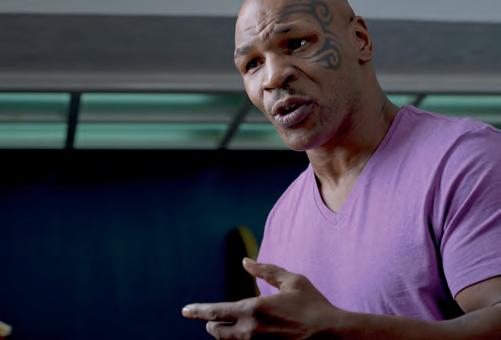
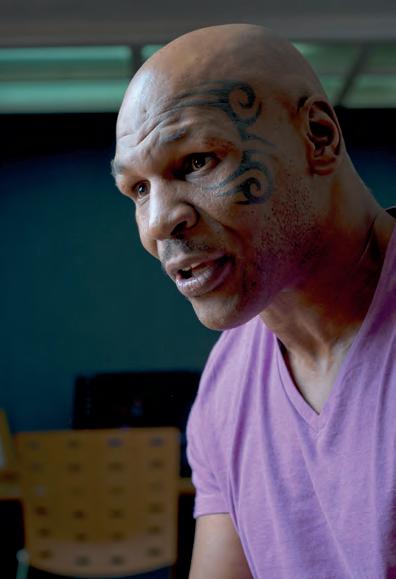
• In 2011, he was inducted into the International Boxing Hall of Fame.
• “In his career, he’s obtained 50 victories, 44 of which were by knockout, and 6 loses”
José Martín Sulaimán, his friend, engaged in a unique conversation with Mike Tyson where the former Heavyweight Champion shared his current perspective on life. He based it on his boxing career and the life lessons it offered him. "This is what I learned: not everyone you fight is your enemy, and not everyone who helps you is your friend. That's what life taught me. The peo-
“Los instintos animales son un mecanismo de supervivencia que los humanos hemos vuelto racionales”.
"It's not facing an opponent when you're face to face with death, as at any second we can die, and when you're dying, life becomes more beautiful".
the middle because if you're in the middle, you know, you have a bit of everything. You can't avoid having both good and bad. Life wouldn't be exciting otherwise. If everything were pure good... from a good perspective, it wouldn't inspire people, as adversity makes the strong stronger and the weak weaker. We all need adversity in our lives; we must be competitive to improve the world", the former world champion shared. His relationship with everyone he's met, especially those who've had the curiosity to know him, to shake his hand, also left him with something. "Everyone lives life trying to prove something. It's also a struggle to prove who you are, that you belong, that you're all of this. I have to realize that all of this has been part of learning. Everyone is my teacher, rich or poor, superstars, flowers, insects, birds".
And to conclude, at 57, he reflected on life, death, beauty, and love. "We are so close to meeting death that we don't even know we could face death right now. Anything can happen at any moment; we can die at any second. And when you're dying, life becomes more beautiful. Everything you see, the tree is more beautiful, everything looks better, the image is more beautiful, everything is beautiful, everything is more loving. I think death has a bad reputation; how can life be so beautiful and death be so bad? Why would God want us to suffer if everything we believe about God is true? When everything is love, I don't think death is bad. I believe it's perhaps another form of life that we need to experience. We live in a dual universe; everything is our human experience, duality. Think, brother, who are you?".
Nickname: Iron Mike
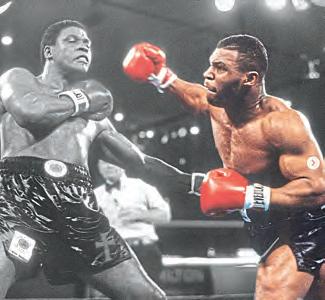
Date and Place of
Birth: June 30, 1966, Brooklyn, New York
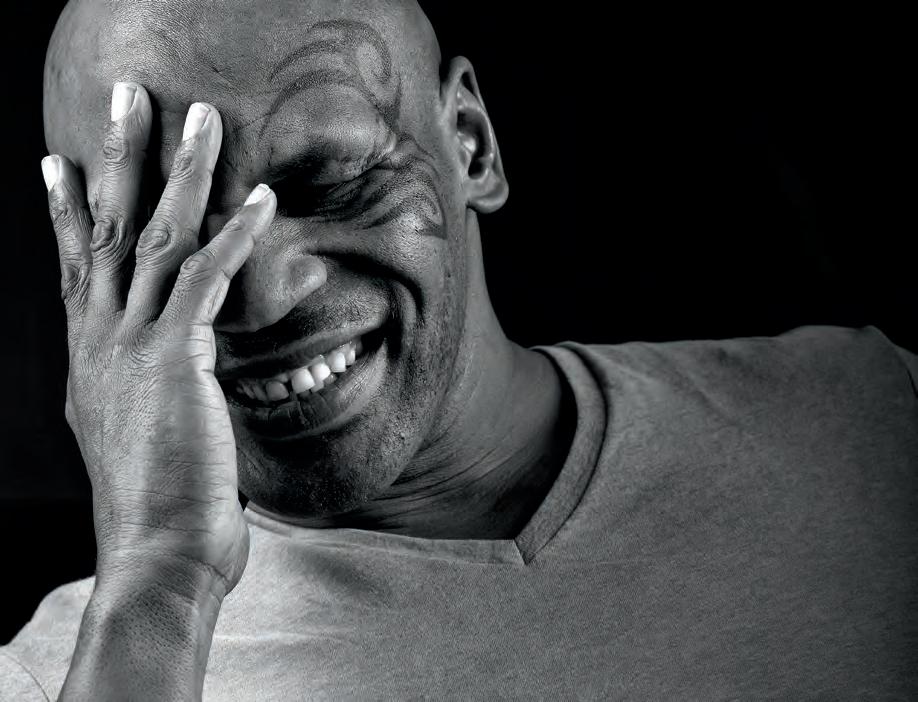
Height: 5'10"
Division: Heavyweight
"Animal instincts are a survival mechanism humans have turned into rationality".MICHAEL GERARD TYSON
Semblanza
#UNIFIED SUPER MIDDLEWEIGHT
WORLD CHAMPION. SUPER
WELTERWEIGHT WORLD CHAMPION. LIGHT HEAVYWEIGHT WORLD CHAMPION
En la escena del boxeo mundial, hay un nombre que resuena con fuerza y dominio: Saúl 'Canelo' Álvarez. Nacido el 18 de julio de 1990 en Guadalajara, México, Canelo ha dejado una huella imborrable en el deporte de los puños, convirtiéndose en un ícono y referente para la afición mexicana y un verdadero fenómeno a nivel internacional.
CON UNA CARRERA profesional que se remonta al año 2005, “Canelo” Álvarez ha recorrido un camino lleno de desafíos, sacrificios y una dedicación incansable. Su talento natural y su determinación lo llevaron a cosechar victorias y títulos en múltiples categorías de peso.

“El primer momento que sentí una emoción especial por boxear fue al ver a mi hermano mayor Rigo debutar, la emoción que se generaba es algo único que me hizo pensar, este deporte es mío”, recordó el tapatío sobre lo que lo llevaría a ser profesional. Desde sus primeros días en el ring, “Canelo” mostró un estilo agresivo y una habilidad impresionante para lanzar combinaciones rápidas y poderosas. Con una defensa sólida y un contraataque letal, ha demostrado ser un boxeador completo y versátil capaz de adaptarse a cualquier oponente que se le presente.
• Ha ganado títulos en cuatro categorías diferentes.
• Es conocido por ser un gran contragolpeador y uno de los mejores boxeadores defensivos que ha dado México.
caneloteam.com
@canelo
Canelo Álvarez
@canelo
“Yo tenía un ejemplo muy claro que era el Chololo Larios, él era campeón mundial y veía cómo lo trataban diferente. Quería sobre todo ese título verde y oro que es el del WBC, el campeonato más reconocido del mundo y, al ser uno de los campeones más jóvenes me sentía orgulloso. Luego noté que había más cosas aparte de ser campeón y es lo que me mantiene motivado para conseguir más cosas dentro del deporte”, confesó.
Esta mentalidad lo llevaría a acumular varios campeonatos en diversas divisiones, unificando algunos de ellos. También lograría que consiguiera enfrentamientos con algunos de los nombres más grandes del boxeo, incluidos Floyd Mayweather Jr., Miguel Cotto, Gennady Golovkin y Callum Smith, entre otros.
En cuanto a lo que representa, Álvarez se siente feliz de poder ser la cara del boxeo mexicano, de una larga tradición de pugilistas con gran talento y corazón y de ser el campeón más importante que tiene actualmente el Consejo Mundial de Boxeo, una organización que siempre actúa en pro del deportista y que lo ha apoyado a lo largo de su carrera.
“Para mí Don José Sulaimán fue una persona muy especial y sigue siendo una figura importante. Me apoyó desde mis inicios en todos los sentidos y estoy muy agradecido con él, espero que lo sepa donde quiera que se encuentre. Mauricio también me ha ayudado constantemente y estaré en deuda con ellos el resto de mi vida”.
Saúl se ha ganado el respeto y la admiración de millones de fanáticos gracias a su ética de trabajo impecable y su generosidad. Además, ha utilizado su plataforma para promover causas sociales y ayudar a aquellos que más lo necesitan. Con cada golpe y cada victoria, continúa escribiendo su historia y consolidándose como uno de los grandes del deporte de los puños.
• Saúl tiene un récord profesional de 63 peleas disputadas, 59 ganadas, 39 por la vía del nocaut, dos derrotas y dos empates.
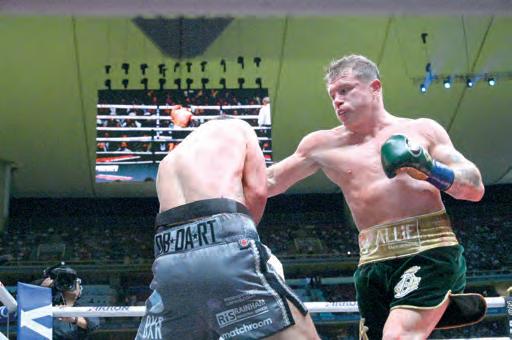
In boxing, few names carry as much power and dominance as Saúl 'Canelo' Álvarez. Born on July 18, 1990, in Guadalajara, Mexico, Canelo has become an iconic and inspirational figure for Mexican fans and a global phenomenon.
"CANELO" ÁLVAREZ has had a professional boxing career since 2005, facing challenges and making sacrifices. His natural talent and dedication have called him titles in multiple weight categories. "The first moment I felt a special excitement for boxing was when I saw my older brother Rigo make his debut; the emotion it generated was unique and made me think, this sport is mine", reminisced the fighter from Guadalajara about what would lead him to turn professional.
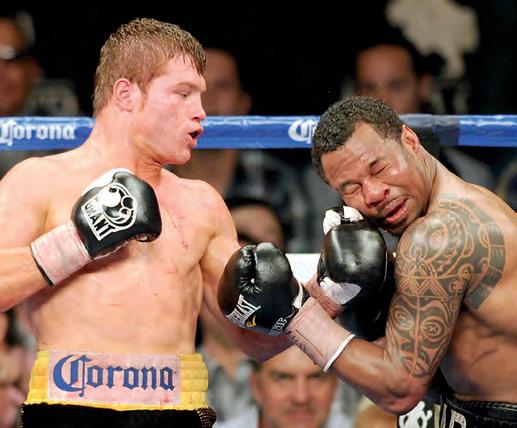
“Tengo ya casi 13 años peleando en el primer nivel, desde que gané mi primer campeonato mundial. Lo que me ha mantenido es la disciplina, las ganas de ser el mejor libra por libra y que amo lo que hago. Aún quiero seguir consiguiendo cosas en el boxeo, cuando no sea feliz haciendo esto y teniendo metas será cuando me retire”.
"I've been fighting at the top level for almost 13 years, since I won my first world championship. What has kept me going is discipline, the desire to be the best pound-for-pound, and the fact that I love what I do. I still want to achieve more in boxing. When I'm no longer happy doing this and setting goals, that's when I'll retire".
From his early days in the ring, "Canelo" displayed an aggressive style and an impressive ability to unleash quick and powerful combinations. With solid defense and lethal counterpunch, he has demonstrated himself to be a skilled and adaptable boxer, capable of adjusting his techniques to suit any opponent.
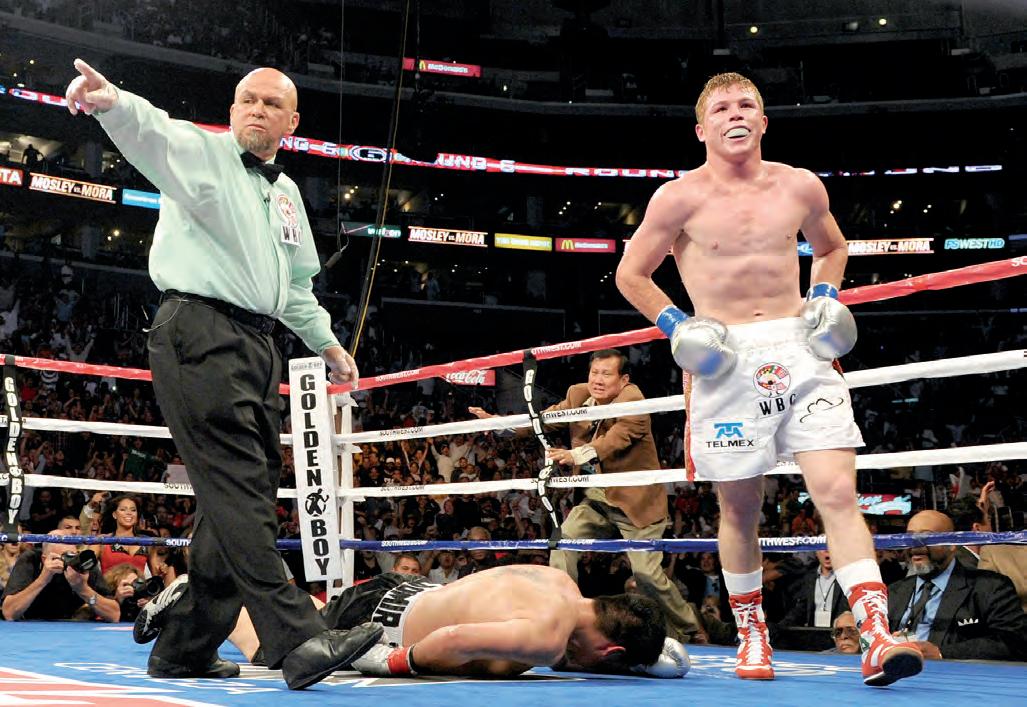
"I had a clear example, which was Chololo Larios; he was a
world champion, and I saw how they treated him differently. I wanted that green and gold belt, the WBC title, the most recognized championship in the world, and being one of the youngest champions, I felt proud. Then I noticed that there were more things beyond being a champion, which keeps me motivated to achieve more in the sport", he confessed.
• Saúl boasts a professional record of 63 fights, with 59 wins, 39 by way of knockout, two losses, and two draws.
This mindset led him to gather several championships in various divisions, unifying some and securing bouts with boxing's most prominent names like Floyd Mayweather Jr., Miguel Cotto, Gennady Golovkin, and Callum Smith.
Regarding his significance, Álvarez is happy to be the face of Mexican boxing, a long tradition of talented and passionate pugilists, and the most prominent champion currently recognized by the World Boxing Council (WBC). This organization always favors athletes and has supported him throughout his career.
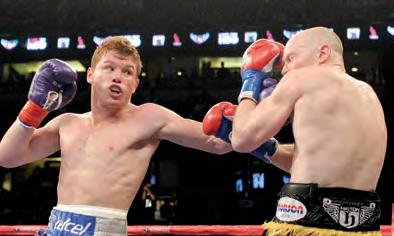
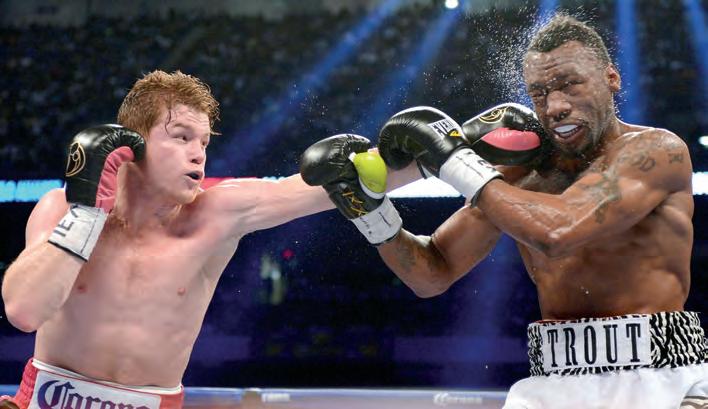
"For me, Don José Sulaimán was an extraordinary person and still holds great importance. He supported me in every possible way from the beginning, and I am very grateful to him. I hope he knows that wherever he is. Mauricio has also constantly supported me, and I will be indebted to them for the rest of my life".
Saúl's impeccable work ethic, and generosity have called him respect and admiration from millions of fans. He uses his platform to promote social causes and help those in need, solidifying his status as one of the pugilistic greats with every punch and victory.
• He has secured titles in four different weight categories.
• He is known for being a superb counterpuncher and one of Mexico's finest defensive boxers.

#BOXER. MANOS DE PIEDRA.
LIGHTWEIGHT CHAMPION.
WELTERWEIGHT CHAMPION. SUPER
WELTERWEIGHT CHAMPION.
MIDDLEWEIGHT CHAMPION. HALL OF FAME INDUCTEE
Jaime Higuera Mariñelarena
Cortesía Carlos Cuevas
Traducción: Mariana Torres
Durán llegó al boxeo sin buscarlo, pero su talento dentro del cuadrilátero haría pensar a varios que conocieron su trayectoria que fue una cuestión del destino. Debutó el 23 de febrero de 1968 y peleó en cinco décadas distintas, 60´s, 70´s, 80´s, 90´s y 2000´s, consiguió 103 victorias, 70 de ellas por la vía del cloroformo y solamente afrontó la derrota en 16 ocasiones.
“Yo fui boxeador por casualidad, mi hermano que practicaba este deporte me pedía que lo acompañara a entrenar. Me llamaron la atención cómo se veían las caretas, los guantes y las botas y por eso me metí al gimnasio, pregunté cómo podía conseguir unos guantes y una careta y ahí me explicaron que tendría que pelear y ganármelas. Pasé un año ahí entrenando, pero aún no conseguía nada, me dijeron que necesitaba un mánager, pero fue algo complicado para mí, fue hasta que vieron que yo podía pegar que comenzaron a acercarse a mí y a llegar las oportunidades”, relató el panameño.
El llamado “Manos de Piedra” a pesar de enfatizar que no admira a nadie, con los años ha revelado que tomó también cierta inspiración en la
Roberto “Manos de Piedra” Durán es uno de los personajes únicos que el deporte genera cada determinado número de años. Individuos que cambian la manera de acercarte una disciplina, que dan visibilidad a nuevos puntos en el mapa y que atraen a nuevos públicos a conocer lo que para muchos es un vehículo de pasiones y emociones.
@robertoduranbox
@robertoduranbox
forma de pelear con las películas de vaqueros y John Wayne, filmes los cuales sigue disfrutando ampliamente en estos días.
Durán fue un guerrero espectacular para todos los que tuvieron la oportunidad de verlo desempeñarse dentro de un ring. Tuvo enfrentamientos sumamente pasionales con figuras de la talla de Sugar Ray Leonard, Davey Moore y Héctor “El Macho” Camacho.
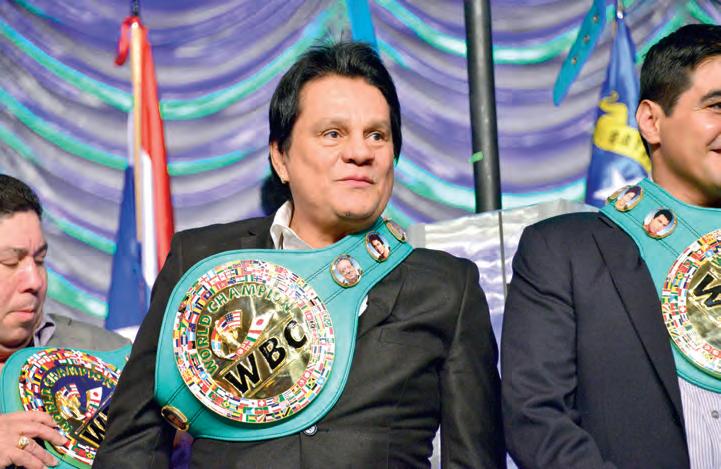
Dominó la adversidad
En cuanto a la pelea que el exboxeador tiene más en la cabeza, se encuentra cuando perdió el título frente a Tommy Hearns y no le dieron la posibilidad de revancha. Esto lo marcaría porque a lo
• Fue campeón de los ligeros al derrotar por KO a Ken Buchanan.
• Derrotó a Sugar Ray Leonard en 1980 para convertirse en campeón peso welter.
• La corona superwelter la obtiene al superar a Davey Moore por knockout técnico.
• Le arrebató la presea mundial de los medianos a Irán Barkley durante el 89 en Atlantic City.
largo de su trayectoria se enfrentaría a condiciones adversas y decisiones cuestionables que lo llevarían a aprender a remar contra corriente.
“Contra Hearns no quisieron darme la revancha y fue a cruzarse con Marvin Hagler, ahí cometió un grave error de querer enfrentarlo solo porque en su momento no pudo noquearme. Hagler le dijo que él solo pudo ganarme porque no estaba en condiciones porque si hubiera estado preparado lo mataba, pero le señaló que él sí estaba listo. Después, en el tercer asalto, noqueó a Hearns”, detalló el miembro del Salón Internacional de la Fama acerca de lo que en aquel entonces se conoció como “The War”, por la rivalidad generada por estas figuras del pugilismo.
Aun con estas dificultades, el boxeador panameño tuvo un gran soporte en dos figuras clave del deporte tales como Ray Arcel y Freddie Brown. A quienes reconoció como dos personajes que lo dejaban preparado a la hora de enfrentar un combate y quienes en cierta medida intermediaban en el ambiente norteamericano por él. Sin embargo, su maestro y quien Durán menciona como responsable de forjarlos como profesional y mostrarle la técnica fue Ernesto Quiñones, conocido como “Plomo Espinoza”.
En cuanto a la opinión de Durán del boxeo, en la actualidad lamenta que los deportistas se vuelquen al aspecto económico en lugar de demostrar sus condiciones. Y cuestionó su efectividad en los tiempos que él se desempeñaba, así como lo hizo en su momento con Floyd Mayweather cuando aseguró que podría noquear fácilmente. Así es Roberto Durán, un peleador hasta el último de sus días.
Roberto "Hands of Stone" Durán is one of those unique figures that sports produce every few years. Individuals who change the way you approach a discipline bring visibility to new points on the map and attract new audiences to experience what, for many, is a vehicle of passion and emotion.
Durán stumbled into boxing, but his talent inside the ring would make many who witnessed his journey believe it was destiny. He made his debut on February 23, 1968, and fought in five different decades, 60's, 70's, 80's, 90's and 2000's, he achieved 103 victories, 70 of them by knockout, and faced defeat only 16 times.
"I became a boxer by chance. My brother, who practiced this sport, asked me to accompany him to training. The headgear, gloves, and boots caught my attention, and that's why I went to the gym, I asked how I could get some gloves and a headgear and the-
• He became the lightweight champion, defeating Ken Buchanan by KO.
• He defeated Sugar Ray Leonard in 1980 to become the welterweight champion.
• He obtained the super welterweight crown by defeating Davey Moore by technical knockout.
• He took the middleweight title from Iran Barkley in 1989 in Atlantic City.
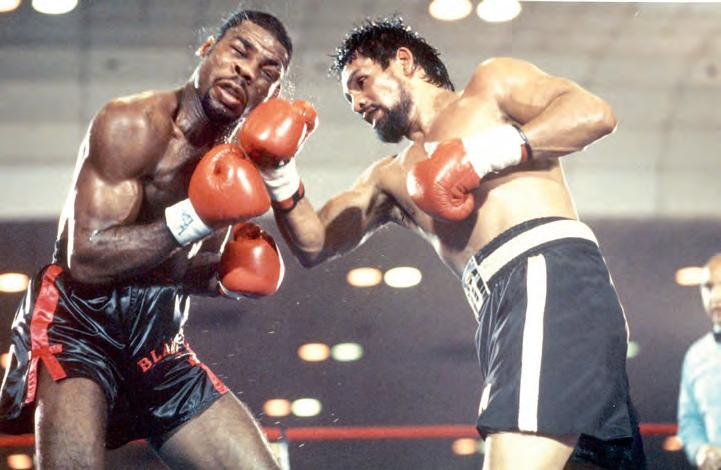
"I met José Sulaimán when Mauricio was just a child. They were always there for my fights. I was a champion in various organizations, but they always looked out for me. They are a dynasty for the sport".
re they explained to me that I would have to fight and win them. I spent a year training there but still couldn't achieve anything. They told me I needed a manager, but it was complicated. When they saw that I could hit hard, opportunities started coming my way", recounted the Panamanian.
I was struck by how the headgear, gloves and boots looked and that's why I went to the gym, I asked how I could get some gloves and a headgear and there they explained to me that I would have to fight and win them.
Despite emphasizing that he admires no one, over the years, Durán has revealed that he also found inspiration in the fighting style of cowboys and John Wayne's movies, which he still enjoys immensely to this day.
Durán was a spectacular warrior for all those who had the chance to witness him in the ring. He fought highly passionately against Sugar Ray Leonard, Davey Moore, and Héctor "Macho" Camacho.
Regarding the fight that stands out the most in the ex- boxer's mind, it
is when he lost the title to Tommy Hearns and was denied a rematch. This experience marked him because, throughout his career, he faced adverse conditions and questionable decisions that taught him to swim against the tide.
"They didn't want to give me a rematch against Hearns, and he went on to face Marvin Hagler. He made a big mistake by wanting to face him alone because, at the time, Hagler couldn't knock me out. Hagler told him he only beat me because I wasn't in shape, but he said he was ready. Then, in the third round, Hagler knocked out Hearns", detailed the Hall of Fame member about what was then known as "The War" due to the rivalry between these boxing legends.
Even with these difficulties, the Panamanian boxer had great support from two key sports figures: Ray Arcel and Freddie Brown. He recognized them as individuals who prepared him for his fights and acted as intermediaries in the North American environment. However, his teacher, Ernesto Quiñones, known as "Plomo Espinoza", was responsible for shaping him as a professional and teaching him the technique.
Regarding his opinion on contemporary boxing, Durán regrets that athletes focus more on the economic aspect rather than showcasing their skills. He questioned its effectiveness in his time and even challenged Floyd Mayweather, stating that he could easily knock him out. Such is Roberto Durán, a fighter to the end of his days.
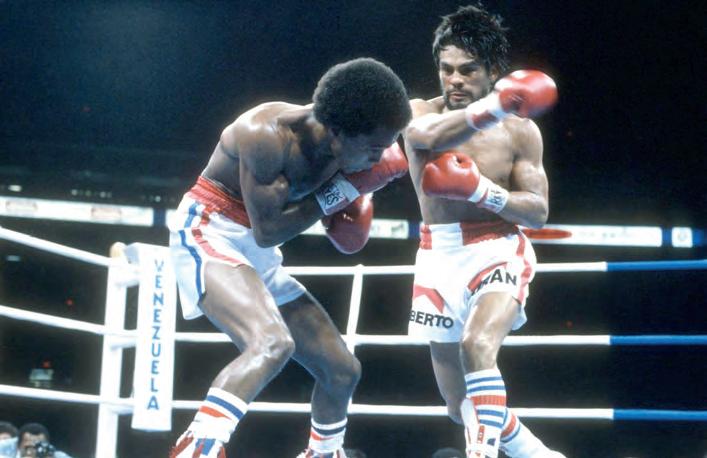
• El panameño poseía de una gran pegada con su recto largo de derecha, que era su arma más letal. Fue un especialista en golpear los costados de sus contrincantes una vez que lograba arrinconarlos contra las cuerdas. Llegó a dominar las tres distancias, pero su maestría por el terreno corto lo caracterizó.
@robertoduranbox
@robertoduranbox
• The Panamanian possessed a powerful right straight, his most lethal weapon. He excelled in hitting his opponents' sides once he cornered them against the ropes. While he dominated at all ranges, his mastery of close-range combat defined him.
“Conocí a José Sulaimán desde que Mauricio era un niño, ellos siempre estaban en mis peleas, yo fui campeón de varios organismos, pero siempre estaban al pendiente de mí y son una dinastía para el deporte”.
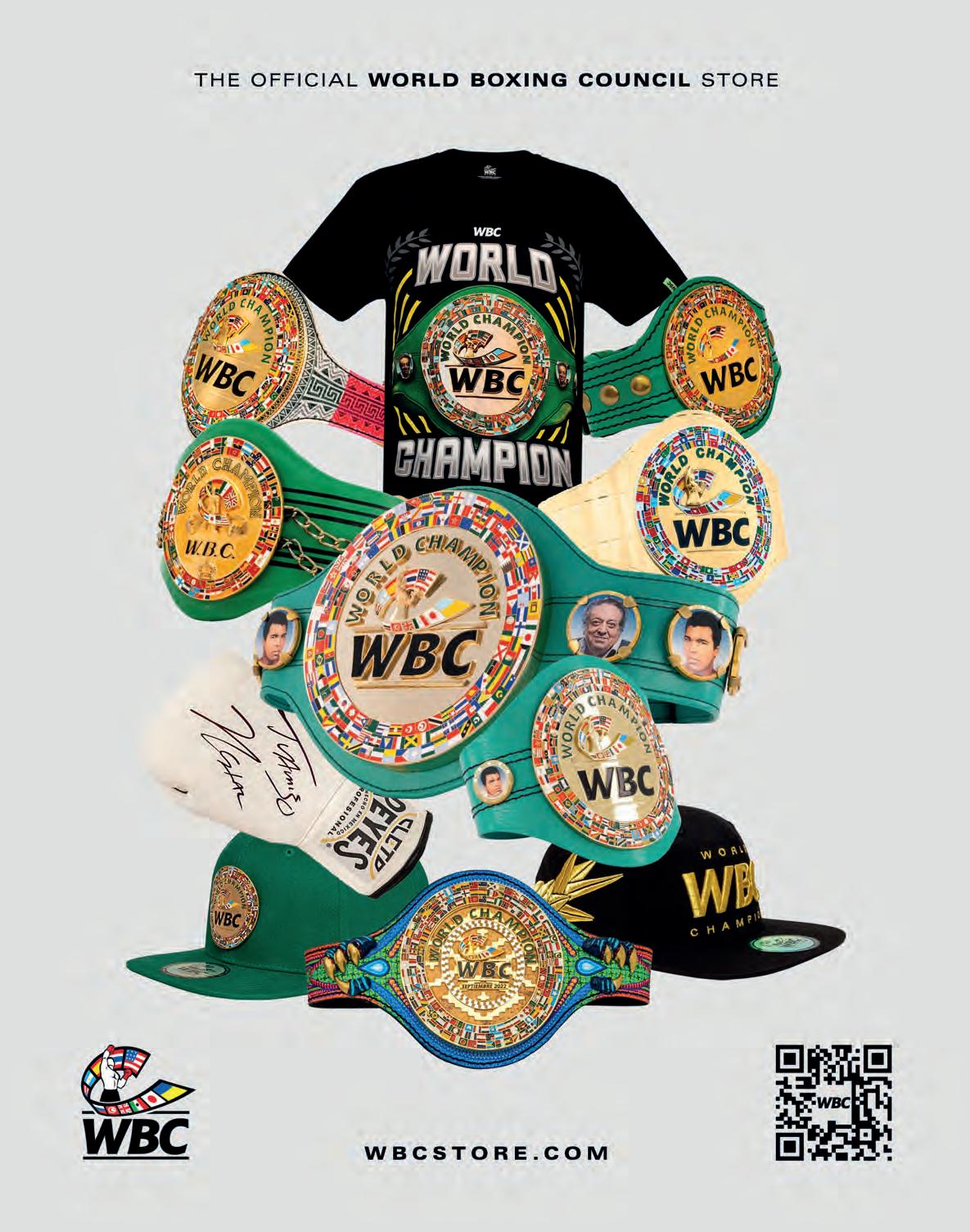
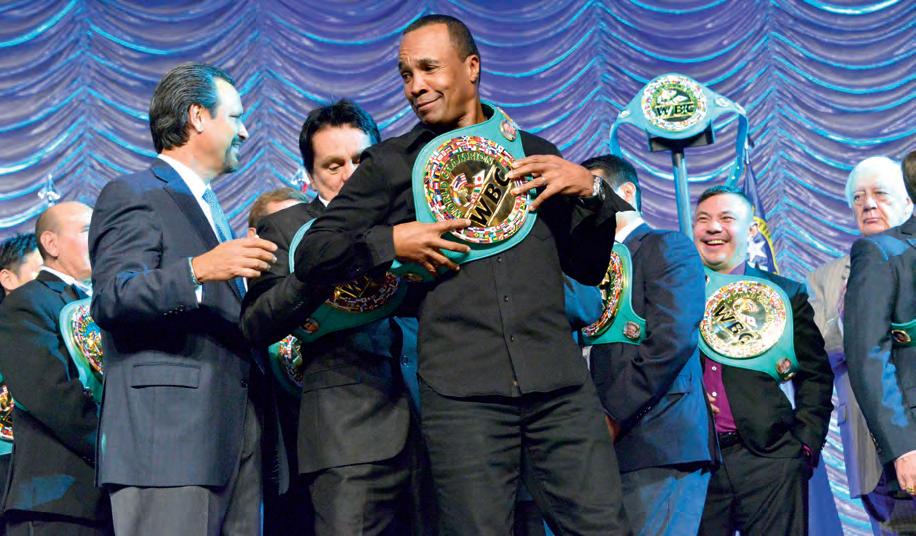
#BOXER (1977-1997). CHAMPION. WELTERWEIGHT. MIDDLEWEIGHT. LIGHT HEAVYWEIGHT.
Ana Laura Santos Cortesía Carlos Cuevas Traducción: Mariana TorresRay Charles Leonard, nació el 17 de mayo de 1956 en Carolina del Norte, EEUU. Es mejor conocido como “Sugar Ray Leonard”, en honor a “Sugar Ray Robinson” y pasó a la historia del deporte por ser el primer boxeador profesional que se galardonó con diferentes títulos mundiales en cinco categorías, volviéndose uno de los más importantes de la década de los 80’s y hasta nuestros días.
“YO VENGO de cuna humilde, mis padres nos proveyeron lo mejor que pudieron -éramos seis hijos-, pero si yo no hubiera entrado a un gimnasio de box, ahora no estaría vivo”.
Como amateur disputó 150 combates donde solo perdió cinco; también, en 1976 obtuvo el Oro en Peso
Welter durante los Juegos Olímpicos de Montreal y un año más tarde comenzó su carrera como profesional.
“Yo no iba a ser peleador profesional, mi intención era retirarme después de los Juegos Olímpicos de Montreal, pero llegué a casa y encontré a mi papá en coma. No teníamos dinero y le pregunté a mi
mentor Janks Morton, cómo podía hacer dinero rápido y me dijo “hazte profesional”. Mi papá vivió hasta los 95 años”.
Para 1979 ya había ganado su primer título en la categoría de los Welter del Consejo Mundial de Boxeo. Un año más tarde perdió el título contra el panameño de Roberto “Manos de Piedra” Durán -quien, como el mismo Sugar dice, le pateó el trasero-, pero para sorpresa de todos lo volvería a recuperar ese mismo año (1980) frente al mismo contrincante en la pelea de revancha. “El boxeo es un deporte mental. El momento de perder esa pelea con Durán, ha sido uno de los momentos
más solitarios que recuerdo; el llegar a mi habitación de hotel completamente derrotado y darme cuenta que en ese momento fui tan débil mentalmente que él consiguió meterse en mi cabeza y le fue efectivo”.
Para 1981, Sugar Ray Leonard ganó de nuevo en su categoría, pero además en los Superligeros también del WBC. El año siguiente sufrió un desprendimiento de retina y el 9 de mayo de 1982, fue sometido a cirugía a los 25 años de edad, problema que venía arrastrando desde nueve meses antes durante una pelea. Este hecho lo alejó del cuadrilátero durante los siguientes dos años.
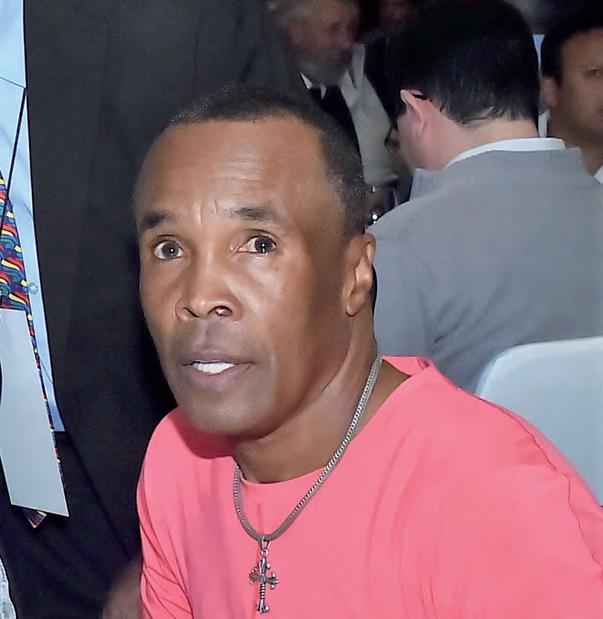
Regresó al ring en 1984 y aunque ese año anunció su salida de este deporte, para 1987 disputó el Campeonato Mundial de los Pesos Medios contra Marvin Hagler a quien le ganó por puntos y de nuevo estaba listo para emprender la retirada.
Sin embargo, para 1988 ya estaba de nuevo disputando los cinturones de la WBC en el Supermedio y Semicompleto en una misma pelea contra Donny Lalonde “Golden Boy”, disputa donde se le había dado por vencido a Ray en el cuarto asalto, pero superando todas las expectativas, en el noveno le ganó por knockout (KO) a Donny. Y así cumplió con las cinco categorías ganadas en su trayectoria.
“A mí me gusta ver campeones peleando con campeones, quiero ver al mejor pelear con el mejor. ¿Dices que eres el mejor? Pruébalo”.
Ya en 1997, regresó con 40 años a disputarse un encuentro contra Héctor “el Macho” Camacho, por el título mundial, pero resultó derrotado en el quinto asalto por KO, en Atlantic City.
Su gran habilidad lo ha coronado como uno de los mejores de la historia y en 1997 entró al Salón Internacional de la Fama del Boxeo en Canastota, NY. En 2016 fue invitado a la ceremonia para honrar a Muhammad Ali por su fallecimiento.
Sugar Ray es un gran fan del golf y del tenis, deportes que practica de manera asidua.
www.sugarrayleonard.com sugarrayleonard
Born in North Carolina, USA, on May 17th, 1956, Ray Charles Leonard is widely recognized as "Sugar Ray Leonard" as a tribute to the legendary boxer "Sugar Ray Robinson." He created a legacy in the world of sports by being the first professional boxer to secure multiple world titles in five weight categories, making him a prominent figure in the 1980s and still inspiring many to this day.
"I COME from humble beginnings; my parents provided the best they could for us - we were six siblings. But I wouldn't be alive today if I hadn't entered a boxing gym".
He only lost five out of 150 fights as an amateur before winning Gold in the Welterweight category at the 1976 Montreal Olympics. He then started his professional career a year later.
“A mí me gusta ver campeones peleando con campeones, quiero ver al mejor pelear con el mejor. ¿Dices que eres el mejor? Pruébalo”.
"I wasn't going to be a professional fighter. I intended to retire after the Montreal Olympics, but I found my dad in a coma when I got home. We had no money, and I asked my mentor, Janks Morton, how I could make money quickly. He said, 'Turn professional'. My dad lived until he was 95".
In 1979, he won his first Welterweight title from the World Boxing Council (WBC). However, in 1980, he lost the title to Panamanian boxer Roberto "Hands of Stone" Durán, who he admits "kicked my ass". But in a surprising turn of events, he reclaimed the title in a rematch against Durán later that same year.
"Boxing is a mental sport. The moment of losing that fight to Durán has been one of the loneliest moments I remember; coming back to my hotel room utterly defeated and realizing that at that moment, I was mentally so weak that he got into my head, and it worked".
In 1981, Sugar Ray Leonard won back his title and also the WBC Super Lightweight champion. However, the following year, he experienced a detached retina and underwent surgery on May 9, 1982, at the age of 25. This issue had been lingering since a fight nine months prior, and as a result, Leonard could not compete for the next two years.

In 1984, he made a comeback to the ring. He announced his retirement that same year, but later on, he challenged Marvin Hagler for the Middleweight World Championship in 1987. He won by points but was once again prepared to retire.
However, he returned in 1988, aiming for the WBC Super Middleweight and Light Heavyweight titles in a single fight against Donny Lalonde, also known as "Golden Boy". Ray Leonard was almost declared defeated in the fourth round, but he secured an impressive victory with a knockout (KO) in the ninth round against all odds. With this win, he became the
champion in all five categories, thus completing his journey.
"I want to see champions fighting champions, the best against the best. If you claim to be the best, prove it".
At 40, he faced off against Héctor "Macho" Camacho for the world title in 1997, but unfortunately, he was defeated in the fifth round by KO in Atlantic City.
His exceptional abilities have earned him a place in history as one of the greatest boxers. In recognition of his talent, he was inducted into the International Boxing Hall of Fame in Canastota, NY, in 1997. Additionally, he was invited to attend the ceremony to honor Muhammad Ali in 2016 after Ali's passing.
“I like to see champions fighting champions, I want to see the best fight the best. You say you are the best? Prove it".
Sugar Ray is an avid fan of both golf and tennis and actively participates in both sports.

#VOICE. RING. VIBRATION.
En el emocionante y vibrante mundo del boxeo, hay una voz que ha logrado destacarse por encima de todas: Jimmy Lennon Jr. Su nombre es sinónimo de introducciones épicas y anuncios inolvidables en el ring y su presencia ha dejado una marca indeleble en cada pelea importante. Con su tono inconfundible y su estilo carismático, Lennon Jr. se ha ganado el cariño de los aficionados al boxeo en todo el mundo.
JIMMY LENNON JR. creció rodeado del mundo del boxeo gracias a la influencia de su padre, el legendario anunciador Jimmy Lennon. Siguiendo los pasos de su padre, perfeccionó su habilidad para presentar peleas con una mezcla de respeto por la tradición y una energía contagiosa que lograba emocionar a la audiencia.
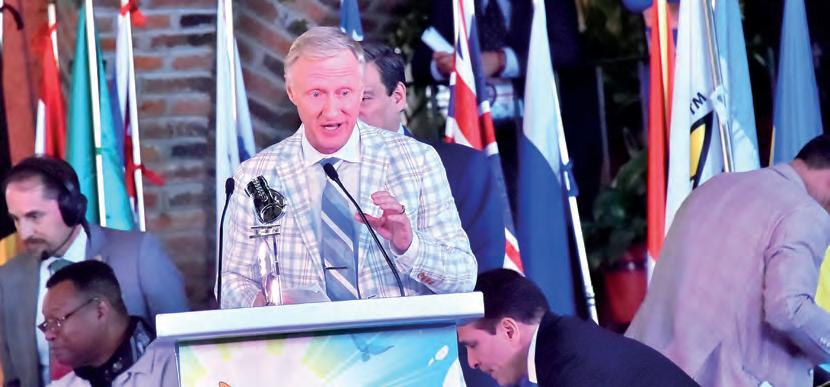
• Nació el 5 de agosto de 1958 en Santa Mónica, California.
• Jimmy es contratado principalmente para los eventos de boxeo de Showtime con Fox Sports ‘Showtime Championship Boxing’ y ‘Premier Boxing Champions’.
• A pesar de desempeñarse principalmente en el boxeo, también ha fungido como presentador en peleas de artes marciales mixtas.
• Es reconocido por su frase “¡It'sShowtime!”
• Fue inducido al Salón Internacional de la Fama del Boxeo en 2013.
“Comencé como anunciador después de terminar la escuela y tenía la encomienda de presentar las primeras peleas de la noche. A pesar de que apenas iniciaba en esto me sentí bastante cobijado, creo que lo más complicado en aquel entonces fue crear mi propio estilo para que los espectadores fueran reconociéndome y no copiar a los demás”, detalló.
Desde entonces, su voz ha sido un componente esencial en algunas de las peleas más icónicas de la historia del boxeo. El presentador aún se dice emocionado y optimista por el estado actual del deporte y por la cantidad de emocionantes combates que hoy se pueden presenciar mediante a los pay per views y el control de grandes organismos internacionales tales como el Consejo Mundial de Boxeo.
Jimmy Lennon Jr. ha dejado una marca indeleble en el mundo del boxeo y más allá. Su voz resuena en la mente de los aficionados como un símbolo de emoción, honor y respeto por el deporte. A medida que continúa su trayectoria en el mundo del boxeo, no hay duda de que seguirá siendo una parte integral de los momentos memorables que definen este emocionante deporte
“He estado como presentador en más de 30 países alrededor del mundo, pero el momento que más me ha impactado fue en la pelea de Julio César Chávez vs Greg Haugen en el Estadio Azteca. La atmósfera que se vivió aquel día es incomparable, la emoción que desprendían tantas personas en aquella pelea es algo que nunca olvidaré”.
@TheClassyJr jimmylenon292e
• Born on August 5, 1958, in Santa Monica, California.
• Jimmy is primarily contracted for boxing events on Showtime with Fox Sports' "Showtime Championship Boxing" and "Premier Boxing Champions."
• Despite mainly working in boxing, he has also served as an announcer in mixed martial arts fights.
• He is recognized for his catchphrase, "It's Showtime!"
• He was inducted into the International Boxing Hall of Fame in 2013.
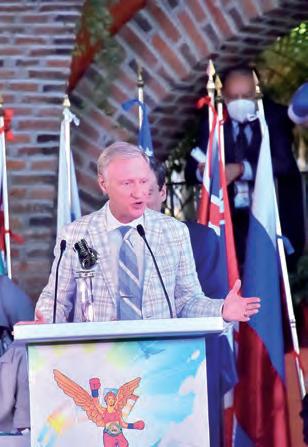
In the thrilling and vibrant boxing world, a voice stands out above all others: Jimmy Lennon Jr. His name is synonymous with epic introductions and unforgettable announcements in the ring, and his presence has left an indelible mark on every major fight. With his unmistakable tone and charismatic style, Lennon Jr. has won the hearts of boxing fans worldwide.
JIMMY LENNON JR. grew up immersed in boxing, thanks to his father's influence, the legendary announcer Jimmy Lennon. Following his father's footsteps, he perfected his ability to present fights with a blend of respect for tradition and infectious energy that thrilled the audience.

"I started as an announcer after finishing school, and my task was to introduce the opening fights of the night. Even though I was starting in this field, I felt quite supported. I think the most challenging part back then was to create my style so that the audience could recognize me and not impersonate others", he explained.
Since then, his voice has been essential in some of the most iconic fights in boxing history. The presenter remains excited and optimistic about the current state of the sport and the multitude of thrilling matches that can now be witnessed through pay-per-view and the control of major international organizations such as the World Boxing Council.
Jimmy Lennon Jr. has left an unforgettable mark on boxing and beyond. His voice resonates in fans' minds as a symbol of excitement, honor, and respect for the sport. As he continues his journey in the boxing world, there's no doubt that he will remain an integral part of the memorable moments that define this exhilarating sport.
Lennon Jr. has been an announcer for over 25 years, during which he has been the voice that kicked off historic bouts like Mike Tyson vs Evander Holyfield, Winky Wright vs Félix Trinidad, and Floyd Mayweather vs Manny Pacquiao.
Lennon Jr. ha sido un presentador por más de 25 años, durante los cuales ha sido la voz que inició combates históricos como Mike Tyson vs Evander Holyfield, Winky Wright vs Félix Trinidad y Floyd Mayweather vs Manny Pacquiao.
"I've been an announcer in more than 30 countries worldwide. However, the moment that impacted me the most was during the Julio César Chávez vs Greg Haugen fight at the Estadio Azteca. The atmosphere on that day is incomparable; the excitement emanating from so many people in that fight is something I'll never forget".
Su debut fue en 2001 en Hawái y desde ese momento su nombre ha ocupado las principales carteleras del boxeo femenil no solo de México sino del mundo; además, el hecho de convertirse en la primera campeona del Consejo Mundial de Boxeo hizo que esta mujer deportista y política se volviera toda una leyenda, su nombre: Jackie Nava.
NACIDA EN Tijuana un 11 de abril de 1980, Jacqueline Nava Mouett, mejor conocida como Jackie Nava, comenzó en el boxeo femenil luego de haber incursionado, con éxito, en varias artes marciales, sin saber que el pugilismo sería la disciplina que la catapultaría a la fama, rompiendo fronteras y abriendo camino para más mujeres que aspiran a brillar en este deporte.
“Yo primero entré a karate, fui también lima-lama, fui campeona en Norteamérica de Kickboxing; a partir de ahí se me se me fue dando una oportunidad en el boxeo porque veían que tenía cualidades, mismas que fui mejorando con el tiempo, hasta llegar a competir por títulos importantes y lograr convertirme en la primera campeona mundial del Consejo Mundial de Boxeo”, comentó Jackie Java.
La carrera de Jackie Nava ha sido ejemplo de disciplina y constancia, sin embargo, la púgil tijuanense acepta que no siempre ha tomado las mejores decisiones respecto a los combates que ha librado.
“Una vez tuve una pelea con Ivonne Muñoz, era 2004 y en ese tiempo yo no tenía muchas peleas, entonces acepté, pero ella llegó 4 kilos arriba en el pesaje. En ese momento yo no tenía que haber agarrado la pelea. Recuerdo que empatamos, pero yo salí muy lastimada”.
Para Nava, la clave para ser una campeona es “la perseverancia, el amor a lo que haces y la disciplina”.
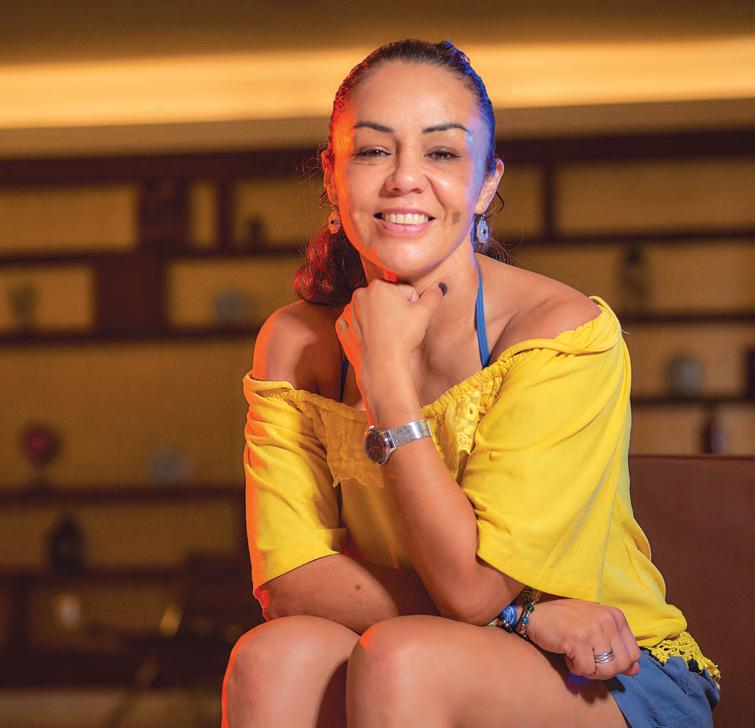
Y fue justamente esta combinación de factores los que hicieron que el 15 de junio de 2021 el Consejo Mundial de Boxeo (WBC) le rindiera homenaje y le obsequiara un cinturón de campeona mundial especialmente diseñado con el número 20, en referencia a sus dos décadas como boxeadora.
Al respecto, Jackie Nava se dijo muy contenta de siempre haber tenido y tener el respaldo del WBC y de la familia Sulaimán. “No puedo estar más que agradecida con el Consejo, a mí me dieron la oportunidad de pelear por el primer Campeonato Mundial y lo aproveché y a partir de ahí empezaba una historia, empezaba un legado. Fueron 23 peleas hasta que perdí el campeonato y de a partir de ahí volví a buscarlo otra vez”.
Para esta boxeadora de 43 años el retiro no significa estar lejos del ring, sino seguir abriendo camino para nuevas generaciones.
“Ahora estamos manejando boxeadores, tenemos cuatro con muy buena madera y los estamos preparando para que lleguen lejos, pero todo lleva tiempo porque así es el boxeo. Además, traemos conferencias y traigo un tema que se llama ‘Miedo’, aunque no es el nombre oficial, pero tiene que ver mucho con el miedo porque es un tema que me marcó mucho en mi carrera y que le puede marcar a cualquier persona en la vida”.
Her debut was in 2001 in Hawaii, and since that moment, her name has adorned the marquee events of women's boxing in Mexico and worldwide. Moreover, becoming the very first world champion of the World Boxing Council catapulted this athlete and politician into the realm of legend—her name: Jackie Nava.

BORN IN Tijuana on April 11, 1980, Jacqueline Nava Mouett, better known as Jackie Nava, ventured into women's boxing after successfully exploring several martial arts. Little did she know that boxing would be the discipline to propel her to fame, breaking boundaries and paving the way for more women aspiring to shine in this sport.
"I initially got into karate, tried my hand at lima-lama, and became a North American kickbox champion. From there, I was given an opportunity in boxing because they saw potential in me, qualities I honed over time, eventually competing for significant titles and achieving the distinction of becoming the first world champion of the World Boxing Council", recounted Jackie Nava.
Jackie Nava's career has been a testament to discipline and perseverance. Nevertheless, the Tijuana-born pugilist admits that she has sometimes not made the best decisions regarding the bouts she's contested.
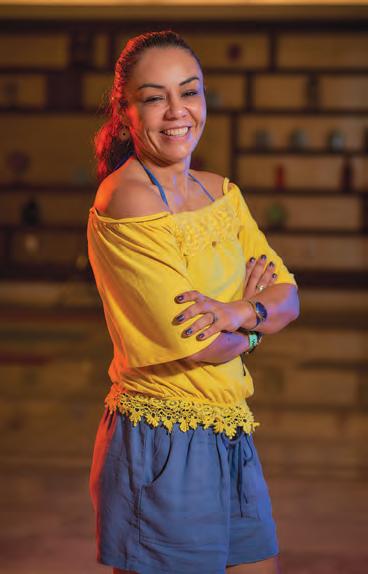
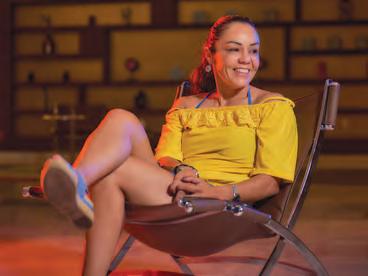
"Once, I fought with Ivonne Muñoz in 2004. At that time, I didn't have many fights, so I accepted. However, she showed up four kilograms over the weight limit at the weigh-in. Looking back, I shouldn't have taken that fight. We ended up with a draw, but I came out of it severely injured".
Nava's key to being a champion is "perseverance, a passion for what you do, and discipline".
This combination of factors led to the World Boxing Council (WBC) paying tribute to her on June 15, 2021, presenting her with a specially designed championship belt with the number 20, commemorating her two decades as a boxer.
Regarding this, Jackie Nava expressed her immense gratitude for always having had and continuing to have the support of the WBC and the Sulaimán family. "I couldn't be more thankful to the Council. They allowed me to fight for the first World Championship, and I seized it. That's where a story began; a legacy was born. I had 23 fights until I lost the championship, and from there, I set out to reclaim it".
For this 43-year-old boxer, retirement doesn't mean staying away from the ring. It means continuing to pave the way for new generations.
"Now we're managing boxers, we have four with great potential, and we're training them to go far. But everything takes time because that's how boxing works. Additionally, we're holding conferences, and I'm addressing a theme called 'Fear.' It might not be the official name, but it's about fear because it's a topic that profoundly impacted my career and can resonate with anyone in life".
Previo a su llegada al mundo del boxeo, trabajaba en una carnicería con su papá, sin embargo, en sus tiempos libres y teniendo tan solo nueve años, comenzó a emprender su camino en búsqueda de lo que él sabía que aceleraba su pasión. Fue así que con el paso de los años, se convirtió en una leyenda del boxeo mexicano con más de 46 peleas en el ring, colocándose como campeón mundial minimosca en cuatro ocasiones.
Boxeo lo ha acompañado a lo largo de su recorrido, siendo así una pieza clave de su éxito. “Cuando yo quería un título mundial, buscaba ese cinturón del Consejo Mundial de Boxeo, lo veía en la tele y aspiraba a ser campeón de esa enorme organización y cuando me dieron la oportunidad, tenía ansias de tenerlo. Ahora, cada vez que hay alguna convención del Consejo, estamos presentes, ellos siempre nos han tomado en cuenta y se preocupan por nosotros”.
Ahora los planes han marcado otro rumbo, su carrera como boxeador quedará marcada en la historia y Humberto “Chiquita” González, ha emprendido nuevos caminos. “Después de retirarme, me he dedicado a hacer negocios, a formarme y prosperar en los mismos. Por lo
DENTRO DE SUS memorias, Humberto “Chiquita” González, atesora los momentos en los que desde pequeño veía las peleas de boxeo en la televisión cada sábado junto con su papá y entre tantos comentaristas y peleadores comenzaba a tener a sus ídolos, entre ellos Pipino Cuevas, con quien ahora sostiene una gran relación.
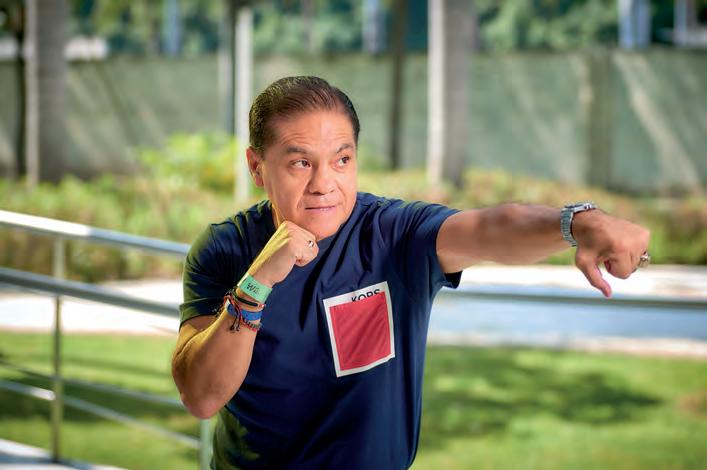
Su papá, al ver su determinación de ir al gimnasio estando tan pequeño, comenzó a tener cierto temor, por lo que en una ocasión lo encargó con un sobrino para que lo acompañara; sin saberlo, eso fue el inicio de una aventura que dio marcha a su ca-
rrera. “Con tal de que no me perdiera, mi papá mandó a mi primo para que me acompañara a ir al gimnasio en metro y sin querer llegamos a otro gimnasio que no era, pero llegando ahí, fue donde me encontré a Pipino Cuevas y a “El gato” González. Ellos me vieron entrenar y por eso me quede ahí. “El Gato” González ya me conocía, sabía mi manera de pelear y fue quien reconoció mi potencial, por lo que me pusieron a boxear y esos fueron mis inicios”.
Como parte fundamental de su evolución, el Consejo Mundial de
“Mis grandes retos fueron llegando conforme avanzaba mi carrera, eran nuevos campeonatos, cinturones, trofeos y mi mente siempre estuvo enfocada en ganar un título mundial y lo logré”.
que a todos los jóvenes que están en búsqueda de iniciar su camino en el boxeo, les diría que se dediquen, que le echen ganas y que entrenar bien, como debe de ser, con toda la preparación, porque si quieren ser campeones mundiales, se requiere disciplina al 100%”.
@ChiquitaGlzBefore entering the boxing world, he worked at a butcher shop with his father. However, during his free time and at just nine years old, he began his journey in pursuit of what he knew fueled his passion. Over the years, he became a legend in Mexican boxing with more than 46 fights in the ring, achieving the title of light flyweight world champion on four occasions.
AMONG HIS memories, Humberto "Chiquita" González cherishes the moments when he used to watch boxing matches on television every Saturday with his father. Amidst various commentators and fighters, he began to have his idols, including Pipino Cuevas, with whom he now shares a strong bond. Seeing his determination to go to the gym at such a young age, his father started to worry. In one instance, he entrusted him to a cousin to accompany him. Unbeknownst to them, that marked the beginning of an adventure that set his career in motion. "To ensure I wouldn't get lost, my dad sent my cousin to accompany me to the gym by metro. Unintentionally, we ended up at a different gym. But when we arrived, I met Pipino Cuevas and 'El Gato' González. They saw me training, and that's why I stayed. 'El Gato' González already knew me, understood my fighting style, and he recognized my potential. They set me to box, and that's how I began".
As an essential part of his journey, the World Boxing Council (WBC) has been by his side, playing a crucial role in his success. "When I wanted a world title, I aimed for that

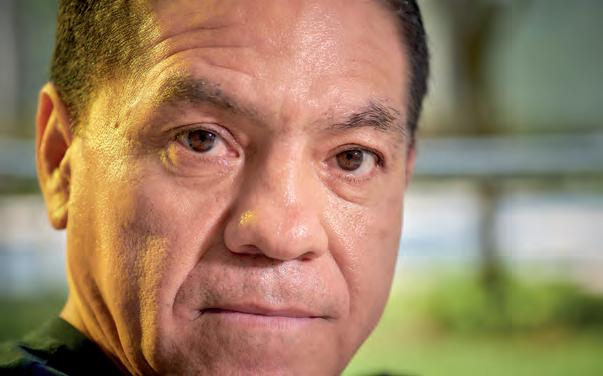
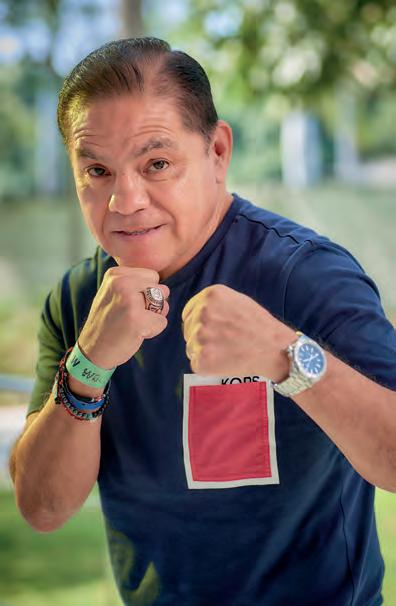
WBC belt. I saw it on TV and aspired to become a champion of that prestigious organization. When I got the opportunity, I was eager to have it. Now, whenever there's a WBC convention, we're there. They've always considered us and cared for us".
Now, the plans have taken a different direction. His boxing career will be etched in history, and Humberto "Chiquita" González has embarked on new paths. "After retiring, I've dedicated myself to business, self-improvement, and thriving in my ventures. To all the young people looking to start their journey in boxing, I'd say: dedicate yourselves, give it your all, train properly with thorough preparation, because if you want to be world champions, 100% discipline is required".
"My significant challenges arose as my career progressed— new championships, belts, trophies. I always focused on winning a world title, and I achieved it".
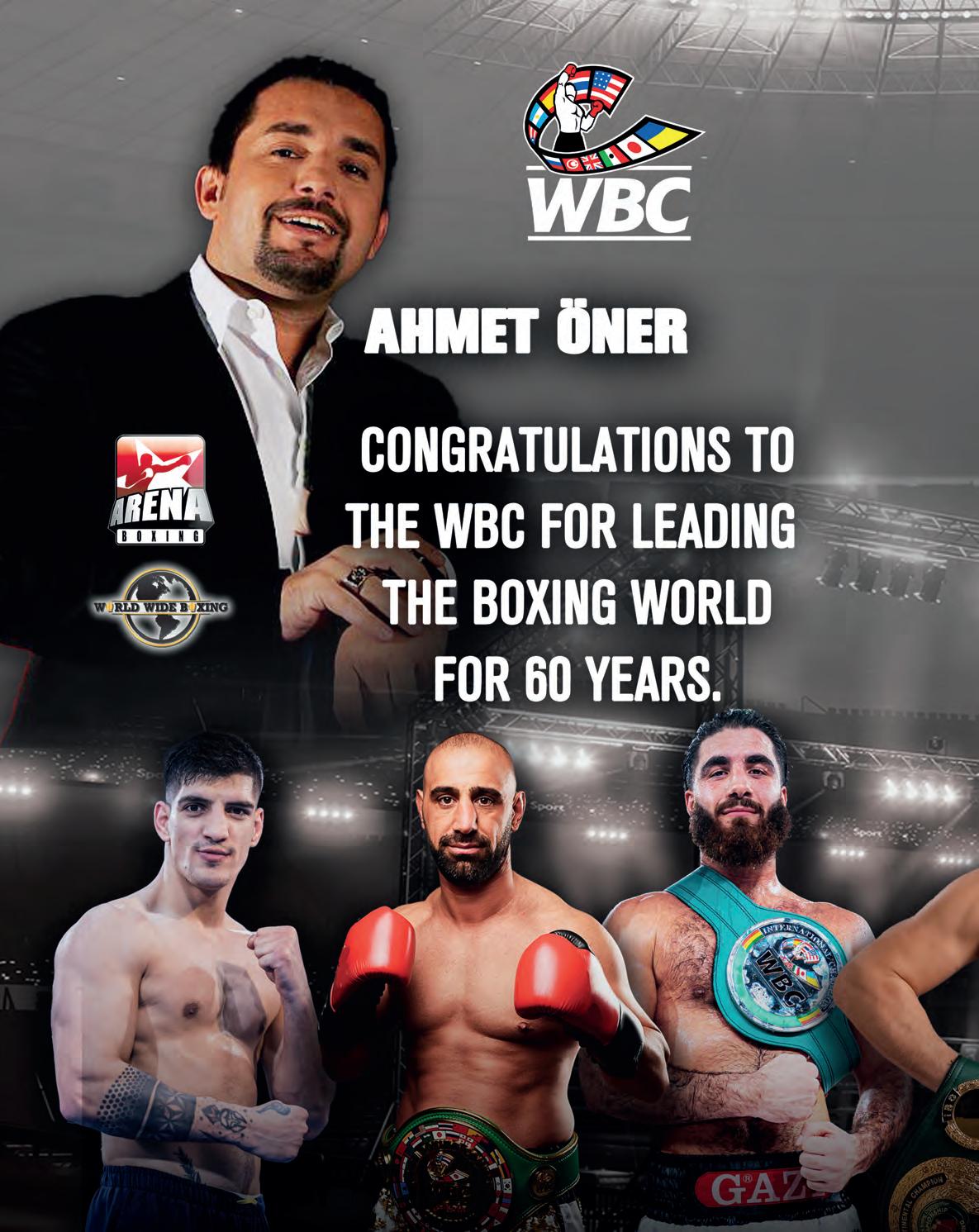
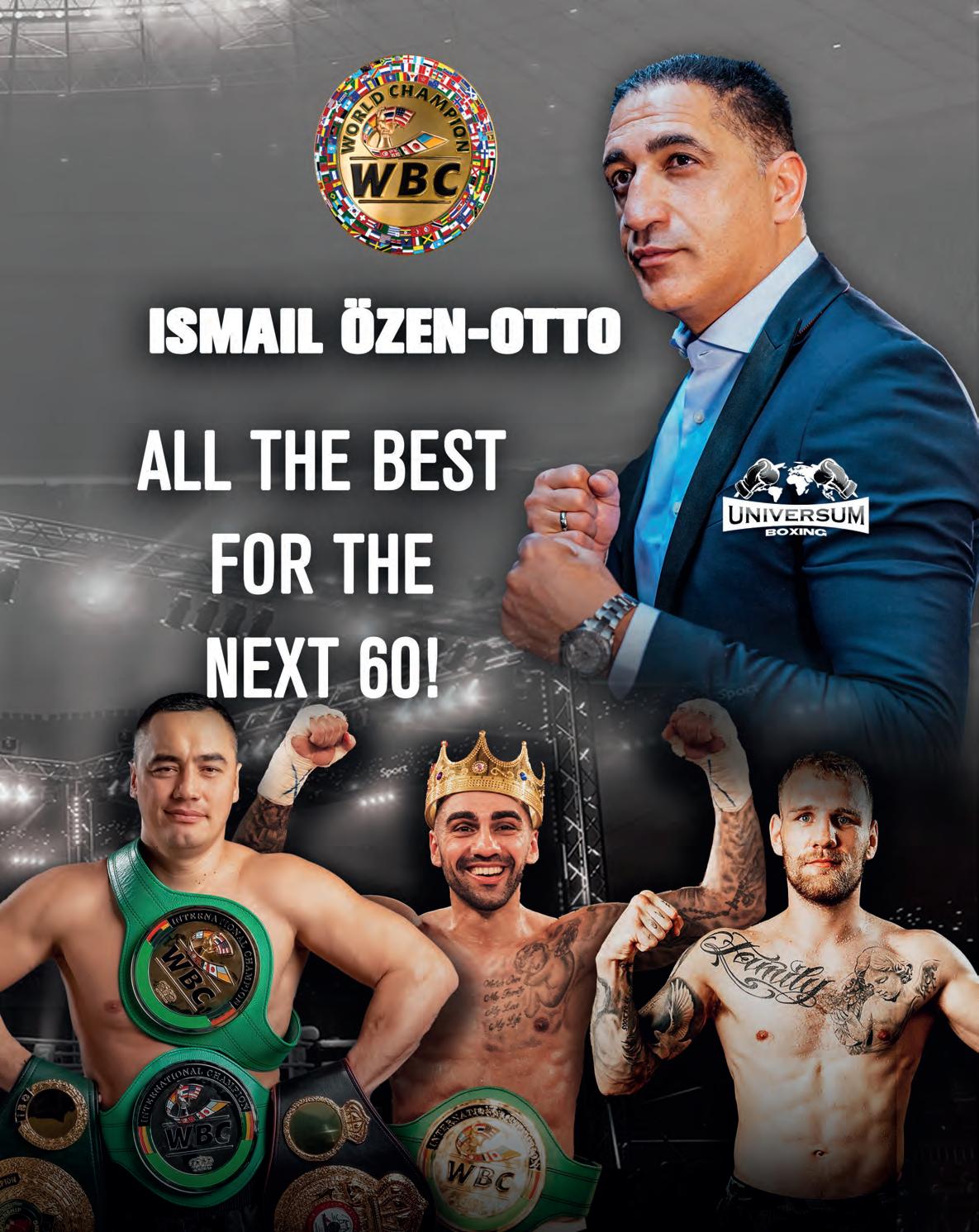
El 22 de mayo de 1998 en una pelea de infarto, María Anastasia Juárez Trejo, mejor conocida como Mariana “Barby” Juárez, debutó en un cuadrilátero capitalino venciendo por nocaut en el segundo asalto a Virginia Esparza, iniciando con ello, una nueva era en el boxeo mexicano en el que las mujeres cobraron fuerza y relevancia.
LAS GANAS de aprender defensa personal fueron las que llevaron a Mariana “Barby” Juárez a ponerse por primera vez unos guantes de boxeo, sin saber que ese primer momento marcaría el inicio de un romance que la llevaría a ser conocida en todo el mundo como una de las mejores boxeadoras a nivel mundial.
“Cuando pisé por primera vez un gimnasio me enamoré por completo del boxeo. Este deporte, además de aprender a defenderme de forma personal, me ayudó a sortear situaciones complicadas que en ese momento vivía en casa”, expresó la excampeona de peso mosca y gallo.
La Barby, que tiene un registro de 72 peleas profesionales, con una marca de 55 victorias, 13 derrotas y 4 empates, teniendo 19 triunfos por nocaut, es una de las máximas impulsoras del boxeo femenil no solo en México, sino en el mundo.
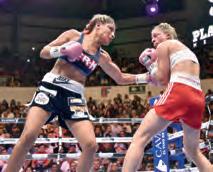
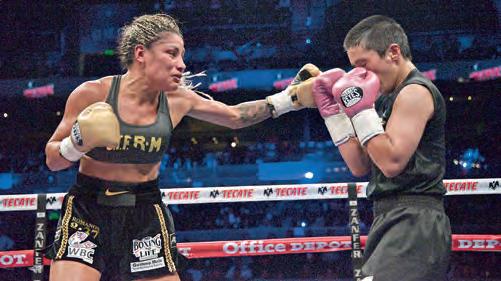
“Es increíble que la gente reconozca mi labor, yo creo que se ha hecho un gran trabajo en equipo, varias de mis compañeras y yo hemos trabajado muy fuerte, tirando esas puertas que no nos querían abrir para hacer que el boxeo fuera una realidad; lograr que el boxeo femenil fuera aceptado en la Ciudad de México y así abrir las puertas hacia más estados y lograr con ello que más mujeres pudieran pisar un gimnasio y practicar este hermoso deporte”.
Agregó que hoy la llena de orgullo saber que ya reconocen que el boxeo no solo es un deporte de hombres, “que reconozcan que una mujer puede practicarlo, que en los gimnasios ya haya baño para mujeres, cosa que antes no existía. Creo que es increíble poder ver la evolución del boxeo femenil”.
A la pregunta expresa de qué se necesita para ser una gran campeona, Mariana Juárez aseguró que “es realmente creerlo, el tener ese deseo de hacerlo, trabajar muy fuerte por que el boxeo es un deporte que exige disciplina y compromiso, entonces si realmente quieres meterte en este deporte, necesitas meterte al 100 y saber que eso conlleva varios sacrificios”.
DE CASTA CAMPEONA
• 72 peleas profesionales
• 55 victorias
• 13 derrotas
• 4 empates
• 19 triunfos por nocaut
CHAMPION'S HERITAGE
• 72 professional fights
• 55 victories
• 13 losses
• 4 draws
• 19 wins by knockout
Para la Barby el boxeo es todo en su vida y se dice satisfecha de lo que ha logrado y espera pronto obtener el Campeonato Mundial de Supergallo, además de agradecer a gente como Don José Sulaimán (QEPD) por el gran apoyo que le dio a este deporte y a las mujeres que deseaban ser parte de él.
“Don José Sulaimán fue el primero que impulsó el boxeo femenil; no solo nos ayudó a que se aceptara, sino que buscó que las mujeres estuvieran protegidas dentro de este deporte, logró que los rounds duraran dos minutos y que solo fueran 10 roundspor causas que se estudiaron a nivel médico. Entonces yo creo que Don José ha sido el principal promotor del boxeo femenil, pero realmente cuidado”.
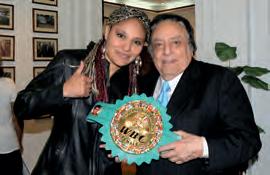
• 14 de noviembre de 2004
Derrotó por decisión mayoritaria a la coreana In-Young Lee y obtuvo el título supermosca de la Federación Internacional de Boxeo Femenino.
• 30 de marzo de 2005
En su primera defensa ante la norcoreana Myung Ok Ryu, quien la noqueó en 10 asaltos
• 5 de junio de 2009.-
Ganó el cinturón interino de peso mosca del WBC al derrotar a Irma Sánchez por decisión unánime.
• 11 de marzo de 2011
Derrotó por decisión a Simona Galassi por el título absoluto de peso mosca del WBC.
• 13 de octubre de 2012
Cayó por decisión ante Ava Knight cuando disputaban el cinturón de peso mosca WBC diamante.
• 1 de abril de 2017
Derrotó a la africana Catherine Phiri y se apoderó del título gallo del WBC, en el Zócalo de la Ciudad de México.
• 31 de octubre de 2020
La mexicana Yulihan Cobrita Luna la derrotó por decisión unánime y le arrebató el título de peso gallo del Consejo Mundial de Boxeo.
• November 14, 2004
Defeated South Korean In-Young Lee by majority decision, securing the International Boxing Federation super flyweight title.
• March 30, 2005
She faced North Korean Myung Ok Ryu in her first defense, who knocked her out in 10 rounds.
• June 5, 2009
Captured the interim WBC flyweight title by defeating Irma Sánchez unanimously.
• March 11, 2011
Defeated Simona Galassi by decision for the absolute WBC flyweight title.
• October 13, 2012
Lost by decision to Ava Knight in their WBC diamond flyweight belt bout.
• April 1, 2017
Defeated African fighter Catherine Phiri, claiming the WBC bantamweight title in Mexico City's Zócalo.
• October 31, 2020
Lost by unanimous decision to Yulihan Cobrita Luna, surrendering her CMB bantamweight title.
@barbyjuarezOn May 22nd, 1998, in a thrilling bout, María Anastasia Juárez Trejo, better known as Mariana "Barby" Juárez, debuted in a Mexico City boxing ring, knocking out Virginia Esparza in the second round, marking the beginning of a new era in Mexican boxing, where women gained strength and prominence.
THE DESIRE to learn self-defense led Mariana "Barby" Juárez to put on boxing gloves for the first time, not knowing that this initial moment would start a love affair that would make her known worldwide as one of the best female boxers.
"When I stepped into a gym for the first time, I fell in love with boxing. Besides teaching me personal defense, this sport helped me navigate challenging situations I was facing at home", expressed the former flyweight and bantamweight champion.
The Barby, with a professional record of 72 fights, boasting 55 victories, 13 losses, and 4 draws, with 19 wins by knockout, is a leading advocate for women's boxing in Mexico and globally.
"It's incredible that people recognize my work. I believe teamwork has been great. Several of my colleagues and I have worked very hard, knocking down doors that didn't want to open for us, making women's boxing a reality. Accepting women's boxing in Mexico City and opening doors to more states, allowing more women to step into a gym and practice this beautiful sport".
She added that she takes pride in knowing that people now acknowledge that boxing isn't just a sport for men, "recognizing that a woman can practice it, that gyms now have bathrooms for women, something that didn't exist before. I think it's incredible to witness the evolution of women's boxing".
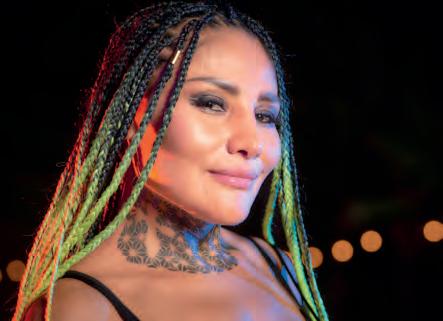
To the direct question of what it takes to become a grand champion, Mariana Juárez asserted, "It's truly about believing it, having that desire to achieve it, working very hard because boxing demands discipline and commitment. So, to get into this sport, you need to give it your all and understand that it comes with sacrifices".
For Barby, boxing is everything in her life, and she's satisfied with what she has achieved. She hopes to win the Super Bantamweight World Championship soon. She also expressed gratitude towards individuals like Don José Sulaimán (RIP) for the significant support he provided to this sport and women who wanted to participate.
"Don José Sulaimán was the first to promote women's boxing; he helped it be accepted and ensured women's protection in this sport. He made rounds last two minutes and limited them to 10 rounds for medical reasons. So, I believe that Don José has been the primary promoter of women's boxing and truly caring".
Desde 1990 hasta 2014, José Luis Castillo, disputó su carrera como uno de los boxeadores más emblemáticos, logrando acumular 66 victorias a lo largo de su trayectoria. El apodado “El Temible” llegó a convertirse en campeón mundial del Consejo Mundial de Boxeo (WBC) en la categoría de peso ligero en el 2000.
SU TENACIDAD y empeño lo han colocado a través de los años como uno de los mejores en su deporte. Sus inicios se remontan a la gran conexión que sintió con este mundo, gracias a que desde muy pequeño observó a su papá boxeando, por lo cual, siempre tuvo en mente seguir sus pasos. Cuando José Luis tenía 12 años, comenzaba a identificar a sus ídolos que, junto con su padre, hicieron que su pasión fuera en ascenso. “Campeones como Julio César Chávez y José Luis Ramírez sonaban en ese momento y yo recuerdo que los veía y anhelaba ser como ellos”. Sin saber que, en un futuro, Castillo llegaría a ser sparring de Julio César Chávez por algún tiempo.
Con el paso del tiempo, el boxeo se ha transformado y llegado a nuevos lugares. Como parte de ese crecimiento, el Consejo Mundial de Boxeo ha sido participe de importantes cambios, como la decisión de Don José Sulaimán de pasar de 15 a 12 rounds, algo muy positivo en beneficio del boxeador. “Sin duda son una familia que han seguido el importante legado de Don José Sulaiman, y nosotros lo valora-
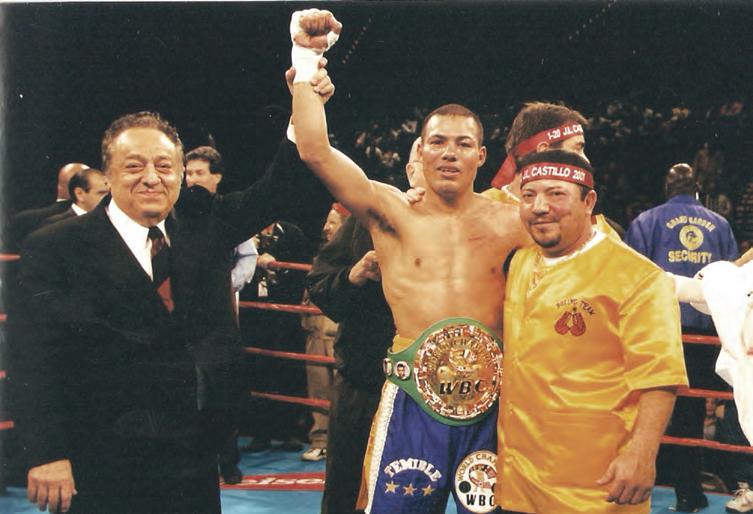
Dedicación y empeño, son los elementos que José Luis considera vitales para la formación y el éxito de cualquier boxeador que esté iniciando y busque sobresalir.
mos y mantenemos una gran relación con ellos, porque nos han ayudado a abrir muchas puertas”.
Todas las peleas han dejado en José Luis una gran lección, sin embargo, aunque se trate de su gran pasión, también han existido momentos enrevesados. “He tenido peleas en donde por decisión de los jueces he perdido, pero ante los ojos de la gente he ganado, así que a pesar de que hubo momentos que me marcaron como boxeador, en donde en ocasiones la frustración gana al pensar que dedicas tanto esfuerzo,
Nació el 14 de diciembre de 1973 en Empalme, Sonora. Recibío el apodo de "El Temible", por su gran poder en el cuadrilatero.
sacrificas tiempo con tu familia, y el resultado no es el esperado, que sin duda es un momento muy difícil, pero he preferido quedarme con la parte objetiva y disfrutar de todo”.
El boxeo se colocó como un gran actor en su vida, ayudándolo a marcar un legado que permanecerá por muchos años más. “Yo me voy del boxeo pleno, satisfecho y contento por haber logrado todo lo que en algún momento soñé. Gracias a ello, he podido dedicarme actualmente a la política, ese es mi siguiente proyecto para lograr ser candidato a presidente municipal de Empalme, mi lugar de nacimiento y hacia allá apunta mi proyecto para 2024”, finalizó.
“Dedicación, amor y constancia harán que el objetivo que tengas, quede cada vez más cerca”.
Dedication and determination are the elements José Luis considers vital for the training and success of any young boxer starting and seeking to excel.
He was born on December 14, 1973 in Empalme, Sonora. He received the nickname "El Temible" for his great power in the ring.
From 1990 to 2014, José Luis Castillo carved his path as one of the most iconic boxers, amassing 66 victories throughout his career. Nicknamed "El Temible" (The Fearful), he rose to become the World Boxing Council (WBC) lightweight champion in 2000.
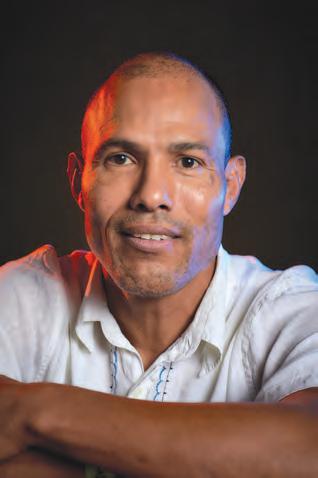
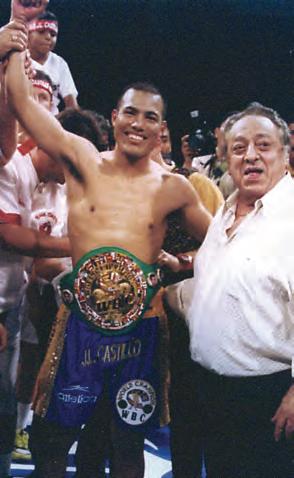

HIS TENACITY and determination have positioned him as one of the best in his sport.
His journey traces back to his profound connection with the boxing world, inspired by watching his father box from a young age; this planted the seed to follow in his father's footsteps. At the age of 12, José Luis began to identify his idols, and they fueled his growing passion alongside his father. "Champions like Julio César Chávez and José Luis Ramírez were prominent at that time, and I remember watching them and aspiring to be like them". Little did José Luis know that he would became Julio César Chávez sparring partner for a period.
Over time, boxing has transformed and reached new horizons. As part of this growth, the World Boxing Council has participated in significant changes, such as Don José Sulaimán's decision to reduce rounds from 15 to 12, a positive change benefiting the boxers. "Without a doubt, they are a family that has continued Don José Sulaimán's important legacy, and we appreciate and maintain a strong relationship with them because they've helped us open many doors".
Every fight has left José Luis with valuable lessons. However, despite his deep passion, there have been challenging moments. "I've had fights where I lost by judges' decision, but in the eyes of the public, I've won. So, despite the moments that marked me as a boxer, where frustration sometimes overpowers you, knowing that you invest so much effort, sacrifice time with your family, and the outcome isn't what you hoped for, it's undoubtedly a tough moment. But I've chosen to focus on the objective aspect and enjoy it all".
Boxing became a significant player in his life, helping him leave a legacy that will endure for many more years. "I leave boxing fulfilled, satisfied, and glad for achieving everything I once dreamed of. Thanks to that, I've been able to engage in politics. That's my next project – to run as a candidate for the mayor of Empalme, my hometown, and that's where my 2024 project is aimed", he concluded.
"Dedication, love, and persistence will bring your goals closer with each step".
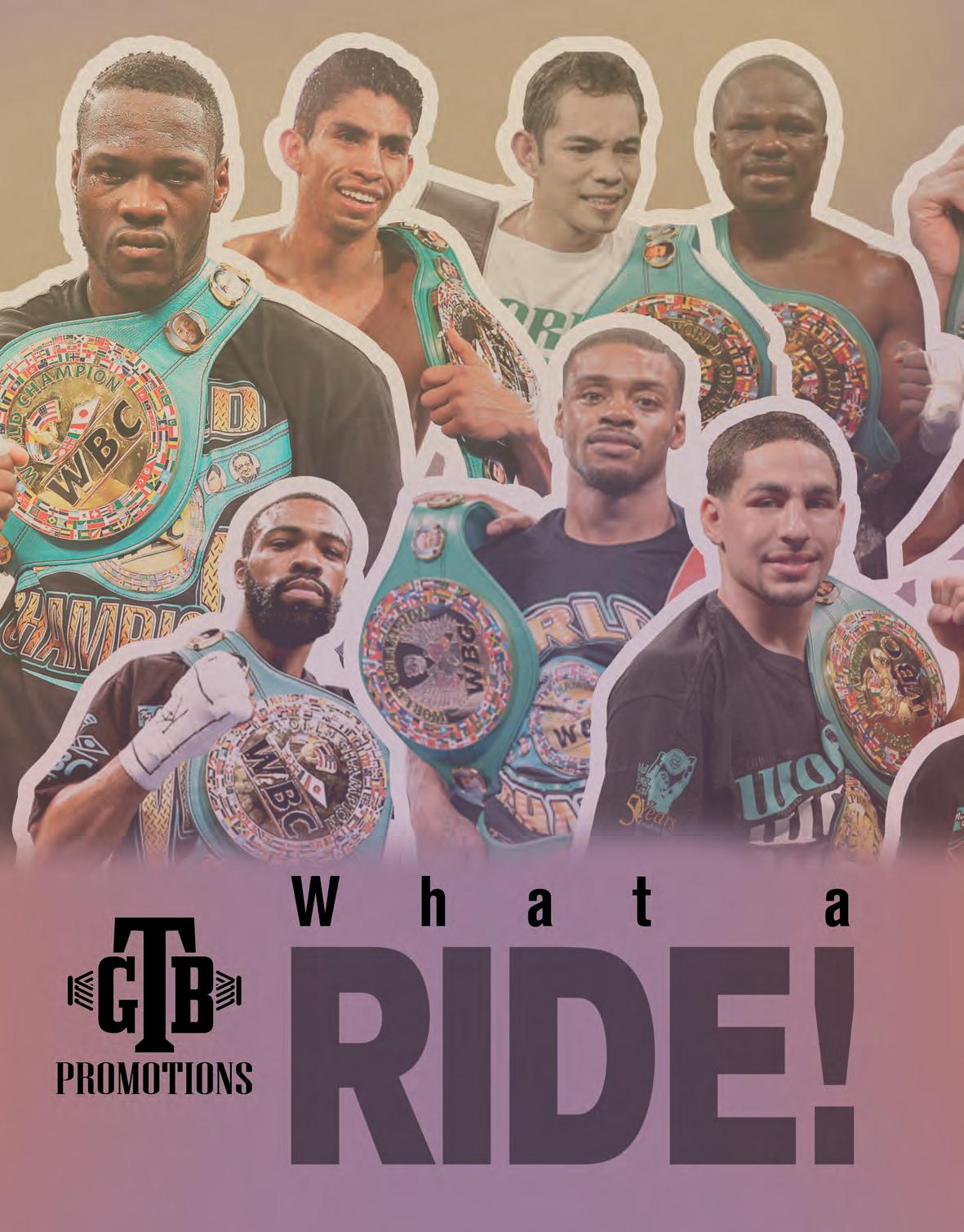

En el mundo del boxeo, pocos nombres resuenan con tanta fuerza como el de Mia St. John. Sin embargo, su impacto y legado trascienden el cuadrilátero, ya que esta notable deportista ha demostrado ser una verdadera luchadora dentro y fuera del ring. Su vida y trayectoria son un testimonio de resiliencia y superación personal.
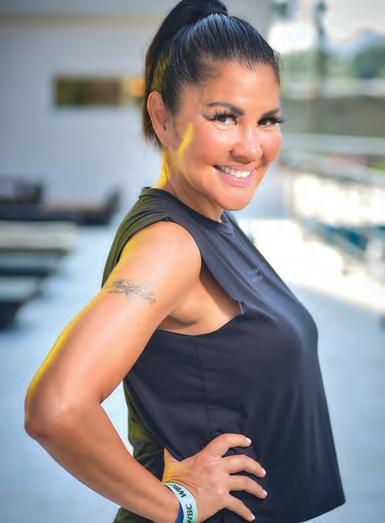
MIA ROSALES St. John, nacida el 24 de junio de 1967 en San Francisco, California, se convirtió en una pionera en su campo, abriendo camino para las mujeres en un deporte que históricamente había estado dominado por hombres. La también empresaria logró sobresalir a las adversidades que enfrentó en aquel momento, como la discriminación por su origen latino y al ser catalogada como una peleadora débil bajo el mote “Bunny Boxer” por su participación como modelo.
Uno de los mejores momentos de la boxeadora y que hizo que obtuviera el respeto de muchos críticos en la industria fue poder derrotar a Christy Martin, quien en ese momento era campeona mundial, además de que gozaba de un intimidante prestigio como una de las peleadoras más duras del boxeo femenino.
“Anteriormente, la había enfrentado y me había derrotado, fue un momento clave dentro de mi carrera porque tuve que poner mucho trabajo para esa pelea y demostrarles a mis detractores que se equivocaban. Además de que gracias a esa victoria me convertí en campeona
mundial, eso me dio muchas oportunidades en el boxeo”, comentó la también empresaria.
La boxeadora de ascendencia mexicana refirió que ser campeona de un organismo como el Consejo Mundial de Boxeo también le abrió muchas puertas abajo del ring porque pudo realizar muchos viajes alrededor del mundo y empezar con su propio negocio, factor que la ayudó a tener una vida plena después del retiro.
La versatilidad y el coraje de Mia St. John también la llevaron a desafiar los límites del deporte al incursionar en otros campos, como el modelaje y la actuación. Su incansable dedicación a la defensa de la salud mental y la conciencia sobre las enfermedades mentales la ha convertido en una voz influyente en el mundo de la salud.
Su Fundación ‘El Saber es Poder’, se ha convertido en un faro de esperanza para individuos y familias afectados por enfermedades mentales y con pocas oportunidades. A través de programas educativos y de apoyo, la fundación busca brindar recursos y herramientas para enfrentar estos desafíos y buscar ayuda cuando sea necesario.
• Ha enfrentado boxeadoras de gran nivel como Christy Martin, Jennifer Alcorn, Jessica Rakoczy, Holly Holm y Jelena Mrdjenovich.
• Mia además de sus esfuerzos profesionales, creó la fundación
“El Saber es Poder” que ayuda a jóvenes latinos y promueve la importancia de la salud mental, la educación, la autohablitación y la familia.
• Se coronó como campeona del Consejo Mundial de Boxeo en la categoría superwelter
•Se desempeñó en el modelaje y actualmente maneja sus propias empresas.
• Estudió psicología en la Universidad Estatal de Northridge en California.
•Su récord profesional se encuentra con 65 peleas consiguiendo 49 victorias.
“Me convertí en lo que soy gracias a que recibí una educación universitaria, mi madre era mexicana, pero me crió en los Estados Unidos. Ella insistía en que me trajo para brindarme una mejor oportunidad al recibir estudios”.
In boxing, few names resonate as strongly as Mia St. John. However, her impact and legacy extend beyond the boxing ring, as this remarkable athlete has proven to be a true fighter inside and outside the ring. Her life and journey are a testament to resilience and personal triumph.
MIA ROSALES St. John, born on June 24, 1967, in San Francisco, California, became a trailblazer in her field, paving the way for women in a sport historically dominated by men. The entrepreneur also managed to overcome the adversities she faced at the time, including discrimination due to her Latin heritage and being labeled a weak fighter under the nickname "Bunny Boxer" because of her modeling involvement.
One of the boxer's defining moments, which earned her the respect of many industry critics, was her victory over Christy Martin, who was then the reigning world champion and carried a formidable reputation as one of the toughest female boxers.
"I had faced her before, and she had defeated me. It was a pivotal moment in my career because I had to work hard for that fight and prove my detractors wrong. And thanks to that victory, I became a world champion, opening up many opportunities in boxing", stated the entrepreneur and boxer.
The Mexican-American boxer mentioned that being a champion of an organization like the World Boxing Council (WBC) also opened doors for her outside the ring. This allowed her to travel worldwide and start her own business, contributing to a fulfilling life after retirement.
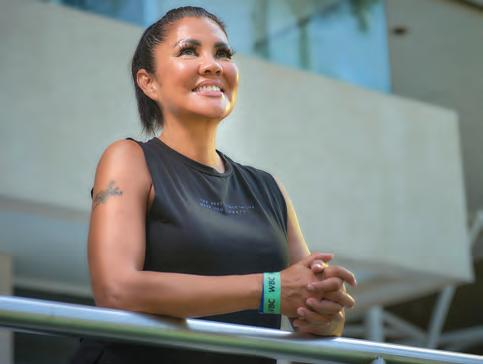
Mia St. John's versatility and courage also led her to push the boundaries of the sport by venturing into other fields, such as modeling and acting. Her tireless dedication to advocating for mental health awareness and consciousness about mental illnesses has made her an influential voice in healthcare.
Her foundation, 'El Saber es Poder' (Knowledge is Power), has become a beacon of hope for individuals and families affected by mental illnesses and limited opportunities. Through educational and support programs, the foundation aims to provide resources and tools to face these challenges and seek help when needed.
• Faced high-level boxers such as Christy Martin, Jennifer Alcorn, Jessica Rakoczy, Holly Holm, and Jelena Mrdjenovich.
• In addition to her professional endeavors, Mia founded the "El Saber es Poder" foundation, which assists young Latinos and promotes the importance of mental health, education, selfempowerment, and family.
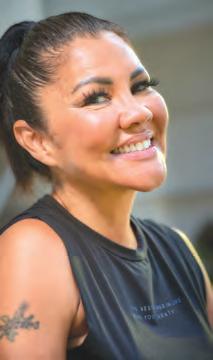
• Won the World Boxing Council championship in the superwelter category.
• Engaged in modeling and currently manages her businesses.
• Studied psychology at California State University, Northridge.
• Her professional record includes 65 fights with 49 victories.
"I became who I am because I received a college education. My mother was Mexican, but she raised me in the United States. She insisted that she brought me here to provide better opportunities through education".
KNOCKOUT ARTIST
Marcela Ramos Cortesía Luis E. González Traducción: Mariana Torres
Es una de las pioneras del boxeo de mujeres a nivel profesional. Sus contundentes golpes la convirtieron en una reina del cuadrilátero y fue la primera mujer promovida por el legendario Don King. Su estilo de pelea capturó la atención de tal manera que incluso aquellos que menospreciaban el boxeo femenil, encontraron en ella, una fuente de disfrute.
LA HISTORIA DE Salters, más reconocida como ‘Christy Martin’, se cuenta entre las más asombrosas. En su debut en el ring, sin siquiera haber recibido entrenamiento formal en el boxeo, logró noquear a su oponente. Durante la época en la que Mike Tyson cautivaba al público, en el ámbito de las peleas de mujeres, ella encarnaba la figura de Tyson.
“Me considero muy afortunada por haber sido la primera en alcanzar la exposición que ninguna otra boxeadora había experimentado. Don King fue mi promotor, peleé en Showtime, compartiendo espacio con Mike Tyson y literalmente todo el mundo estaba sintonizando”.
En 1993, la apodada 'Hija del minero de carbón' ganó su primer cinturón, pero su incursión en un deporte pre -
• En 2012, tuvo su última pelea, perdió contra Mia St. Johns, lo que la dejó con un récord de 59 peleas en donde tenía 49 victorias, de las cuales, 32 eran por nocaut.
• Una de las peleas más vista en la historia del boxeo de mujeres fue la que sostuvo que con Laila Ali. Christy Martin era la mujer más espectacular del boxeo y Laila Ali era la invicta hija del gran Muhammad Ali.
• En 2010, su entrenador y esposo, intentó poner fin a la trayectoria pugilística de manera trágica.
dominantemente masculino le acarreó mucha discriminación. “A menudo me encontraba en situaciones difíciles. Los médicos no querían hacerme los exámenes físicos y los camerinos eran el armario del conserje. Las burlas y los insultos eran constantes. Sin embargo, cada vez que enfrentaba críticas y escuchaba que no podría lograrlo, encontraba la determinación para alcanzar mis objetivos”.
Con el tiempo, se ganó el respeto no solo de la gente sino también de sus colegas. “Los chicos me miraban con escepticismo, preguntándose ‘por qué está ella aquí’, pero me veían entrenar, peleaban conmigo y poco a poco me gané su respeto y su apoyo a medida que mi carrera crecía. Sentí que tenía una buena conexión con los fanáticos del boxeo mexicano. Uno de mis peleadores favoritos era Julio César Chávez”.
La forma en la que la cobijó el Consejo es algo que Christy tiene muy presente. “José Sulaimán me tomó bajo el ala del WBC e incluso me nombró campeona honoraria, así que tenía tantas cosas que funcionaban positivamente para mí, tuve que entrenar muy duro todos los días, porque no quería defraudar a nadie”.
Actualmente, Salters fundó la organización sin fines de lucro Christy's Champs, la cual apoya la concientización sobre la violencia doméstica, misma de la que ella fue víctima. “Intentamos con todas nuestras promociones de boxeo, llamar la atención sobre
Rompió estereotipos al ser la primera mujer parte de una cartelera en PayPer View.La mujer con más nocauts del boxeo mundial y la primera mujer en salir en la revista SportIllustrated.

“No podría escoger un recuerdo de mi carrera en el boxeo, pelear a la par de Mike Tyson, ser promovida por Don King, la portada de Sports Illustrated o cuando José Sulaimán me puso ese cinturón verde alrededor de mi cintura”.
la violencia doméstica para que la gente sea más consciente con lo que sucede a su alrededor”.
Y el boxeo sigue siendo parte de su vida. “Con Christy Martin Promotions estamos promoviendo peleas en la Costa Este, estoy emocionada por formar equipo con el WBC y traer algunas peleas”.
She is a true pioneer of women's professional boxing, renowned for her formidable punches that earned her the title of queen of the ring. She made history as the first woman to be promoted by the legendary Don King. Her unique fighting style captured the attention of fans, and even skeptics who initially doubted the legitimacy of women's boxing found themselves captivated by her electrifying bouts.
THE STORY OF Salters, better known as 'Christy Martin,' is one of the most remarkable. She knocked out her opponent in her debut in the ring without even receiving formal boxing training. During the era when Mike Tyson captivated audiences, she embodied a female Tyson in women's fights.
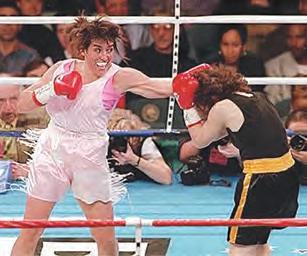
"I am very fortunate to have been the first to achieve the exposure no female boxer had experienced. Don King was my promoter; I fought on Showtime, sharing the spotlight with Mike Tyson, and the whole world was tuning in".
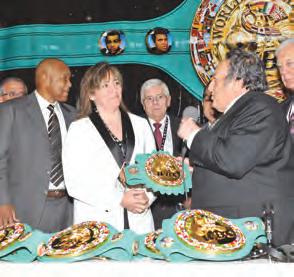
In 1993, nicknamed the 'Coal Miner's Daughter', she won her first title, but entering a predominantly male sport subjected her to discrimination. "I often found myself in difficult situations. Doctors didn't want to conduct my physical exams, and dressing rooms were janitor closets. Mockery and insults were constant. However, whene -
ver I faced criticism and heard that I couldn't do it, I found the determination to reach my goals".
Over time, she earned respect not only from the public but also from her peers. "The guys looked at me skeptically, wondering, 'Why is she here?' but they watched me train, sparred with me, and gradually, as my career grew, I gained their respect and support. I felt a strong connection with Mexican boxing fans. One of my favorite fighters was Julio César Chávez".
The support she received from the WBC is something Christy holds dear. "José Sulaimán took me under the WBC's wing and even named me an honorary champion. So, with many positive factors in play, I had to train extremely hard every day because I didn't want to disappoint anyone".
Salters has founded the nonprofit organization "Christy's Champs", which raises awareness about domestic violence—a cause she was a victim of. "Through all our boxing promotions, we try to draw attention to domestic violence, so people become more aware of what's happening around them". And boxing remains a part of her life. "With Christy Martin Promotions, we're organizing fights on the East Coast. I'm excited to team up with the WBC and bring some fights".
She shattered stereotypes by being the first woman on a Pay Per View fight card. She holds the record for the most knockouts in women's boxing and was the first woman featured in Sports Illustratedmagazine.
• In 2012, she had her final fight, losing to Mia St. John, leaving her with 59 fights and 49 victories, 32 of which were by knockout.
• One of the mostwatched fights in women's boxing history was against Laila Ali. Christy Martin was the most spectacular woman in boxing, and Laila Ali was the undefeated daughter of the great Muhammad Ali.
• In 2010, her trainer and husband tragically attempted to end her boxing career.
"I couldn't pick just one memory from my boxing career fighting alongside Mike Tyson, being promoted by Don King, the Sports Illustrated cover, or when José Sulaimán placed that green belt around my waist".@lideresmexicanos SÍGUENOS EN Revista Líderes Mexicanos SÍGUENOS EN
Erik “El Terrible” Morales comenzó en el deporte de los puños a la temprana edad de cinco años, inspirado por su padre, quien también era boxeador profesional. Su gran debut vino a los 16 años con una ya amplia trayectoria en la categoría amateur, hecho que lo proyectaba a ser una de las figuras principales en este deporte.
SU BOXEO SE distinguió por utilizar un ataque contundente y de una gran velocidad, esto le permitió ponerse a la par y derrotar a varios campeones mundiales de la época y colocarse como una de las figuras más importantes del boxeo nacional. También es reconocido por ser el primer peleador mexicano en conseguir cuatro campeonatos mundiales en diferentes divisio-
nes, tener una trilogía histórica de peleas con Marco Antonio Barrera y en ser el primer mexicano en derrotar a la leyenda Manny “Pac-Man” Pacquiao.
“He tenido muchas peleas que la gente recuerda con mucha emoción, yo una de las que tengo más grabadas en mi mente fue contra Enrique Júpiter, ya que para mí significaba si podría o no seguir en este deporte. Fue una prueba que me hizo saber que estaba listo para el siguiente nivel en mi carrera y de ahí vino mi primera pelea de campeonato mundial”, expresó Morales sobre uno de los momentos fundamentales de su desarrollo.
El nacido en Tijuana también destacó su primer enfrentamiento con el que sería uno de sus rivales en el deporte, Marco Antonio Barrera, puesto que más allá de lo que significaría en la narrativa de su carrera le daría oportunidades comerciales como conseguir su primer contrato con la cadena HBO y afianzarse económicamente.
Erik "El Terrible" Morales started his boxing journey at age five, inspired by his professional boxer father. He made his professional debut at 16, after an already impressive amateur career, which projected him to become one of the leading figures in the sport.
HIS BOXING style stood out for its powerful and lightning-fast attacks, allowing him to stand toe-to-toe and defeat several world champions of his era, establishing himself as one of the most significant figures in Mexican boxing. He is also renowned for being the first Mexican fighter to win four world championships in different weight divisions, as well as for his historical trilogy of fights with Marco Antonio Barrera and for being the first Mexican to defeat the legend Manny "Pac-Man" Pacquiao.
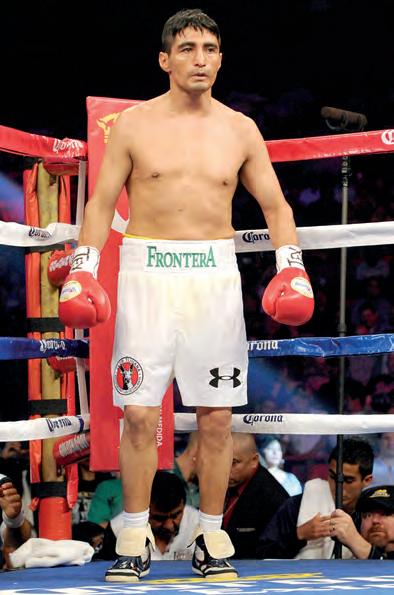
• Primer mexicano en conseguir campeonatos mundiales en cuatro diferentes divisiones: supergallo, pluma, superpluma y superligero.
• Enfrentó a 19 campeones mundiales a lo largo de su carrera, derrotando a 16.
• Tuvo trilogías legendarias con Manny Pacquiao y Marco Antonio Barrera.
• En 2018 fue ingresado al Salón de la Fama del Boxeo
• First mexican to win world championships in four different divisions: super bantamweight, featherweight, super featherweight and super lightweight.
• Faced 19 world champions throughout his career, defeating sixteen of them.
• Had legendary trilogies with Manny Pacquiao and Marco Antonio Barrera.
•Inducted into the Boxing Hall of Fame in 2018.
“Las peleas con Marco Antonio me permitieron demostrarles a las cadenas que estaba listo para dar un buen espectáculo, para enfrentarme a grandes rivales y poder salir victorioso. Fueron peleas de mucha voluntad que dieron mucho espectáculo en su momento”, recordó.
Posteriormente, “El Terrible” trataría de tumbar mitos del boxeo de nuestro país, como que nadie podría conseguir más títulos que el histórico Julio César Chávez y así lo haría consolidándose como campeón en cuatro ocasiones en diferentes divisiones, hecho inusitado en ese momento para un profesional mexicano.
Fue algo complicado para el pugilista porque en aquel momento ya contaba con 33 años de edad y se había alejado del deporte durante un tiempo, sin embargo, también era una prueba personal que Erik quería completar y mediante a un esfuerzo constante logró romper esa marca establecida por la leyenda mexicana.
"I have had many fights that people remember with great excitement. One of the moments etched in my mind was against Enrique Júpiter because it meant whether I could continue in this sport. It was a test that made me realize I was ready for the next level in my career, and from there, my first world championship fight followed", expressed Morales about one of the pivotal moments in his development.
The Tijuana-born boxer also highlighted his first encounter with what would become one of his sports rivals, Marco Antonio Barrera. Beyond its significance in his career narrative, the fight opened up commercial opportunities for him, such as securing his first contract with HBO and strengthening his financial position.
"The fights with Marco Antonio showed the networks that I was ready to put on a great show, face formidable opponents, and come out victorious. They were fights of tremendous will that provided great spectacle at the time", he recalled.
Reflexionando sobre la labor que ha podido experimentar por parte del Consejo Mundial de Boxeo, Erik Morales reconoció la gran labor del organismo de conectar a las figuras con el público y que de cierta manera los boxeadores puedan devolver a la comunidad que tanto les brindó a lo largo de sus trayectorias.
“Considero que más allá de ser boxeadores tenemos mucho que ofrecer, el compartir nuestras fuentes de inspiración y nuestras experiencias puede ayudar a muchos jóvenes. Llevar esa esperanza a los chavos es importante, muchos de nosotros también venimos de lugares donde no teníamos nada y con trabajo conseguimos grandes cosas”, remarcó. Morales también enfatizó la importancia que tiene el organismo para involucrar en sus actividades a boxeadores retirados y mejorar las condiciones de los que actualmente se mantienen en activo, como la reducción de rounds en una pelea, los estudios que deben de realizarse en-
Later, "El Terrible" sought to break some of the boxing myths in Mexico, such as no one being able to win more titles than the historic Julio César Chávez, and he did so by becoming a four-time champion in different weight divisions, an unprecedented achievement for a Mexican professional at that time.
It was a challenging feat for the fighter because he was already 33 years old and had taken a break from the sport. However, it was a personal test that Erik wanted to complete, and through constant effort, he surpassed the record set by the Mexican legend.
Erik Morales acknowledged the organization's great work in connecting the figures with the public and enabling boxers to give back to the community that supported them throughout their careers.

"I believe that, beyond being boxers, we have much to offer. Sha-
tre combates para asegurar el bienestar de los involucrados y el verificar que no exista doping para asegurar la calidad y justicia del espectáculo.
ring our sources of inspiration and experiences can help many young people. Bringing that hope to the youth is important; many of us also come from places where we had nothing, and through hard work, we achieved great things", he emphasized.
Morales also stressed the importance of the organization in involving retired boxers in its activities and improving the conditions for those currently active, such as reducing the number of rounds in a fight, conducting studies between bouts to assure the well-being of those involved, and ensuring there is no doping to guarantee the quality and fairness of the sport.
Considerado el boxeador mexicano más noqueador de todos los tiempos, Carlos “Cañas” Zárate es ejemplo viviente de las vueltas que da la vida, que en momentos te puede poner en los cuernos de la luna o hundirte en laberintos oscuros de los que solo pidiendo ayuda se puede salir, no sólo para continuar viviendo, sino para ayudar a otros a no caer.
NACIDO EN el barrio bravo de Tepito, pero forjado en la Ramos Millán, Carlos Zárate lograba acabar con la mayoría de sus rivales por la vía del nocaut, sumando en su carrera un récord de 66 victorias de las cuales 63 fueron por KO.
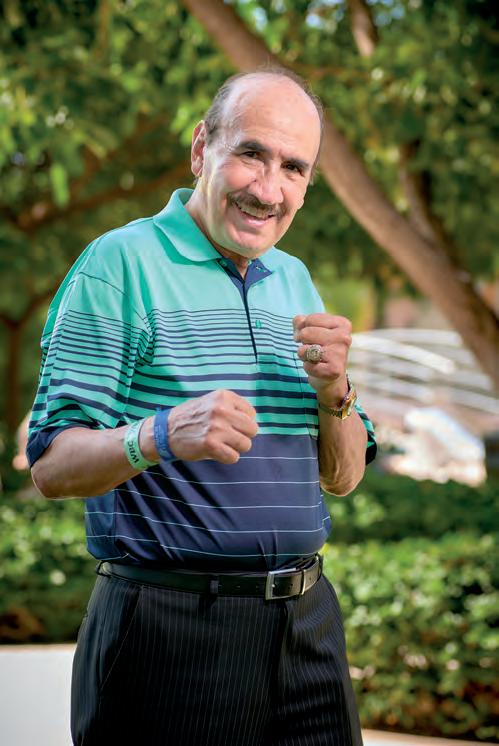
Cuernavaca, Morelos, fue la ciudad testigo del debut de Zárate, en 1970, donde por nocaut en dos asaltos venció a Luis Castañeda, comenzando así una racha ganadora de 23 peleas por nocaut.
“Desde niño me gustaba pelear, en la calle o donde fuera. Un día me invitaron a entrenar a un gimnasio de la Ramos Millán y ahí empecé a pegarle a la pera. Como a los 17 años me apunté a un torneo que se llamaba los Guantes de Oro y salí campeón, fue entonces cuando mi hermano me dijo que fuéramos a buscar al Cuyo Hernandez, quien en ese entonces era mánager de varios”, recordó el Cañas.
“Fuimos a verlo y me vio boxear y pues me quedé con él. Luego de los Guantes de Oro, buscamos una oportunidad profesional y fue cuando debuté en Cuernavaca y de ahí no paré hasta llegar a la clasificación mundial”.
Para Carlos la fama fue su gran amante, pero también su perdición, ya que, al ser campeón por muchos años, la adulación no se hizo esperar y con ella, gente que buscaba hundirlo, llevándolo a vivir un oscuro momento de adicciones.
“Caí muy profundo y en diez años me gasté toda mi lana. Ya sin nada fui a buscar a Don José para que me ayudara con alguna pelea, pero él me dijo: ‘No Carlos aquí no damos ayudas de esas, aquí la única ayuda es la rehabilitación’. Busqué rehabilitarme y comencé a trabajar en el Consejo repartiendo correspondencia en muchas partes. Entonces para mí, la familia Sulaimán ha sido un gran apoyo para seguir adelante”.
Carlos Zárate recuerda que “cuando Mauricio y sus hermanos eran niños, yo los entrenaba y ellos, al verme pelear, me admiraban mucho. Una vez en Filipinas, Mauricio fue con su papá a verme pelear, yo estaba bañado en sangre y cuando dieron el veredicto, él se acercó a saludarme y al saludarlo le cayeron unas gotas de sangre en su trajecito y hasta la fecha tiene ese trajecito guardado”.
CAMPEONATOS
• Campeón Peso Gallo WBC
• Miembro del Salón de la Fama del Boxeo Internacional
• En 2014, fue votado como el mejor peso gallo de la historia por el Salón de la Fama del Boxeo de Houston
CHAMPIONSHIPS
• WBC Bantamweight champion.
• Member of the International Boxing Hall of Fame
• In 2014, voted as the greatest bantamweight in history by the Houston Boxing Hall of Fame
Considered the mexican fighter with the biggest knockout power of all time, Carlos "Cañas" Zárate is a living example of life's twists and turns. At times, life can elevate you to the moon's horns, while at others, it can plunge you into dark mazes from which you can only emerge by seeking help. Not only to continue living but also to assist others in avoiding falling into those same traps.
BORN IN the tough neighborhood of Tepito but molded in Ramos Millán, Carlos Zárate managed to dispatch most of his opponents through knockout, amassing a record of 66 victories, 63 of which were by KO.
Cuernavaca, Morelos, witnessed Zárate's debut in 1970, where he triumphed over Luis Castañeda by second-round knockout, initiating a winning streak of 23 consecutive knockout victories.
"Since childhood, I enjoyed fighting, whether on the street or anywhere else. One day, I was invited to train at a gym in Ramos Millán, where I began hitting the speed bag. Around 17, I entered the 'Guantes de Oro' (Golden Gloves) tournament and emerged as the champion. That's when my brother told me we should look for Cuyo Hernandez, who at that time managed several fighters", recalled Cañas.
"We went to see him, he saw me box, and I ended up staying with him. After the 'Guantes de Oro,' we sought a professional opportunity, and that's when I made my debut in Cuernavaca. From there, I didn't stop until I reached the world rankings".
For Carlos, fame was both a great lover and his downfall. As a long-standing champion, adulation followed, along with people who sought to drag him down. This led him into a dark period of addiction.

"I fell deep, and in ten years, I squandered all my money. Left with nothing, I approached Don José for help with a fight, but he told me, 'No, Carlos, we don't give that kind of help in the WBC.The only assistance we offer here is rehabilitation.' I had rehabilitation and started working at the WBC, delivering mail. So, the Sulaimán family has been a tremendous support to keep me moving forward".
Carlos Zárate reminisces, "When Mauricio and his brothers were kids, I used to train them. They greatly admired me, watching me fight. Once in the Philippines, Mauricio went with his dad to see me fight. I was covered in blood. When they announced the veredict, he greeted me, and a few drops of blood fell on his little suit. He still keeps that suit to this day".
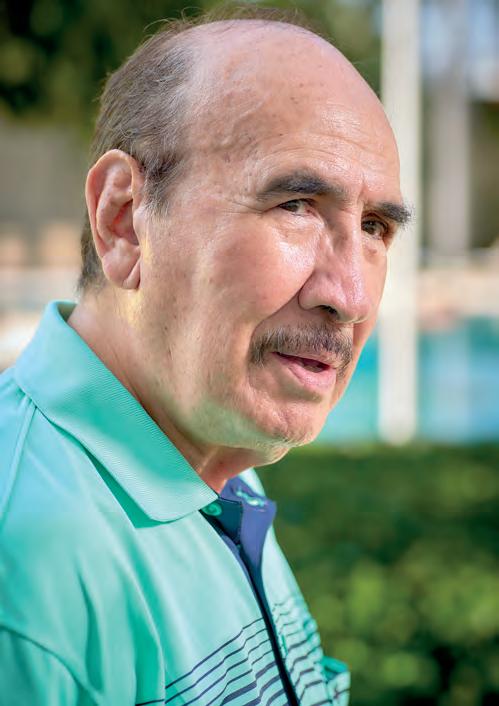
En el mundo del boxeo, figuras destacadas emergen no solo por su destreza en el cuadrilátero, sino también por su influencia fuera de éste. Ahmet Öner, un apasionado promotor deportivo y empresario turco, se ha ganado un lugar destacado en la industria gracias a su compromiso, visión y habilidades únicas.
 Jaime Higuera Mariñelarena Roberto Tetlalmatzin Carlos Cuevas
Jaime Higuera Mariñelarena Roberto Tetlalmatzin Carlos Cuevas
Traducción:
Mariana Torresmi carrera con la representación y ahí fue que conocí el Consejo Mundial de Boxeo en 2004, desde un inicio hice una buena relación con José Sulaimán y me di cuenta de que es la organización más fuerte a nivel global de este deporte,” estableció el representante.
El exboxeador también comentó que parte de lo que le atrajo a trabajar bajo la estela del WBC es que era la única organización con reglas claras para los combates, que daba dignidad a sus competidores durante, así como después de su carrera y que sus campeones contaban con un estatus adicional al resto.
• Fundó su propia compañía, Arena Box Promotions, a los 21 años
• En su fundación, comprometió a varios boxeadores como Juan Carlos Gómez, Steffen Kretschmann y el alemán amateur superpesado campeón de 2006, Konstantin Airich.
@AhmetOnerBoxing
Ahmet Öner ES RECONOCIDO por algunos como el Don King europeo, ha logrado impulsar la carrera de diferentes figuras a niveles insospechados y ha dejado la industria en mejores condiciones de cuando él comenzó a involucrarse en ella.
Öner demostró un interés innato por los deportes de combate. Fundó su propia empresa, Arena Box Promotion cuando apenas tenía 21 años. Su visión audaz lo llevó a forjar asociaciones con talentosos pugilistas, ayudándoles a alcanzar su máximo potencial y a conquistar títulos en múltiples divisiones. Sus esfuerzos no solo beneficiaron a los boxeadores que representaba, sino que también contribuyeron al crecimiento y la popularidad del boxeo en Europa y más allá.
“En primera instancia, quise ser un boxeador en Alemania, me convertí en profesional e incluso logré obtener un campeonato. Comencé a combinar
A partir de esta relación, el promotor tuvo la oportunidad de traer grandes shows a Turquía y Alemania y en 2006 establecer su propia compañía. Posteriormente, también se involucraría en funciones en México y trabajaría codo a codo con Mauricio Sulaimán al cual le mantendría la misma lealtad que demostró a su padre.
“He aprendido que es un negocio en el cual tienes que encontrar al peleador correcto para el combate que quieres tener. Los boxeadores cuando ganan no tienen ningún problema, pero cuando pierden te culpan; entonces, hay que saber escoger el momento adecuado para ellos”, detalló sobre las condiciones que vive un promotor.
• Founded his own company, Arena Box Promotions, at the age of 21
• At its inception, he engaged various boxers like Juan Carlos Gómez, Steffen Kretschmann, and the 2006 amateur super heavyweight champion, Konstantin Airich.
El empresario turco también expresó que actualmente uno de los desafíos que tienen los promotores es el de crear mercados desde cero. Puesto que es complicado llenar arenas y vender pay per views si no se cuenta con una superestrella al nivel de Canelo Álvarez, Anthony Joshua o Tyson Fury en la cartelera. Y concluyó que es la manera en que se crea la historia de cada pelea y el espectáculo que otorga cada boxeador, la forma en que el negocio sale adelante.
REGARDED BY some as the European Don King, he has propelled the careers of various individuals to unprecedented levels. He has left the industry in better shape than when he first became involved.
Öner displayed an innate interest in combat sports. He founded his own company, Arena Box Promotion when he was just 21 years old. His audacious vision led him to form partnerships with talented boxers, helping them reach their fullest potential and secure titles in multiple divisions. His efforts benefited the boxers he represented and contributed to the growth and popularity of boxing in Europe and beyond.
"At first, I wanted to be a boxer in Germany. I turned professional and even managed to win a championship. I began combining my career with representation, and that's when I became acquainted with the World Boxing Council (WBC) in 2004. Right from the start, I developed a good relationship with José Sulaimán and realized it's the strongest global organization in this sport", stated the promoter.
The former boxer also mentioned that part of what attracted him to work under the WBC's banner was that it was the only organization with clear rules for fights, which provided dignity to its competitors during and after their careers. Its champions had an additional status compared to the rest.
Through this relationship, the promoter had the opportunity to bring significant shows to Turkey and Germany and established his own company in 2006. Later, he would also be involved in events in Mexico and work closely with Mauricio Sulaimán, to whom he demonstrated the same loyalty he showed to his father.
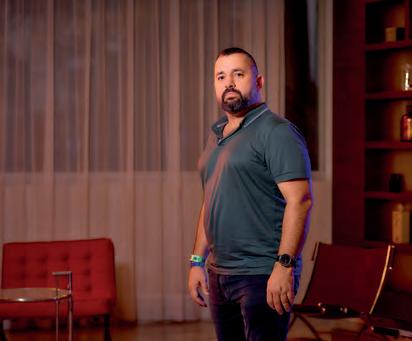
"I've learned that it's a business where you must find the right fighter for your desired match. Boxers have no problem when they win, but when they lose, they blame you; so,
you need to know the right timing for them", he detailed the conditions promoters face.
The Turkish entrepreneur also expressed that one of the challenges promoters currently face is creating markets from scratch. It's challenging to fill arenas and sell pay-per-views if there isn't a superstar of the level of Canelo Álvarez, Anthony Joshua, or Tyson Fury on the card. He concluded that the way each fight's story is crafted and the showmanship each boxer brings keeps the business moving forward.
“Cuando Mauricio tomó el control del Consejo Mundial de Boxeo, yo mantuve la misma lealtad que tuve con su padre. La relación que tengo con ellos no es de negocios, precisamente es como una familia.
Desde 2004 a 2023 me he perdido solo 3 convenciones del WBC y planeo continuar ligado a él”.
In the boxing world, standout figures emerge for their prowess in the ring and their influence beyond it.
Ahmet Öner, a passionate Turkish sports promoter, and entrepreneur, has earned a prominent place in the industry through his dedication, vision, and unique skills.
"When Mauricio took over the World Boxing Council, I maintained the same loyalty I had for his father. My relationship with them isn't just business; it's like family. From 2004 to 2023, I've missed only 3 WBC conventions, and I plan to remain connected to it".
#FORMER BOXER. SUPER
BANTAMWEIGHT CHAMPION.
FEATHERWEIGHT CHAMPION. BANTAMWEIGHT CHAMPION. SUPER
FEATHERWEIGHT CHAMPION
Jeff Fenech, apodado “Marrickville Mauler”, es una leyenda indiscutible en el mundo del boxeo. Nacido el 28 de mayo de 1964 en Sídney, Australia, Fenech se convirtió en un ícono de este deporte gracias a su impresionante talento, determinación y espíritu indomable.
FENECH destacó en las categorías de peso gallo, supergallo y pluma a lo largo de su carrera, categorías donde fue campeón. Pero la vida le daría una presea adicional y una victoria tras mucho tiempo. Pues tras 30 años, el Consejo Mundial de Boxeo reconocería la victoria del australiano en su combate contra Azumah Nelson por el título superpluma.
En ese momento se decidió un polémico empate, a pesar de que todos los espectadores y especialistas apuntaban a Fenech como ganador. Es por esto por lo que el Consejo rectificó su decisión haciendo justicia e historia con este título retroactivo.
“Yo estaba seguro de que había ganado la pelea, sabes los golpes que diste y los que recibiste y haber ganado el título no me habría hecho un mejor boxeador en aquel momento. Tras varios años sé el efecto que tiene la fama en las personas y creo que todo pasa por una razón, así que puede que haya sido lo mejor. Sin embargo, estoy muy contento de que se me reconozca aquel triunfo que tuve, el WBC está haciendo historia no solo para mí, sino para todo el deporte, millones de personas vieron esa pelea y que se rectifiqué el resultado le da más credibilidad y seriedad al deporte”, expresó el ahora campeón superpluma.
Y es que la trilogía de combates contra Azumah Nelson son los más recordados por la gente y por el pugilista australiano. Comentando que fueron peleas muy duras donde recibió su primer nocaut y en las que su carrera sería marcada en adelante.
Su estilo agresivo y su habilidad para lanzar combinaciones rápidas y precisas lo convirtieron en un oponente formidable. No solo era conocido por su destreza técnica, sino también por su asombrosa resistencia y su capacidad para mantener un ritmo implacable durante toda la pelea.
Sin embargo, la carrera de Fenech no estuvo exenta de desafíos. Lesiones y problemas personales a veces amenazaban con interrumpir su camino, pero “el hambre de seguir peleando” es lo que lo hizo continuar en múltiples ocasiones.
Después de retirarse del boxeo profesional, Jeff Fenech continuó contribuyendo al deporte como entrenador y mentor de jóvenes boxeadores. Su impacto en el deporte australiano y mundial es innegable, y su legado sigue inspirando a futuros boxeadores a alcanzar la grandeza en el cuadrilátero.
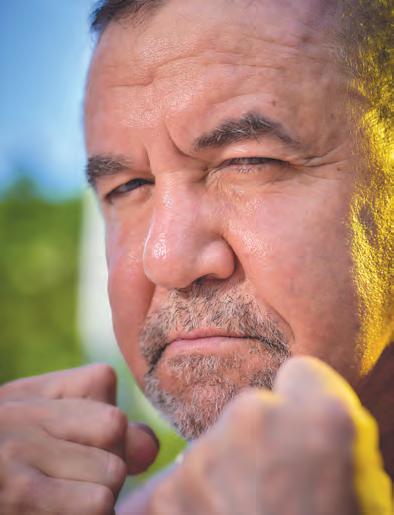
• Fenech representó a su país a nivel amateur y en varios mundiales.
• Fue inducido al Salón de la Fama del Deporte Australiano en 1986
• Entro al Salón Internacional de la Fama del Boxeo en 2002
• Fue entrenador de grandes peleadores como Danny Green, Nedal Hussein, Sakio Bika, Vic Darchinyan y ayudó a prepararse para algunas peleas a Mike Tyson.
• Es dueño de varias marcas de ropa deportiva en su país.
• Nació el 28 de mayo de 1964 en Australia
• Ganó cuatro títulos mundiales en diferentes divisiones.
• Su récord es de 29 victorias, tres empates y una derrota.
“José Sulaimán revolucionó al deporte porque nos trataba a todos de manera justa e igualitaria y creo que su hijo Mauricio va a hacerlo aún mejor".
Jeff Fenech, nicknamed the "Marrickville Mauler", is an undeniable legend in boxing. Born on May 28th, 1964, in Sydney, Australia, Fenech became an icon in this sport thanks to his impressive talent, determination, and indomitable spirit.
FENECH excelled in the bantamweight, super bantamweight, and featherweight categories throughout his career, becoming a champion in these weight divisions. However, life would grant him an additional accolade and a victory after a long time. After 30 years, the World Boxing Council (WBC) would recognize Fenech's success in his fight against Azumah Nelson for the super featherweight title.
At that time, they reached a controversial draw decision, even though all spectators and experts considered Fenech the winner. This prompted the WBC to rectify their decision, bringing justice and making history with this retroactive title.
"I was sure I had won the fight. You know, the punches you threw and the ones you received, and winning the title wouldn't have made me a better boxer at that time. After several years, I know the effect fame has on people, and I believe everything happens for a reason. So, it might have been for the best. However, I am thrilled that my victory in that fight is being recognized. The WBC is making history for me and the entire sport. Millions of people watched that fight, and rectifying the result adds more credibility and seriousness to the sport", expressed the now super featherweight champion.
Indeed, the trilogy of fights against Azumah Nelson is the most remembered by the public and the Australian boxer himself. He commented that these were very tough fights where he suffered his first knockout and that they marked his career moving forward.
His aggressive style and ability to throw quick and precise combinations made him a formidable opponent. He was known for his technical prowess, astonishing endurance, and capacity to maintain an unrelenting pace throughout the match.
However, Fenech's career was challenging. Injuries and personal issues sometimes threatened to derail his path, but his "hunger to keep fighting" made him persevere on multiple occasions.
After retiring from professional boxing, Jeff Fenech continued contributing to the sport as a coach and mentor to young boxers. His impact on Australian and global sports is undeniable, and his legacy inspires future fighters to achieve greatness in the ring.
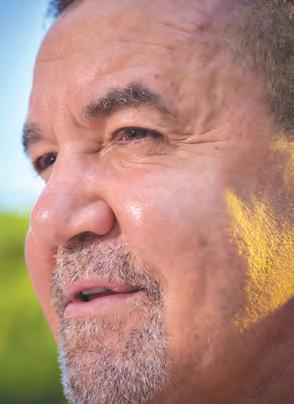
• Fenech represented his country in amateur competitions and at various world championships.
• Inducted into the Australian Sport Hall of Fame in 1986.
• Inducted into the International Boxing Hall of Fame in 2002.
• He coached notable fighters such as Danny Green, Nedal Hussein, Sakio Bika, and Vic Darchinyan and assisted Mike Tyson in preparing for some fights.
• Owner of several sports clothing brands in his country.
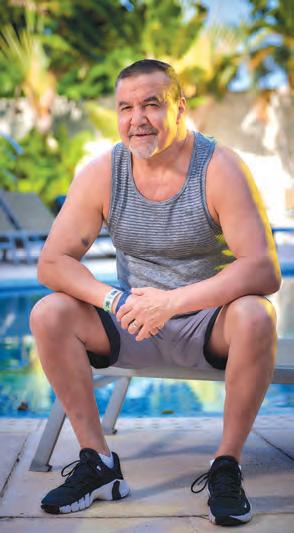
• Nació el 28 de mayo de 1964 en Australia
• Ganó cuatro títulos mundiales en diferentes divisiones.
• Su récord es de 29 victorias, tres empates y una derrota.
@jefffenech_wbc
"José Sulaimán revolutionized the sport because he treated us all fairly and equally, and I believe his son Mauricio will do even better".
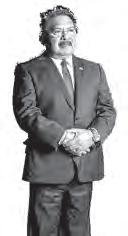
A los dieciocho años llegó a ser campeón de los Guantes de Oro y después trabajó en diversos oficios, incluido el de policía, hasta que entró a una fábrica de bombas. Las circunstancias lo llevaron a poner su propio negocio, fabricando equipo de la mejor calidad, con una visión clara de brindar el mejor servicio para ser los mejores en el mercado. Gracias a su trabajo y a todo lo que vivió, Rogelio siempre ha buscado ayudar a los boxeadores.
EN EL GARAJE de su casa montó su fábrica, en Olivar del Conde, fabricando primero bombas pequeñas y luego se decidió por las grandes de 40 hp y más. “Mi intención era vender en grande, principalmente para el gobierno, por lo que me dediqué a fabricar las mejores. Atendemos a todo el país, Sudamérica y Estados Unidos, en donde abrimos una sucursal de Nabohi en Houston”.
Tiene claro que su competencia está en Alemania y Suecia y además ellos conocen sus equipos y ya han comenzado a competir. “Yo le estoy vendiendo a Abu Dabi, algo que no es fácil, pero que estamos consiguiendo gracias a que somos gente de
trabajo. Antes de lanzarnos hacia allá empezamos a venderle a Centroamérica primero y luego a Sudamérica. Además de vender las bombas les ofrecemos servicio, de mantenimiento preventivo y correctivo”.
Su experiencia le enseñó que muchos de quienes se dedican al boxeo lo hacen por necesidad y a la gran mayoría no les va bien en ese deporte, por lo que Rogelio buscó la manera de apoyarlos. “En algún momento conocí a José Sulaimán, en una comida, recuerdo que era una persona muy inteligente, con la que se podía platicar muy a gusto. Yo le llegué a comentar mi idea de ayudar a los boxeadores con un fondo, en donde se les pudiera ayudar con servicios médicos o en el momento en que se retiraran”, nos compartió don Rogelio Mora.
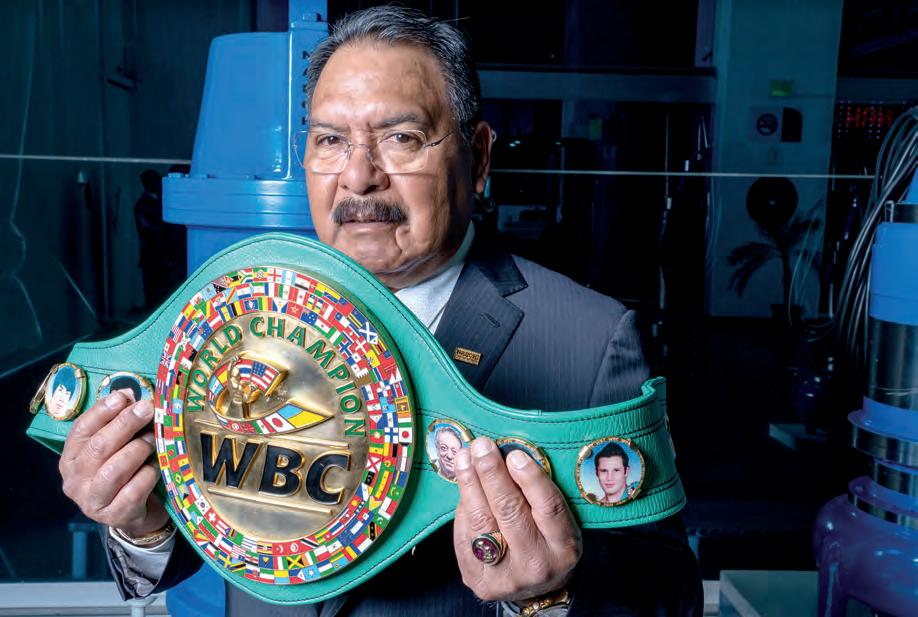
Para él, el mejor boxeo siempre ha sido el de los mexicanos y recordó a grandes campeones que ha tenido el país. “Yo soy chilango y he conocido a grandes campeones de la ciudad y ayudo a los que viven aquí, los que tengo cerca. Que yo recuerde, la mejor pelea que he visto es la de Pacquiao contra Juan Manuel Márquez, la última y antes, las peleas de Julio César Chávez eran legendarias”. En su propuesta para mejorar el boxeo sugiere platicar con los entrenadores, para que piensen más en el deporte y en el espectáculo que representa para quienes van a ver una pelea. “Ellos a su vez tendrán que platicar con los boxeadores y si se pudiera, habría que tomar una parte de la paga que les corresponde a los boxeadores para hacer la caja para su retiro. Siempre hay que entender que detrás de un gran campeón hay muchos que no llegarán y que pasan muchos años intentándolo”.
At eighteen, he became a champion in the Gloves of Gold competition and later worked in various jobs, including being a police officer, until he joined a pump factory. Circumstances led him to start his own business, manufacturing top-quality equipment, with a clear vision of providing the best service to become the market leader. Thanks to his hard work and life experiences, Rogelio has always sought to help boxers.
IN HIS GARAGE at Olivar del Conde, he set up his factory, initially producing small pumps, and then he ventured into manufacturing larger ones with 40 hp and above. “I intended to sell on a large scale, mainly to the government, so I focused on making the best pumps. We cater to the entire country, South America, and the United States, where we opened a branch of Nabohi in Houston”. He knows that his competition comes from Germany and Sweden, and they are already familiar with his equipment, engaging in competitive matches. “I am selling to Abu Dhabi, which is not an easy feat, but we are achieving it because we are hardworking people. Before expanding there, we started selling to Central America and South America. Apart from selling pumps, we offer preventive and corrective maintenance services”.

“Soy alguien que vino desde abajo, en su momento pude dedicarme al boxeo pero una lesión terminó con ese sueño. Hoy tengo la mejor empresa que fabrica bombas sumergibles de México y compito con marcas de países como Alemania y Suecia, eso me da mucho orgullo…”
El ruido de los costales y el acelerado movimiento de la pera, hizo que se encontrara con su versión más guerrera, siendo partícipe del debut del boxeo mexicano femenil. En medio de tantas historias de éxitos y fracasos, se encuentra con Nabohi en 2008, quienes mostraron absoluta entrega e interés por ella, cubriendo cualquier necesidad de su carrera como deportista. “Me gustaría que la gente me siguiera recordando como La Guerrera, una gran peleadora, ejemplo de lucha y esfuerzo y de que los sueños se pueden hacer realidad”.
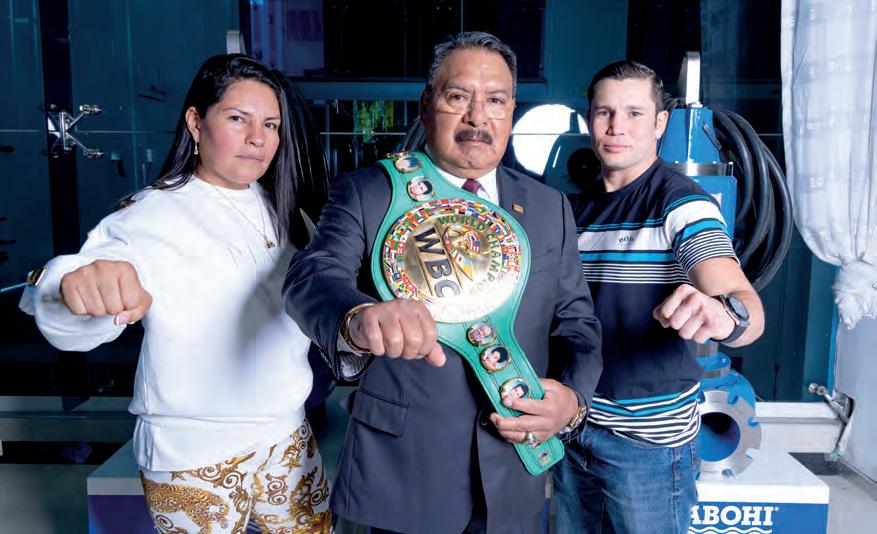
Su amor por el boxeo despertó al verlo presente en su familia, inspiración que más tarde fue el motor que lo llevó a pararse en el ring. Como parte de un camino de campeonatos nacionales, internacionales y olímpicos, Nabohi ha acompañado su preparación desde hace casi tres años, logrando una sinergia muy fuerte. “Me gustaría que me recuerden como uno de los mejores peleadores supermosca que se ha presentado en el CMB en el mundo y sobre todo representando a México, porque es un orgullo decir que soy mexicano”.
Ana María Torres "La Guerrera" The sound of punching bags and the rapid movement of the speed bag brings out her fiercest warrior spirit, making her a part of the debut of Mexican women's boxing. Amid numerous stories of success and failure, she encountered Nabohi in 2008, who showed absolute dedication and interest in supporting her, addressing all her needs as an athlete. “I would like people to remember me as 'La Guerrera,' a great fighter, an example of resilience and effort, and proof that dreams can come true”.
His love for boxing awakened when he saw it being practiced in his family, and later, it became the driving force that led him to enter the ring. As part of a journey filled with national, international, and Olympic championships, Nabohi has been by his side for almost three years, creating a strong synergy. “I would like to be remembered as one of the best super flyweight fighters representing Mexico in the WBC worldwide. It's a pride to say that I am Mexican”.
Rogelio Mora tiene muchas esperanzas puestas en el boxeo mexicano, dentro del deporte y en la vida de cada boxeador, gracias a que asume sus orígenes que le han forjado su carácter. “Soy alguien que vino desde abajo, en su momento pude dedicarme al boxeo pero una lesión terminó con ese sueño. Hoy tengo la mejor empresa que fabrica bombas sumergibles de México y compito con marcas de países como Alemania y Suecia, eso me da mucho orgullo, porque es fruto del trabajo y de hacer bien las cosas. Tenemos bombas de hasta 450 hp y en 90% de los cárcamos de la Ciudad de México hay equipos Nabohi, que funcionan muy bien”.
Para concluir, Rogelio lanzó un mensaje claro y directo a todos los boxeadores: “Échenle muchas ganas, trabajen para ustedes, no tienen mucho tiempo para hacer una carrera, eso siempre estará en contra, pero si lo planean bien y se rodean de buenas personas, les puede ir bien el resto de sus vidas. Junten su lana e inviertan en un negocio”.
CONTACTO / CONTACT:
www.nabohi.com
nabohi.direcciongeneral@yahoo.com.mx

Prol. San Antonio 416, colonia San Pedro de los Pinos CP 01180, Álvaro Obregón, CDMX 55 5660 1473
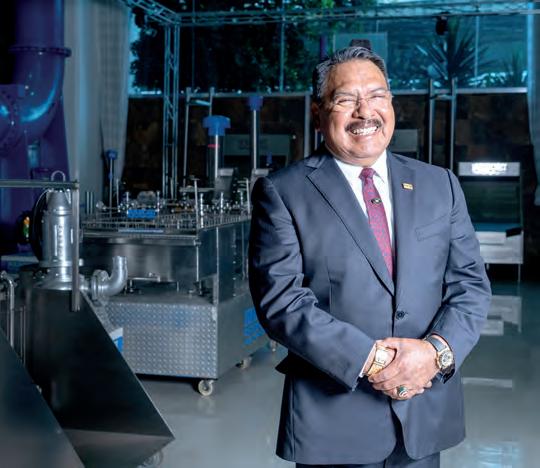
His experience taught him that many boxers take up the sport out of necessity, and most ought to fare better. That's why Rogelio sought a way to support them. “At some point, I met José Sulaimán at a gathering. I remember he was knowledgeable, and we had a pleasant conversation. I shared my idea of creating a fund to help boxers with medical services or support when they retire”, shared Rogelio Mora.
Mexican boxing has always been the finest for him, and he fondly recalls the great champions the country has produced. “As a Mexico City native, I have met and supported many champions from this city. To the best of my recollection, the greatest fight I have seen is the one between Pacquiao and Juan Manuel Márquez, the last one, and the legendary fights of Julio César Chávez”.
In his proposal to improve boxing, he suggests talking to the trainers to make them focus more on the sport and the spectacle it represents for the audience. “They, in turn, should talk to the boxers, and if possible, a portion of the boxers' earnings should be set aside for their retirement fund. We must always understand that behind a great champion, many won't make it and will spend numerous years in the ring tying”.
Rogelio Mora holds high hopes for Mexican boxing, both within the sport and in the lives of each boxer, thanks to his roots that have shaped his character. “I am someone who came from humble beginnings, and at one point, I could have pursued a boxing career, but an injury ended that dream. Today, I have Mexico's best company that manufactures submersible pumps, competing with brands from countries like Germany and Sweden. It fills me with pride because it results from hard work and doing things right. We have pumps with up to 450 hp, and 90% of the pumping stations in Mexico City use Nabohi equipment, which performs excellently”.
In conclusion, Rogelio sent all boxers a clear and direct message: “Give it your all; work for yourselves. You don't have much time to build a career, which is always a challenge, but if you plan well and surround yourself with good people, you can succeed for the rest of your lives. Save up and invest in a business”.
“I came from humble beginnings, and at one point, I could have pursued a boxing career, but an injury ended that dream. Today, I have Mexico's best company that manufactures submersible pumps, competing with brands from countries like Germany and Sweden. It fills me with pride…”
EN SU “Martes de Café” el WBC por medio de su presidente Mauricio Sulaimán hizo un reconocimiento sincero a Rogelio Mora, aficionado al boxeo, empresario y hombre ejemplar, quien durante años ha tenido rasgos de solidaridad hacia los deportistas. NABOHI es una empresa de diseño, desarrollo y fabricación de equipos sumergibles líder a nivel nacional e internacional.
Don Rogelio siempre tuvo gran admiración por el boxeo y los púgiles, al grado que llegó a participar en el torneo “Guantes de Oro”. Con el paso del tiempo el señor Mora fundó NABOHI INTERNACIONAL y logró colocarla como la empresa más grande de México en el ramo del tratamiento de aguas negras y residuales y que hoy cuenta con infraestructura de primer nivel así como con personal altamente capacitado, maquinaria e ingeniería de vanguardia.
Mauricio Sulaimán reconoció que Rogelio Mora es un ejemplo de lucha y perseverancia, “de que los sueños se cumplen cuando se trabaja por ellos. Una de las cosas que más admiro del señor Mora no es solo su perseverancia sino el gran amor que tiene por su familia, sabe que todos los sacrificios han sido en gran parte por ellos y gracias al apoyo incondicional de su esposa la señora Julia Garay”.
En el homenaje estuvo acompañado de su esposa, su hijo Cristobal, Gerente de Planta y Proyectos
Jesús Isaac González Roberto Tetlalmatzin Carlos Cuevas Traducción: Mariana TorresEl WBC, encabezado por su presidente Mauricio Sulaimán, entregó un cinturón especial a Rogelio Mora, Fundador y Director General de NABOHI, el pasado 16 de mayo de este año en las instaciones de NABOHI. Un merecido homenaje a su excepcional trayectoría.
Especiales de NABOHI, su nuera la boxeadora Ana María Torres y gran parte de sus nietos, así como los ex campeones del mundo Carlos Zárate y Francisco Vargas.
Don Rogelio Mora aseguró que siempre ha sido un hombre perseverante que ha tenido que sortear muchas tormentas pero que también ha sabido levantarse. “A las nuevas generaciones mando un claro y contundente mensaje: estudien, sean perseverantes, trabajen y esfuércense, todo los sacrificios que hagan hoy serán recompensados”.
The WBC, led by its president Mauricio Sulaimán, presented a special belt to Rogelio Mora, Founder and CEO of NABOHI, on May 16th of this year at the NABOHI facilities. A well-deserved tribute to his exceptional journey.
DURING ITS "Coffee Tuesday", the WBC, through its president Mauricio Sulaimán, extended a heartfelt recognition to Rogelio Mora, a boxing enthusiast, entrepreneur, and exemplary individual, who has shown years of solidarity towards athletes.NABOHI is a leading national and international company that designs, develops, and manufactures submersible equipment.
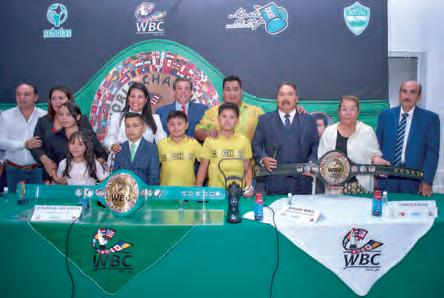
Don Rogelio always deeply admired boxing and boxers, to the point where he even participated in the "Golden Gloves" tournament. Over time, Mr. Mora founded NABOHI INTERNATIONAL and succeeded in making it Mexico's largest sewage and wastewater treatment company. Today, the company boasts top-tier infrastructure, highly skilled personnel, cutting-edge machinery, and advanced engineering.
Mauricio Sulaimán acknowledged that Rogelio Mora is an example of effort and perseverance, "of dreams coming true through hard work. One of the things I admire the most about Mr. Mora is not only his persistence but also the deep love he has for his family. He knows that all the sacrifices he has made were largely for them and thanks to the unwavering support of his wife, Mrs. Julia Garay".
During the tribute, he was accompanied by his wife, his son Cristobal, the Plant and Special Projects Manager of NABOHI, his daughter-in-law, the boxer Ana María Torres, and a large part of his grandchildren, as well as former world champions Carlos Zárate and Francisco Vargas.
Don Rogelio Mora affirmed that he has always been a persistent man who has had to weather many storms but knows how to rise. "To the new generations, I send a clear and resounding message: study, be persistent, work hard, and strive. All the sacrifices you make today will be rewarded".
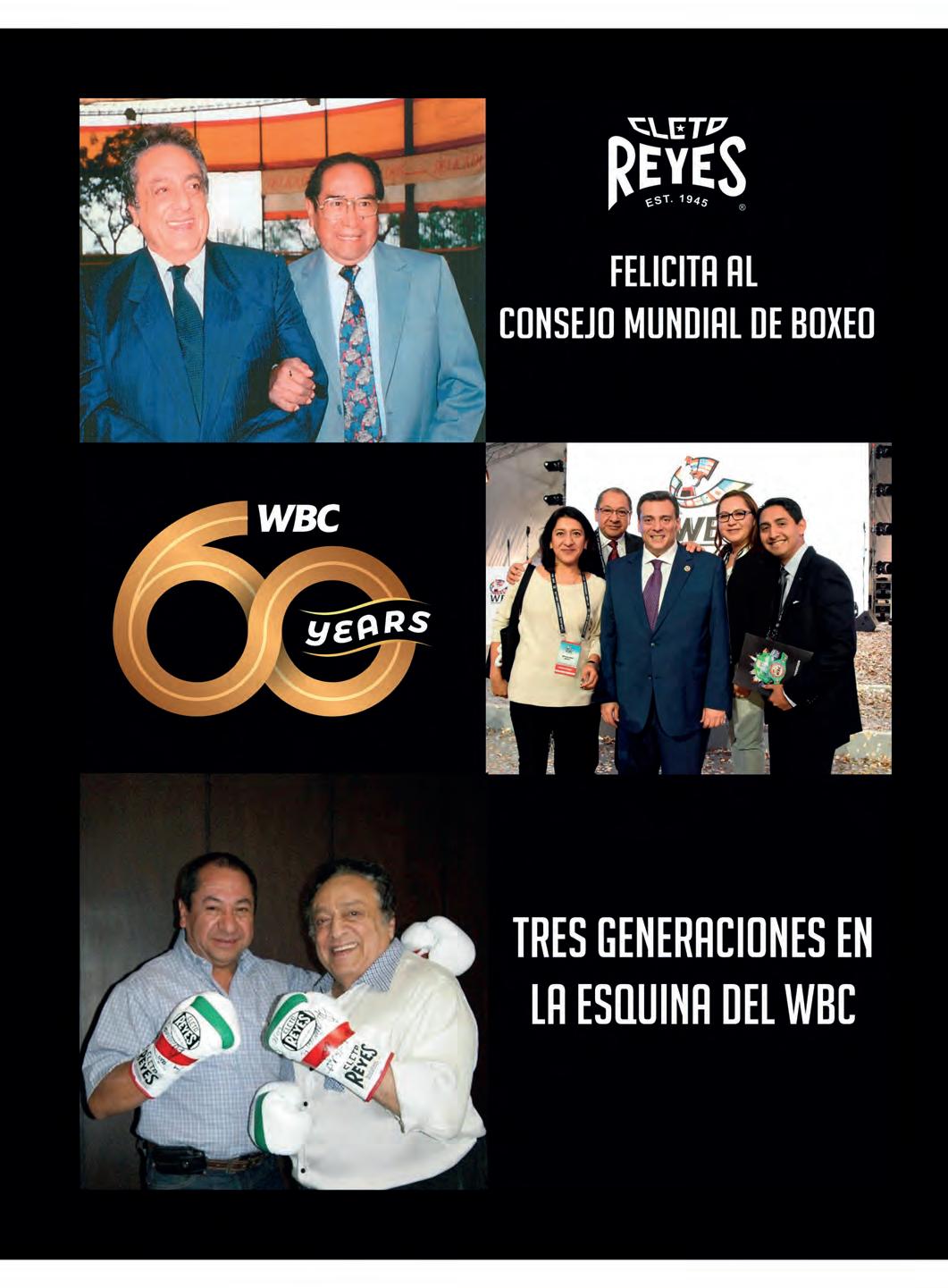
GRACIAS A LA carrera que construyó su abuelo y la leyenda que simboliza en el mundo del boxeo, desde pequeño, las primeras memorias de José Manuel se remontan a su niñez con Mike Tyson cargándolo en sus brazos y creciendo a lado de personajes como Julio César Chávez.
A pesar de que desde niño su mundo ya giraba en torno a el boxeo, le llevó mucho tiempo lograr captar el sentido de lo que realmente significaba. “Nunca entendí el deporte como tal, hasta que pasaron muchos años después, específicamente cuando tuve muchas complicaciones en mi vida y lo único que me ayudó a sobrepasar las adversidades, fue el boxeo. Desde chiquito lo tuve en mi sangre, pero hasta que llegué a aceptar al boxeo, me acepté a mí mismo”.
Ante un mundo que se vuelve cada vez más materialista, ha sido difícil mostrar la faceta de “Josejas”, sin embargo, José Manuel ha permanecido firme en su convicción de revolucionar el mundo del boxeo desde su trinchera y, ahora a partir de esta oportunidad que el Consejo le ha dado. “Lo que busco es la concientización del boxeador, de cómo cuidarlo y cómo seguir con este gran deporte tan apasionante”.
Un embajador del Consejo Mundial de Boxeo, es más allá de una
La rugosidad de su piel y una gran cabellera cayendo sobre su rostro, es la imagen de quien ha dedicado su esfuerzo en atender la parte humanitaria del Consejo Mundial de Boxeo. A partir de que este deporte cambió su vida, identificó su voluntad por ayudar a quienes con mucho empeño desarrollan su profesión alrededor del boxeo. Gracias a su perseverancia y enfoque en humanizar un deporte tan extremo como lo es el boxeo, Josejas es un pilar fundamental para el desarrollo de los deportistas del WBC, que ha luchado y trabajado con la finalidad de fungir como la cara de los boxeadores.
botarga, es una persona que intenta brindar valores y elementos positivos a las personas desde la parte interna. Existen muchos embajadores en el Consejo, cada uno con una función, ya sea humanista o desde la perspectiva técnica. “Lo que hace Josejas diferente es trabajar para crear más soluciones para las personas dentro y fuera del boxeo, a salvar vidas, ya sea mental, emocional o físicamente hablando. Por ejemplo, ayudamos sin fines de lucro a niños con cáncer, a través de la recaudación de fondos y el hecho de poder salvar vidas, es la parte que más me apasiona”.
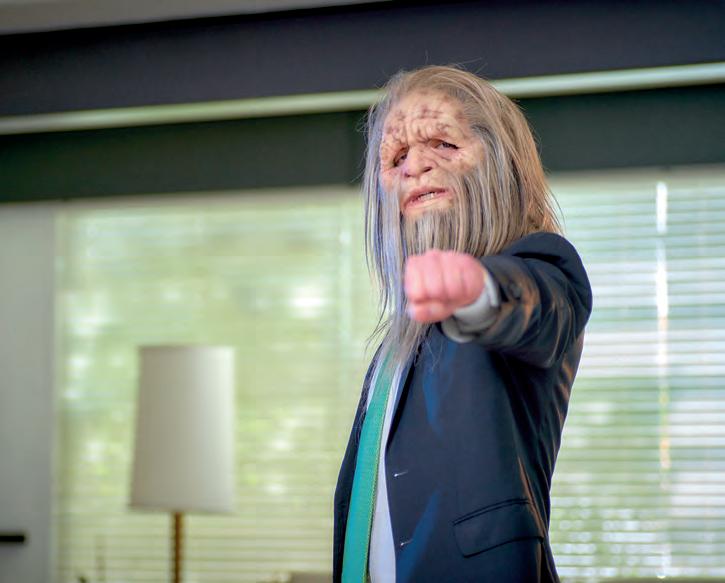
A pesar de los prejuicios que existen alrededor del boxeo, al tratarse de un deporte de contacto y al significar básicamente una lucha, es preciso mencionar que ha permanecido como un aliado para quienes buscan mejores oportunidades y llegar hasta arriba para convertirse en héroes ante todo el mundo. Una parte importante de lo que hace Mauricio Sulaimán, es fomentar la concientización, para lograr eliminar la ignorancia en cuanto a cómo ven a la persona, al boxeador y al deporte y además buscan plasmar la manera en la que el WBC ayuda a estas personas antes, durante y después de sus carreras, ya sea física, mental o emocionalmente hablando.
Hay muchos planes para la división humanitaria del WBC, que seguirá apuntando hacia la integridad del boxeador. A través de Jill Diamond, Secretaria Internacional del Consejo Mundial de Boxeo y Presidenta Internacional de WBC Cares, quien trabaja al 100% para los niños y boxeadores, se están enfocando en recaudar fondos y de esa manera seguir creciendo en la parte humana. “Por la parte técnica del boxeo, estamos uniendo el potencial de las personas y abriendo en este momento nuevas oportunidades para boxeadores, en-
focándonos en seguir humanizando este deporte. El Consejo Mundial de Boxeo me abrió la puerta cuando nadie más creyó en este proyecto que busca tocar corazones y mentes y, estoy muy agradecido por la oportunidad que me han dado, porque sin duda el boxeo está evolucionando y estoy feliz de que la gente esté viendo el potencial que tiene como el deporte de México”, finalizó.
The ruggedness of his skin and a mane of hair falling over his face portray the image of someone dedicated to the humanitarian aspect of the World Boxing Council. Since this sport changed his life, Josejas identified his calling to help those working tirelessly in boxing. Through perseverance and a focus on humanizing an extreme sport like boxing, Josejas has become a fundamental pillar for developing WBC athletes, striving to be the face of the boxers.
THANKS TO the legacy built by his grandfather and the legend he represents in the boxing world, José Manuel's earliest memories go back to his childhood with Mike Tyson carrying him in his arms and growing up alongside figures like Julio César Chávez. Although his world revolved around boxing from a young age, it took him a long time to grasp its true meaning. "I never understood the sport as such until many years later, specifically when I faced numerous complications in my life. Boxing was the only thing that helped me overcome adversities. It has been in my blood since I was a child, but it wasn't until I fully accepted boxing that I accepted myself".
Despite the prejudices surrounding boxing, a contact sport and a form of combat, it remains an ally for those seeking better opportunities and striving to become heroes worldwide. A crucial aspect of Mauricio Sulaimán's work is raising awareness to eliminate ignorance about how people perceive boxers and the sport. The WBC strives to showcase how they support these individuals before, during, and after their careers, whether physically, mentally, or emotionally.
In a world that is becoming increasingly materialistic, it has been challenging to showcase the side of "Josejas". Nevertheless, José Manuel remains steadfast in his mission to revolutionize the world of boxing from his corner and, now, through the opportunity given to him by the WBC. "I seek the boxer's awareness, taking care of them, and continuing with this fascinating sport”.
An ambassador of the World Boxing Council goes beyond a mascot; it is someone who aims to provide values and positive elements to people from within. The WBC has several ambassadors, each with a specific function, be it humanitarian or from a technical perspective. "What sets Josejas apart is our work to create more solutions for people inside and outside the boxing world. We strive to save lives, whether it's mentally, emotionally, or physica-
lly. For example, we help children with cancer through non-profit fundraising, and being able to save lives is what excites me the most".
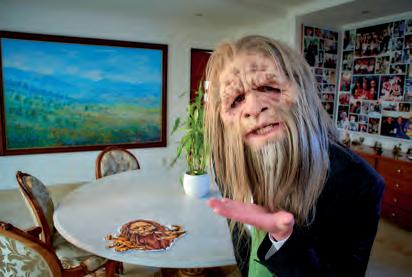
There are many plans for the humanitarian division of the WBC, which will continue to focus on the well-being of boxers. Through Jill Diamond, International Secretary of the WBC and International President of WBC Cares, who works 100% for children and fighters, they are concentrating on raising funds to develop the humanitarian aspect further. "On the technical side of boxing, we are harnessing people's potential and creating new opportunities for boxers, aiming to continue humanizing this sport. The World Boxing Council opened its doors to me when no one else believed in this project, which aims to touch hearts and minds. I am grateful for the opportunity they have given me because boxing is undoubtedly evolving, and I am happy that people are seeing its potential as Mexico's sport", he concluded.

PATROCINADORES - IBH
A Luis Menéndez el amor por el boxeo le viene de familia ya que a su papá le encantaba y era aficionado de Tyson, Holyfield, Chávez, entre otros. Hace 12 años llegó a México desde España para establecer su empresa y tuvo la suerte de encontrarse en el camino con Mauricio Sulaimán. A partir de ahí participa en diferentes iniciativas junto al Consejo Mundial de Boxeo.
LUIS MENÉNDEZ
President The International Business Hub (IBH)
“DICHAS TAREAS van desde promoción, apoyo en eventos, búsqueda de patrocinadores y apoyar en todo lo que sea beneficioso para la familia del boxeo, y en especial a todo lo que pueda agregar valor a la gran labor hace el Consejo Mundial de Boxeo, por el deporte y la sociedad”. Y es que tuve la gran suerte que hace más de un año don Mauricio me hizo el favor de nombrarme Consejero Honorario. Desde entonces, lo que estamos haciendo es una serie de eventos que agreguen valor al Consejo, que sean creativos fuera de lo normal, por ejemplo, ahora mismo estamos creando un proyecto muy interesante que se llama ‘Del Mundo para México’ donde patrocinaremos desde nuestra compañía junto al Consejo Mundial de Boxeo y traeremos a seis campeones de renombre mundial. De esta manera, traeremos a México la oportunidad de convivir con grandes campeones nacionales e internacionales y poner en valor una de las grandes cunas del boxeo, como es nuestro país. Otra actividad que tenemos es que un grupo de empresarios llamado
‘La Legión del Boxeo’ hacemos networking a través del boxeo, cada sábado nos acompaña un campeón y normalmente don Mauricio asiste una vez al mes. Nos reunimos aproximadamente un gran grupo de directivos y propietarios de compañías, para boxear y compartir experiencias y negocios, a través y junto al deporte. Una manera sana, de generar sinergías y relaciones”, asegura Menéndez, quien es Presidente de The International Bu-

De las tareas más importantes que realiza es la búsqueda de patrocinios, enfocados en eventos que tengan un activo social, basados en responsabilidad social ya que junto con su empresa ha apoyado desde actividades puras de convivencia de boxeo familiar, hasta apoyo en temas de rehabilitación para jóvenes. Otra labor primordial es que se ha ayudado a promotores europeos a buscar y encontrar jóvenes boxeadores mexicanos, para apoyarles en su crecimiento boxístico y búsqueda de oportunidades.
“Cuando don Mauricio tiene una idea, yo lo que hago es buscar a empresarios que les guste el boxeo, explicarles e introducirles los programas y juntar la inversión necesaria entre todos para los mismos. Muchos empresarios y directores, ven en este deporte una vía para hacer bien y sumar a la sociedad. Lo hacemos siempre desde el lado de Responsabilidad Social Corporativa, o sea, que el boxeo aporte un valor de Responsabilidad Social a la comunidad. Lo que queremos ligar es nuestra marca empresarial al boxeo porque ahí están todos los valores que nosotros entendemos que son importantes como esfuerzo, dedicación, sacrificio y continuidad. Y siempre de la mano del Consejo”, explica.
Agrega que él junto con su compañía desde hace tiempo están obsesionados por devolver a México todo lo que les ha dado ya que han tenido la gran suerte de que su empresa tenga gran éxito y cree que hay que ser agradecidos con un país que los ha atendido bien y que los recibió con el cariño que un hermano recibe, por eso en su programa de Responsabilidad Social Corporativa decidieron que el boxeo sería el vehículo para hacerlo porque es el deporte nacional de México, “por ejemplo, pedimos al gran campeón, a nuestro gran amigo Isaac ‘Pitbull’ Cruz que nos ayudara a hacer unas cápsulas para motivarnos y seguir ese gran camino del éxito. Cada cápsula tiene un valor como el esfuerzo, la motivación, la perseverancia, la disciplina, la constancia, entre otros”, indica.
Reconoce que el boxeo es un deporte extremadamente popular y tiene mucha afición, pero tiene poca ayuda, entonces lo que se trata es de ordenar a esa afición para que el boxeo reciba más ayuda. “Yo creo que el Consejo tiene muchísimas ideas buenas para ayudar a los jóvenes y para ayudar a la población en general a través del boxeo, pero muchas veces faltan recursos, entonces, un poco, yo creo que mi misión o como yo me visualizo es apoyar al Consejo y buscar esos recursos para llevar a cabo todas las iniciativas que tienen en mente”, puntualiza.
th. We gather many executives and business owners to box and share experiences and enterprise opportunities, all through and alongside sports. It’s a healthy way to generate synergies and relationships”, says Menéndez, who serves as the President of The International Business Hub (IBH).
has treated them well and received them with the affection one receives from a brother. That’s why they decided to use boxing as the vehicle for their Corporate Social Responsibility program since it is Mexico’s national sport.
The love for boxing runs
Luis Menéndez’s family, as his father was a big fan of Tyson, Holyfield, Chavez, and others. Twelve years ago, he arrived in Mexico from Spain to establish his company and had the fortune of crossing paths with Mauricio Sulaimán. Since then, he has been involved in various initiatives alongside the World Boxing Council (WBC).
“THESE TASKS range from promotion, event support, seeking sponsors, and supporting anything that benefits the boxing family, and especially anything that can add value to the WBC’s great work for the sport and society. Fortunately, Don Mauricio honored me over a year ago by appointing me as an Honorary Advisor. Since then, we have been organizing a series of events that add value to the WBC, events that are creative and unique. For example, we are currently working on an exciting project called ‘From the World to Mexico,’ where our company and the WBC will sponsor six world-renowned champions. This way, we will bring to Mexico the opportunity to interact with great national and international champions, showcasing our country as one of the great birthplaces of boxing. Another activity we have is with a group of entrepreneurs called ‘The Boxing Legion,’ where we network through boxing. A champion joins us each Saturday, and Don Mauricio usually attends once a mon-
Among the most critical tasks he performs is seeking sponsorships focused on events with a social impact based on corporate social responsibility. He has supported everything from family-oriented boxing events to rehabilitation programs for young individuals through his company. Another crucial aspect is helping European promoters find and connect with young Mexican boxers to support their growth and seek opportunities.
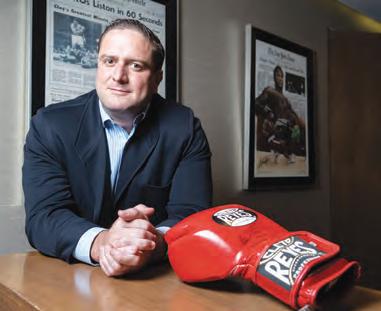
“When Don Mauricio has an idea, my role is to find entrepreneurs who love boxing, explain and introduce them to the programs, and gather the necessary investment from everyone involved. Many business owners and directors see boxing as a way to do good and contribute to society. We always approach it from the perspective of Corporate Social Responsibility, meaning that boxing brings social value to the community. We want to link our business brand to boxing because it encompasses all the essential values, such as effort, dedication, sacrifice, and continuity. And always hand in hand with the WBC”, he explains. He emphasizes that he and his company have been obsessed with giving back to Mexico for quite some time. They have been fortunate to achieve great success with their company and believe in being grateful to a country that
“For example, we asked the great champion, our dear friend Isaac ‘Pitbull’ Cruz, to help us create motivational capsules to inspire and continue on the path of success. Each capsule carries a value, such as effort, motivation, perseverance, discipline, and consistency”, he explains.
Menéndez acknowledges that boxing is a trendy sport with a lot of enthusiasm but lacks sufficient support. Therefore, their mission is to organize this enthusiasm to provide boxing with more assistance.
“I believe the WBC has many excellent ideas to help young athletes and the population in general through boxing, but sometimes, resources are scarce. My vision and how I see myself is to support the WBC and find those resources to carry out all the initiatives they have in mind”, he concludes.
“Como el boxeo es el deporte nacional mexicano, lo que intentamos a través de este es devolver a México lo que nos ha dado, es decir, patrocinando a boxeadores, ayudando a los jóvenes, haciendo eventos y programas junto con el Consejo Mundial de Boxeo”.
in
“As boxing is Mexico’s national sport; we intend to give back to Mexico what it has given us. We sponsor boxers, support young athletes, and organize events and programs with the World Boxing Council”.
Don Majeski es un agente y matchmaker quien ha estado involucrado con el boxeo por más de 60 años, también es uno de los mejores narradores de historias dentro del deporte, habiéndonos regalado combates históricos y memorias detrás de bambalinas.
DESDE MUY joven, Don sabía que su destino estaría ligado con los cuadriláteros desde que escuchó el relato de la pelea de revancha entre Muhammad Ali y Sonny Liston. Pero el romance con este deporte se afincaría para siempre cuando el estadounidense asistió a su primer evento en vivo, donde José Torres retuvo su campeonato mundial contra Wayne Thornton en el Shea Stadium.
“Las leyes en aquel momento impedían que cualquiera que tuviera menos de 14 años asistiera solo a un evento de boxeo, así que tuve que convencer a mi madre para que me llevara al espectáculo”, recordó Majeski.
Fue este tipo de dedicación y conocimiento en los combates en vivo lo que le permitiría involucrarse aún más en el deporte y que lo haría obtener su primera oportunidad de un trabajo dentro del ámbito del boxeo.
“Estaba en el Madison Square Garden y expresé mi angustia por no ver a los máximos exponentes del deporte como José Nápoles en Nueva York. Johnny Bos, Jack Obermayer y Malcolm Gordon oyeron esto y me invitaron a sentarme con ellos. Ahí empezamos a llevarnos bien”, detalló.
• Nació el 31 de octubre de 1952 en Elmhurst, Queens.
•Ha dejado una marca en el deporte, desenvolviéndose como agente internacional por más de 50 años y en varias posiciones para conseguir grandes peleas.
•Durante 25 años ha sido parte del comité de aceptación del Salón Internacional de la Fama del Boxeo.
• Don es reconocido en la industria por su amplio conocimiento de la actualidad del boxeo y de cada atleta que se desempeña en la disciplina.
Contacto / Contact:
Don Majeski
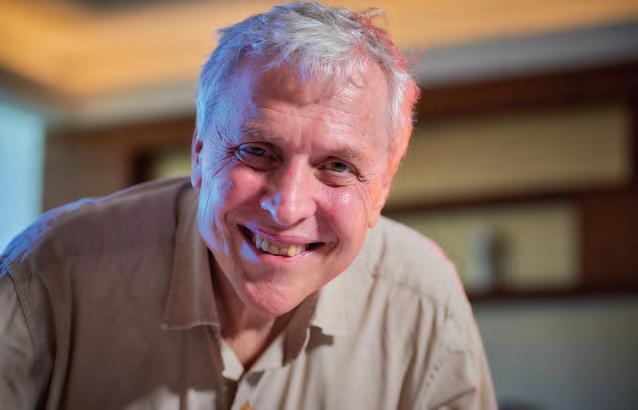
Este grupo se encargaba de repartir una publicación como “Tonight’s Boxing Program” afuera de las arenas en las noches de combate. Majeski relata que era una actividad que tenían que hacer con mucho cuidado porque hacer eso en aquel entonces era ilegal. El agente señaló que recorrían estados cercanos para poder publicitar estos panfletos.
“Posteriormente, conseguí un trabajo en Boxing Illustrator, esto me ayudó a viajar a lugares como California, Sudamérica y México, donde conocí a grandes peleadores como José Nápoles, Carlos Monzón, entre otros”.
Su acercamiento para comenzar a organizar peleas llegaría cuando el neoyorquino trabajó con el legendario Don King. Ahí organizó combates de la talla de Carlos Monzón contra Víctor Galindez en el Madison Square Garden y Roberto Durán con Edin Viruet.
Después de esta experiencia, Don Majeski trabajaría con otros grandes promotores y managers como Frank Warren, Barry Hearn, Butch Lewis, Bob Arum, Bill Mordey entre muchos otros a lo largo de los años. Se volvió un experto en saber valorar a los boxeadores más allá de lo que indican sus números y se ha caracterizado por buscar siempre que se den los grandes enfrentamientos.
“El WBC ha sido como mi familia. Mauricio Sulaimán me ha apoyado a lo largo de los años y creo que sin esta organización no podría trabajar dentro del deporte como lo hago ahora”.
FROM A young age, Don knew his destiny was tied to the boxing ring, especially after hearing the story of the rematch between Muhammad Ali and Sonny Liston. However, his love affair with the sport would truly solidify when he attended his first live event, where José Torres defended his world championship against Wayne Thornton at Shea Stadium.
"At that time, the laws prevented anyone under 14 from attending a boxing event alone, so I had to convince my mother to take me to the show", Majeski recalled.
This dedication and live fight knowledge allowed him to become even more involved in the sport, leading to his first opportunity to work within the boxing realm.
"I was at Madison Square Garden expressing my frustration about not seeing top fighters like José Nápoles in New York. Johnny Bos, Jack Obermayer, and Malcolm Gordon heard this and invited me to sit with them. That's where our friendship began", he detailed.
This group distributed a publication called "Tonight's Boxing Program" outside arenas on fight nights. Majeski explains that they had to be careful because this was illegal then. The agent mentioned they traveled to nearby states to advertise these pamphlets.
"Later on, I got a job at Boxing Illustrator, which allowed me to travel to places like California, South America, and Mexico, where I met great fighters like José Nápoles and Carlos Monzón, among others".
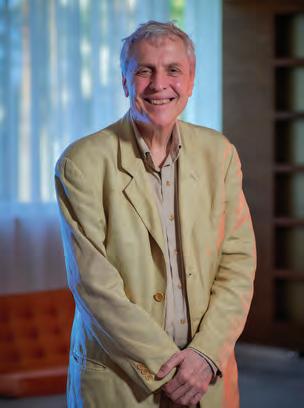
His path to organizing fights would begin when he worked with the legendary Don King. There, he managed bouts like Carlos Monzón vs. Víctor Galindez at Madison Square Garden and Roberto Durán vs. Edin Viruet.
After this experience, Don Majeski would work with other prominent promoters and managers like Frank Warren, Barry Hearn, Butch Lewis, Bob Arum, and Bill Mordey, among many others throughout the years. He became an expert at valuing boxers beyond their records and is known for always seeking to make great matchups happen.
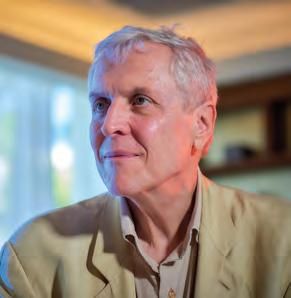
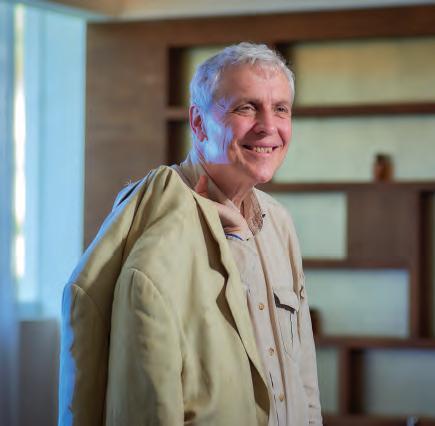
• Born on October 31, 1952, in Elmhurst, Queens.
• He has left his mark on the sport, serving as an international agent for over 50 years and in various positions to make significant fights happen.
• For 25 years, he has been part of the acceptance committee for the International Boxing Hall of Fame.
• Don is recognized in the industry for his extensive knowledge of current boxing affairs and every athlete in the discipline.
Don Majeski has been an agent and matchmaker in boxing for over 60 years. He is among the best storytellers in the sport, gifting us with historic fights and behind-thescenes memories.
Jaime Higuera MariñelarenaRoberto Tetlalmatzin Luis E. González Traducción: Mariana Torres
"The WBC has been like family to me.
Mauricio Sulaimán has supported me throughout the years, and without this organization, I couldn't work in the sport as I do now”.
Redacción LM
Cortesía F. IzquierdoINVOLUCRADO EN el mundo del boxeo durante más de 59 años, Akihiko Honda ha desempeñado un papel clave brillante en la promoción y el desarrollo del deporte en Japón y en todo el mundo. La visión de Honda como promotor se centra en presentar el boxeo como un deporte emocionante y respetado en todo el mundo, además de defender la seguridad y el bienestar de los boxeadores.
En 1964, tras el fallecimiento inesperado de su padre, Akira Honda, Honda, a la edad de 17 años, se convirtió en presidente de Teiken Promotions, el gimnasio de boxeo más antiguo de Japón. “Mi hermano, Ted, eligió otro camino en la vida, lo que determinó que mi destino estuviera inexorablemente ligado al boxeo”, recuerda. Mientras se desempeñaba como presidente de Teiken, Honda logra graduarse de la Universidad de Rikyo en 1969.
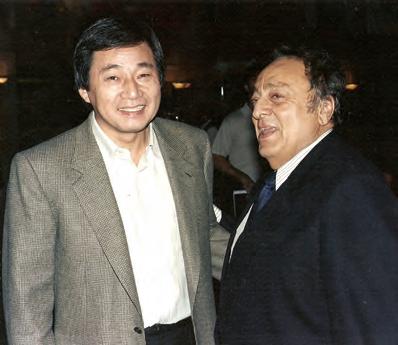
Continuando con el negocio de gestión y promoción del boxeo que inició su padre, Honda, junto con la señora Haru Nagano, quien fue la asistente administrativa de su padre, transformó con éxito a Teiken Promotions en la promotora de boxeo más exitosa e influyente de Japón. Conocida como "Gerente Nagano", Nagano tomó el manejo del gimnasio. A la edad de 98 años, todavía administra el gimnasio Teiken en la actualidad.
Detrás de su historia de éxito, es evidente que una considerable porción del reconocimiento y los logros obtenidos se atribuyen directamente a la semilla de inspiración que su
padre sembró. “Al crecer, mi padre era el presidente de Teiken Gym y desde que era niño me apasionaba el boxeo. Pasaba todos los días en el gimnasio llevándome bien con los boxeadores que eran mis amigos. Aprendí a respetar el deporte porque su base está en jóvenes humildes y de gran corazón que buscan ser campeones”, afirmó Honda.
El momento que marcó la vida y el destino de Honda y Teiken Promotions tuvo lugar 6 años después del fallecimiento de su padre. En 1970, Masao Ohba, procedente del Teiken Boxing Gym, noqueó a Berkrerk Chartvanchai en el 13º asalto en el Auditorio de la Universidad de Nihon en Tokio para convertirse en el campeón de peso mosca. Esta victoria permitiría a Teiken posicionarse como un gimnasio sólido que abriría puertas para ganar y asegurar contratos televisivos. “Esa victoria cambió el rumbo de nuestra empresa”, dijo Honda.
En 1988, Honda promocionaría con éxito la pelea de Mike Tyson vs. Tony Tubbs en el Tokyo Dome en el evento inaugural del lugar. También promovió la pelea histórica de Mike Tyson contra Buster Douglas en 1990. Actualmente, Honda respalda promociones de boxeo por título mundial en todo el planeta, incluida la exhibición del título mundial en Japón para Amazon Prime Video y programas mensuales de Dynamic Glove en U-Next. También es el proveedor de contenido exclusivo del programa de boxeo Excitematch de WOWOW, el programa
de mayor duración en WOWOW. Honda admite que mantener varios programas de televisión ha sido un desafío.
En el ring, Honda ha traído numerosos campeones mundiales. Solo algunos de los peleadores en la larga lista de campeones que ha manejado incluyen al campeón de peso mosca Masao Ohba, al campeón de peso welter ligero del WBC Tsuyoshi Hamada, al dos veces campeón mundial Gernaro Hernández, al campeón de peso súper mosca del WBC José Luis Bueno, al tres veces campeón mundial Joichiro Tatsuyoshi, al campeón mundial de tres divisiones, Jorge Linares; al campeón de peso súper gallo del WBC, Toshiaki Nishioka; al campeón de peso gallo del WBC, Shinsuke Yamanaka; al campeón mundial de cuatro divisiones, Román González; al campeón mundial de dos divisiones, Jesse Rodríguez y al medallista de oro olímpico y campeón de peso mediano Ryota Murata.
Por todos sus logros en el boxeo, Honda ha sido incluido en el Salón de la Fama Internacional en Canastota, Nueva York, así como en el Salón de la Fama del Boxeo de California.
Las contribuciones de Honda al boxeo van más allá de su papel como promotor y mánager. Ha hecho enormes contribuciones a la industria del boxeo. Ha sido reconocido por sus esfuerzos para llevar a la primera convención del WBC de 2002 a Tokio. La relación de Honda con el Consejo Mundial de Boxeo se remonta al inicio del organismo sancionador y afirmó que “La relación con mi amigo el señor José Sulaimán, a quien yo respetaba mucho, fue una persona muy importante en mi vida en el boxeo y a nivel personal”.
INVOLVED IN the world of boxing for over 59 years, Akihiko Honda has played a brilliant key role in promoting and developing the sport in Japan as well as globally. Honda’s vision as a promoter is focused on presenting boxing as an exciting and respected sport around the world, as well as advocating for the safety and well-being of boxers.
In 1964, after an unexpected passing of his father, Akira Honda, Honda at the age of 17 became the President of Teiken Promotions, the oldest boxing gym in Japan. “My brother, Ted, chose another path in life, which determined that my destiny was inexorably linked to boxing”, he recalls. While serving as the President of Teiken, Honda manages to graduate from Rikyo University in 1969.
Carrying on the Boxing Promotion and Managing Business that his father has started, Honda, along with (Ms.) Haru Nagano, who was his father’s administrative assistant, has successfully transformed Teiken Promotions into the most successful and influential boxing promotion in Japan. Known as “Nagano Manager”, Nagano took the lead at the gym. At the age of 98, she still manages the Teiken Gym today.
Behind his success story, much of his credit and the harvest reaped, goes to the seed of inspiration that his father planted. “Growing up, my father was the president of Teiken Gym and ever since I was a child I was passionate about boxing. I
spent every day in the gym getting along with the boxers who were my friends. I learned to respect the sport because it’s foundation lays on humble young people with big hearts who seek to be champions” stated Honda.
The moment that shaped the life and destiny for Honda and Teiken Promotions took place 6 years after his father´s passing. In 1970, Masao Ohba, hailing from Teiken Boxing Gym, knocked out Berkrerk Chartvanchai in the 13th round at the Nihon University Auditorium in Tokyo to become the Flyweight Champion. This victory would allow Teiken to be positioned as a solid gym and opened doors to gain and secure television contracts. “That victory changed the course of our company” said Honda
In 1988, Honda would successfully promote the Mike Tyson vs. Tony Tubbs at the Tokyo Dome in the venue’s inaugural event. He has also promoted the historical upset bout of Mike Tyson vs. Buster Douglas in 1990. Honda currently promotes world title boxing promotions world wide including world title show in Japan for Amazon Prime Video and monthly Dynamic Glove shows on U-Next. He is also the exclusive content provider for WOWOW’s Excitematch boxing program, the longest running program on WOWOW. Honda admits that maintaining various television programs has been a challenge.
In the area of fighter management, Honda has brought up numerous world champions. Just a few of the fighters on the long list of champions he has managed includes Flyweight Champion Masao Ohba, WBC Light Welterweight Champion Tsuyoshi Hamada, Two Time World Champion Gernaro Hernandez, WBC Super Flyweight Champion José Luis Bueno, Three Time World Champion Joichiro Tatsuyoshi, Three Division World Champion Jorge Linares, WBC Super Bantamweight Champion Toshiaki Nishioka, WBC Bantamweight Champion Shinsuke Yamanaka, Four Division World Champion Roman Gonzalez, Two Division World Champion Jesse Rodriguez and Olympic Gold Medalist and Middleweight Champion Ryota Murata.
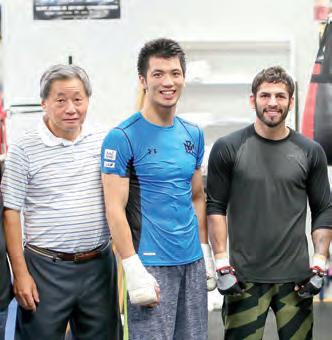
For all of his accomplishments in boxing Honda has been inducted in International Hall of Fame in Canastota, New York as well as California Boxing Hall of Fame.
Honda’s contributions to boxing, goes beyond his role as a promoter and manger. He has made enormous contributions to the boxing industry. He has been recognized in his efforts to assist the 2002 WBC’s first convention in Tokyo. Honda’s relationship with the WBC goes back to the beginning of the sanctioning body and stated that “The relationship with my friend Mr. (Jose) Sulaimán, who I respected highly and was a very important person in my life in boxing and on a personal level”.
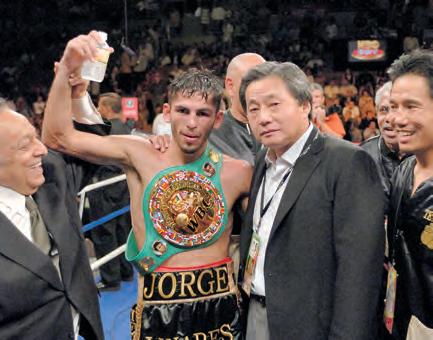
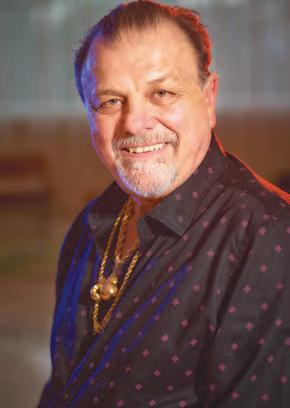
Algunas figuras dentro del boxeo han contribuido al mismo por su habilidad arriba del cuadrilátero y otras por lo que han dejado al deporte abajo del ring. Sampson Lewkowicz ha impulsado la disciplina de los puños al descubrir talentos que se encuentran usualmente ocultos y llevándolos a los mejores escenarios para hacerlos brillar aún más.
ser dueño de un restaurante hasta estar a cargo de una tienda de electrónica en la quinta avenida.
“Fue gracias a que yo estaba colocado en este lugar que pude atender a varias celebridades, entre esas personas conocí a José Sulaimán. Después de varios años en los que él pasó por ahí me comentó que yo haría un gran bien para el boxeo si me dedicara a eso, esto por el conocimiento que tenía yo de este deporte de los años 80 que salió a relucir en las múltiples pláticas que tuvimos”, recordó el asesor.
De esta manera, logró iniciar su recorrido en la industria como manager para luego ascender a la posición de matchmaker. Fue en este rol que fue reconocido como ‘Matchmaker de la década’.
Dentro de esta labor fue cuando descubrió a una de las estrellas que cambiaría el deporte por los próximos años Manny Pacquiao.
Representa a grandes figuras del deporte como Sergio “Maravilla” Martínez, Jeison Rosario, Jorge “La Hiena” Barrios, Hanna Gabriels, Magomed Abdusalamov, Javier Fortuna, Gabriel Campillo y David Benavides.
PERFIL
“DESDE MUY joven tenía un gran interés por el boxeo, pero rápidamente me di cuenta de que no iba a ser un gran atleta o ser una figura dentro del ring. Me faltaba la disciplina necesaria para poder pelear correctamente con tres peleas amateurs termine colgando los guantes”, confesó el uruguayo-americano.
Sin embargo, la verdadera vocación de Sampson llegaría años después tras viajar a los Estados Unidos en busca de oportunidades donde intentó desarrollarse en varios negocios desde
“Vi un video de sus primeras peleas, tuve que observar en cámara lenta el combate para apreciar muchos de sus golpes y ahí noté que tenía un gran gancho de izquierda. Muchos no lo tomaban en cuenta porque era un peleador pequeño de un país poco conocido, pero tras esa demostración sabía que tenía que firmarlo”, describió.
Poco tiempo después el filipino firmaría un contrato con M&M Sports, empresa donde se desempeñaba Lewkowicz en aquel momento. Posteriormente conseguiría noquear al campeón sudafricano Lehlo Ledwaba y el resto sería historia.
Es así como Sampson ha dejado un legado imborrable en el boxeo no solo detectando grandes talentos que serán los protagonistas del futuro, sino que también organizando grandes eventos que los aficionados aún conservan en sus memorias.
• Nació el 10 de enero de 1951 en Montevideo, Uruguay. Presidente de la agencia Sampson Boxing, la cual representa y aconseja boxeadores.
•Fue el principal impulsor del “Nuevo Amanecer del Boxeo Uruguayo”, movimiento que busca detectar y desarrollar nuevos talentos en el país sudamericano.
Consiguió darle su primer título de mundial de boxeo a Uruguay al apoyar a la exmodelo Cecilia “La Reina” Comunales.
“Después de vencer al cáncer tengo planeado contribuir aún más en ayudar al boxeador. Creé el ‘Torneo Mercosur’, que está dedicado a don José Sulaimán, con esto busco contribuir a que surjan cada vez más talentos”.
Represents prominent sports figures such as Sergio "Maravilla" Martínez, Jeison Rosario, Jorge "La Hiena" Barrios, Hanna Gabriels, Magomed Abdusalamov, Javier Fortuna, Gabriel Campillo, and David Benavides.
Some figures in boxing have contributed to the sport through their prowess in the ring, while others have left their mark outside. Sampson Lewkowicz has propelled boxing by unearthing hidden talents and guiding them to the grandest stages, where they shine even brighter.
"FROM A VERY young age, I had a strong interest in boxing, but I quickly realized that I wouldn't become a great athlete or a prominent figure inside the ring. I lacked the discipline to fight effectively; after three amateur fights, I hung up the gloves", confessed the Uruguayan-American.
However, Sampson's true calling would emerge years later when he journeyed to the United States in search of opportunities. He attempted various businesses, from owning a restaurant to managing an electronics store on Fifth Avenue.
"It was due to my position in that store that I had the chance to serve several celebrities. Among them, I met José Sulaimán. After a few years, during which he visited the store, he told me that I could do a great service to boxing if I dedicated myself to it. He recognized my
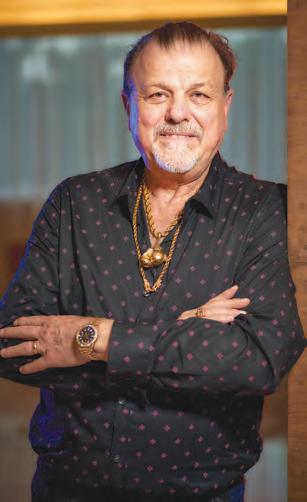
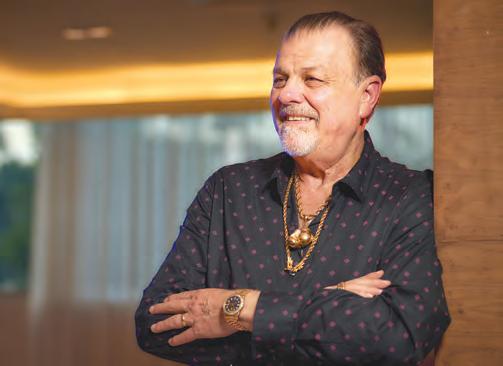
• Born on January 10, 1951, in Montevideo, Uruguay. President of Sampson Boxing Agency, which represents and advises boxers.
• Endorsed the "New Dawn of Uruguayan Boxing," a movement dedicated to discovering and nurturing new talents in the South American country, and contributed to Uruguay's first world boxing title by supporting former model Cecilia "La Reina" Comunales.
knowledge of the sport from the 1980s, which surfaced in our numerous conversations", recalled the advisor.
In this manner, he embarked on his path in the industry, starting as a manager before advancing to the position of matchmaker. In this role, he earned the title of 'Matchmaker of the Decade'.
During this tenure, he discovered one of the stars who would shape the sport for years – Manny Pacquiao.
"I watched a video of his early fights; I had to slow down the footage to appreciate many of his punches. There, I noticed his powerful left hook. Many dismissed him because he was a small fighter from a lesser-known country, but after witnessing that display, I knew I had to sign him", he described.
Not long after, the Filipino boxer signed a contract with M&M Sports, which Lewkowicz was associated with at the time. Subsequently, Pacquiao would knock out South African champion Lehlo Ledwaba, and the rest would become history.
Thus, Sampson has left an indelible legacy in boxing by identifying future talents and organizing monumental events still in fans' memories.
"After overcoming cancer, I plan to contribute even more to assisting boxers. I created the 'Mercosur Tournament,' dedicated to Don José Sulaimán. With this, I aim to foster the emergence of more talents".
Con la visión y ambición de que todos los deportistas tengan una carrera limpia, ejemplar y un retiro digno, Ricardo Chew fundó RCH Sports & Entertainment, una empresa de consultoría legal y migratoria que brinda asesoría, seguimiento y respaldo en cualquier tipo de trámite que este sector requiera.
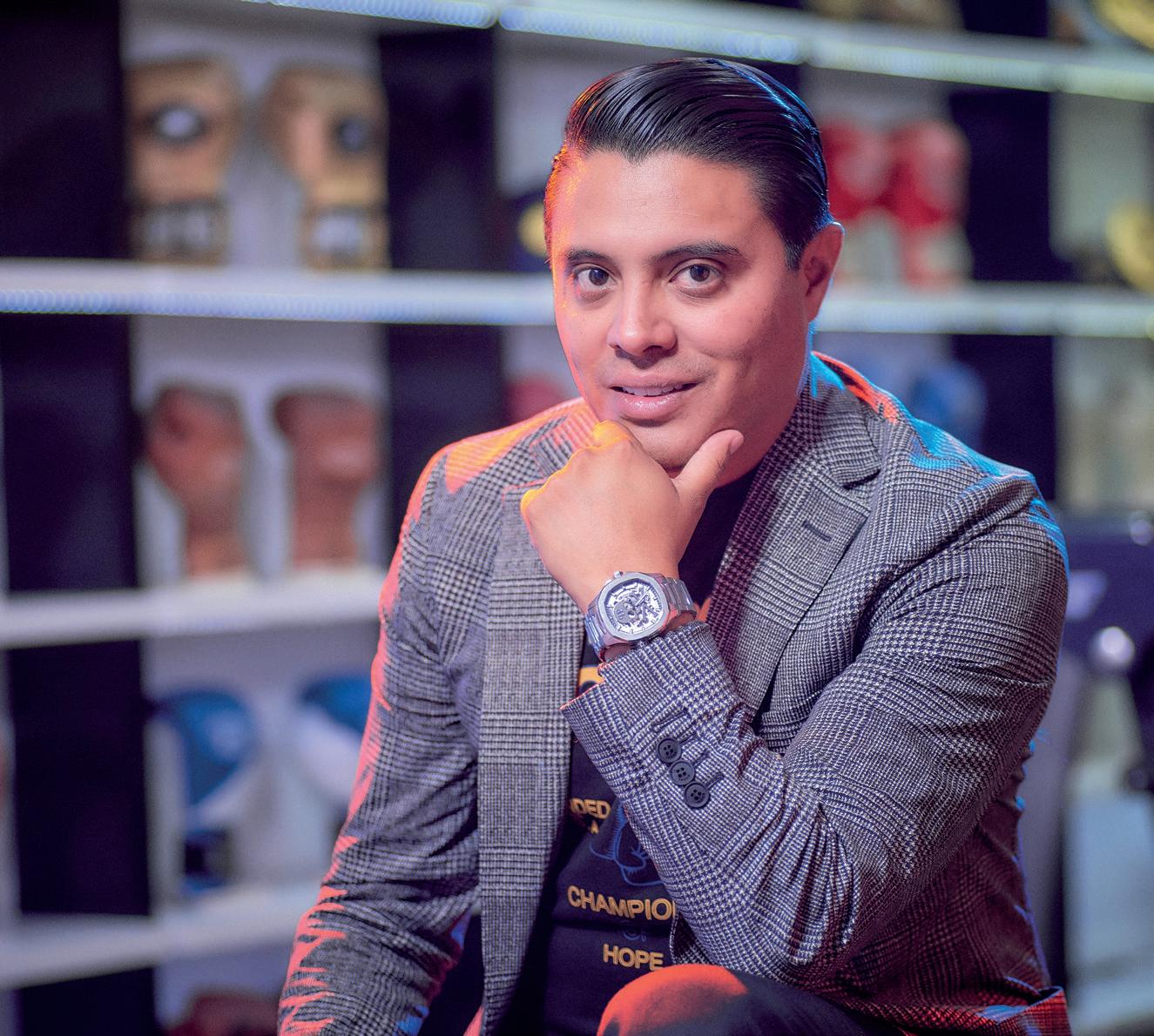
“RCH SPORTS & ENTERTAINMENT inició siendo una empresa de servicios migratorios, comenzamos con algunos beisbolistas, mi primer cliente, hoy gran amigo fue Yuli Gurriel de los Miami Marlins y poco a poco fuimos creciendo hacia otros ámbitos deportivos como es el boxeo. Gracias a la confianza de nuestros clientes, comenzamos en Houston y ahora tenemos oficinas en la Ciudad de México y Madrid,” explicó este joven abogado y emprendedor, quien previo a fundar su propia consultoría tuvo una exitosa carrera política.
Al inicio “nos dedicamos únicamente a la migración, sin embargo, a mí me gusta mucho involucrarme 100% con mis clientes. Me gusta conocerlos, saber cómo piensan, quiénes son, de dónde vienen, qué sueñan, cómo se ven retirados y es donde surge la idea de ofrecerles una asesoría legal integral, que va desde lo migratorio hasta lo civil, penal, fiscal, hasta la representación y manejo de la carrera, asesoría inmobiliaria, manejo de crisis y ahorro para el retiro”.
“RCH SPORTS & ENTERTAINMENT initially started as an immigration services company. We began with some baseball players; my first client and now a close friend was Yuli Gurriel from the Miami Marlins and little by little, we expanded into other sports areas such as boxing. Thanks to the trust of our clients, we started in Houston and now have offices in Mexico City and Madrid”, explained this young lawyer and entrepreneur, who had a successful political career before founding his consultancy.
Initially, “we focused solely on immigration, but I like to be 100% involved with my clients. I like to get to know them, understand their thoughts, who they are, where they come from, what their dreams are, and how they envision themselves in retirement, and that’s where the idea of offering comprehensive legal advice comes from; this ranges from immigration to civil, criminal, tax law, career representation and management, real estate advice, crisis management, and retirement savings”.

With the vision and ambition that all athletes have a clean, exemplary career and a dignified retirement, Ricardo Chew founded RCH Sports & Entertainment. This legal and immigration consulting company provides advice, monitoring, and support in any process required by this sector.Lilian Reyes Berriel Roberto Tetlalmatzin F. Izquierdo RICARDO CHEW LÓPEZ CEO and Founder of RCH Sports & Entertainment
“Me siento privilegiado de aportar un poco de mi conocimiento migratorio dentro del Consejo Mundial de Boxeo liderado por mi gran amigo Mauricio Sulaimán, a quien siempre le expreso mi reconocimiento por su gran conducción y liderazgo dentro de este deporte, que a mi parecer hoy vive nuevamente una época dorada y con millones de seguidores a lo largo del mundo que esperan ansiosamente el fin de semana para ver las grandes carteleras que se presentan”.
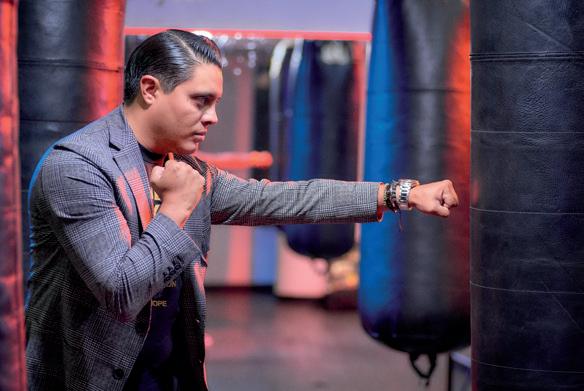
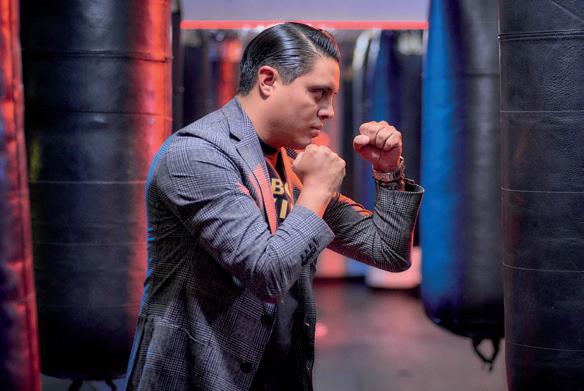
“I feel privileged to contribute my immigration knowledge within the World Boxing Council led by my good friend Mauricio Sulaimán, to whom I always express my admiration for his remarkable guidance and leadership in this sport. In my opinion, boxing is experiencing another golden age today, with millions of fans worldwide eagerly awaiting weekends to watch the great fight cards”.
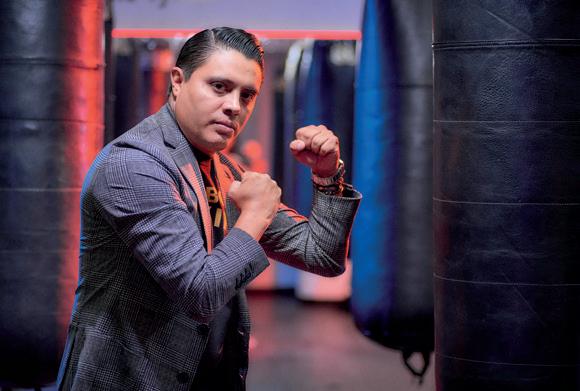
Para Ricardo Chew ver atletas desarrollados dejando huella en su carrera es lo más importante, por ello desde su consultoría se aseguran de que cualquier deportista que busque ayuda con ellos, se preocupe solamente por ser el mejor.
“Comenzamos con el tema del visado porque consideramos que esto es algo muy importante. La mayoría de los deportistas, por el propio desconocimiento y la emoción por querer llegar a trabajar a otro país, firman un contrato, se ponen la camiseta o están listos para subir al ring y no se fijan en un pequeño gran detalle que es el poder tener una situación migratoria de manera legal”.
Agregó que “hay deportistas que pueden estar en su apogeo, pero muchas veces mal asesorados, entonces, en algunas ocasiones los pueden mandar a trabajar con una visa de turista y terminan siendo deportados. Es importante también ayudarlos para que estén regularizados en su situación migratoria”.
Para Ricardo Chew todos los deportistas son importantes, por ello apoyan desde el que va comenzando su carrera hasta a el más consolidado.
“Apoyamos todo tipo de deportistas, no solo trabajamos con los de gran nombre. Nos gusta mucho apoyar desde los jóvenes que están en formación. Por ejemplo, hoy en día, hay un torneo en Texas que es un semillero de boxeadores llamado The Big Belt Championship, avalado por el Consejo Mundial de Boxeo en el cual los peleadores van a pelear a diversos sitios del Estado. Son jóvenes que tienen ninguna pelea, están comenzando y muchos no tienen el dinero para pagar una visa, no tienen un representante y no tienen un equipo. Esa es la clase de personajes en las cuales nos apasiona poder apoyar en un visado, porque sabemos que los estamos ayudando a crecer”.
Para este apasionado del pugilismo, es muy importante apoyar el talento joven ya que “a los jóvenes jamás debemos de cerrarle las puertas, siempre hay que impulsarlos porque no sabremos dónde estaremos el día de mañana y dónde estarán ellos”.
For Ricardo Chew, it is paramount to see developed athletes leave their mark on their careers. Hence, from his consultancy, they ensure that any athlete seeking help only worries about being the best.
“We started with the visa issue because we consider it vital. Most athletes, due to their lack of knowledge and the excitement of wanting to work in another country, sign a contract, put on the jersey, or get ready to step into the ring without paying attention to a crucial detail: having legal immigration status”.
He added, “Some athletes might be at their peak but often receive inadequate advice. Sometimes they are sent to work with a tourist visa and are deported. It’s important to help them regularize their immigration status”.
For Ricardo Chew, every athlete matters, so they support both: those starting their careers and those already established.
“We support all types of athletes, not just the big names. We enjoy supporting young athletes in their training stages. For instance, the World Boxing Council endorsed a boxing tournament in Texas called The Big Belt Championship. Young fighters compete at various venues across the state. These fighters might have yet to have any fights; they’re just starting, and many can’t afford a visa or have a representative or a team. Those are the kinds of individuals we’re passionate about assisting with visas because we know we’re helping them grow”.
For this boxing enthusiast, supporting young talent is crucial as “we should never close doors to young people; we must always encourage them because we don’t know where we’ll be tomorrow and where they’ll be”.
https://rchsportsandentertainment.com

01
Jesús Mena, el Hijo del Santo, Carlos Padilla, Don Olegario Vázquez Raña, Mauricio Sulaimán y Marijose Alcalá
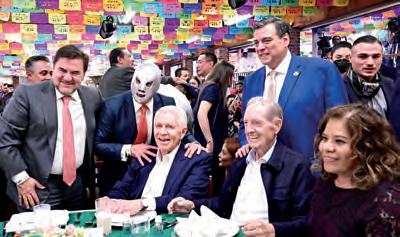
02
Los hermanos Sulaimán, Fernando, Lucy, Pepe, Claudia, (Miguel A. Jurado) Mauricio y Héctor.
03
Daniel Aceves, Fernando Schwartz y Francisco Posada.
04
El Artista Chingón recordando a Don José Sulaimán.
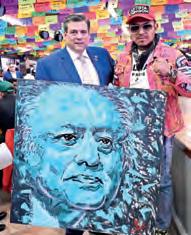
05
Thanapol Bhakdibhumi entrega cinturón especial a Mauricio Sulaimán.
Este 2023 marca un hito significativo en el mundo del boxeo, ya que el Consejo Mundial de Boxeo celebra su sexagésimo aniversario. Desde su fundación en 1963, el WBC ha desempeñado un papel crucial en la promoción, regulación y desarrollo del boxeo a nivel mundial.
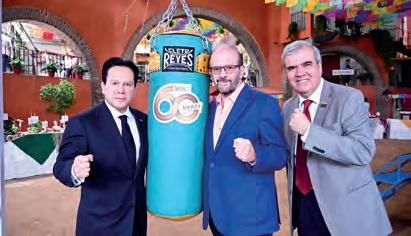
A LO LARGO de estas seis décadas, el Consejo ha trabajado incansablemente para elevar los estándares de este deporte, implementando reglas y regulaciones que garantizan la seguridad de los boxeadores y la integridad de las competiciones. Su labor ha contribuido al crecimiento y popularidad continuos del boxeo como un espectáculo deportivo global.
El aniversario número 60 es una oportunidad para reflexionar sobre los logros del WBC y su impacto en el boxeo. Desde la creación de campeonatos en diversas categorías de peso hasta su labor en la lucha contra el dopaje y la promoción de la equidad en el deporte.

05
It will be a significant year for boxing in 2023, as the World Boxing Council (WBC) marks its sixtieth anniversary. The WBC has been instrumental in promoting, regulating, and advancing boxing worldwide since its establishment in 1963.
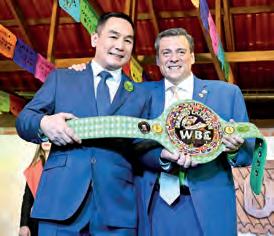
THROUGHOUT THESE six decades, the Council has tirelessly worked to elevate the standards of this sport, implementing rules and regulations that ensure the safety of boxers and the integrity of competitions. Its efforts have contributed to the continued growth and popularity of boxing as a global sporting spectacle.
The 60th anniversary offers an opportunity to reflect on the WBC's achievements and its impact on boxing, from creating championships in various weight categories to its work in combating doping and promoting equity in the sport.

El legado que ha dejado José Sulaimán Chagnón, desde que tomó la presidencia del WBC, en 1975, perdura y su influencia continúa dando forma al emocionante mundo del boxeo.
Con el fin de conmemorar esta significativa ocasión, familiares y amigos provenientes de diversas naciones se congregaron en el imponente Centro de Banquetes Arroyo, situado al sur de la Ciudad de México, para llevar a cabo una celebración de gran magnitud.
Roberto Durán, Evander Holyfield, Julio César Chávez, Humberto “Chiquita” González, Pipino Cuevas, Rafael Márquez, José Luis Castillo, Carlos Zárate, Alfonso Zamora, Ana María Torres, Rubén Olivares, César Bazán y Devin Haney, entre muchos otros, fueron algunos de los protagonistas en la celebración.
Las bandas de mariachis y marimba interpretaron alegremente durante la celebración. El punto álgido musical fue el tenor José Manuel Chu cantando un popurrí de favoritos, destacando A Mi Manera, la canción predilecta de todos los tiempos de Don José Sulaimán, en cuyo honor se realizó este emotivo evento.
Lucy Sulaimán, resumió la influencia de su padre al destacar que, como presidente, vetó a Sudáfrica hasta que el apartheid fue erradicado, ejemplificando su valentía, compromiso y coherencia entre pensamiento, creencias y acción.
06 Héctor Sulaimán, Laurence Cole (Referí) y Roberto "Manos de Piedra" Durán.
07 Ana María "la Guerrera" Torres, Campeona Diamante WBC.
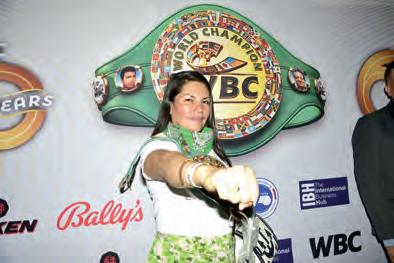
08 Evander Holyfield, Ex Campeón WBC.
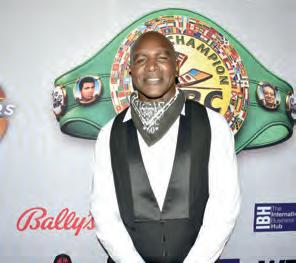
09 La gran amistad entre Julio César Chávez y Mauricio Sulaimán.
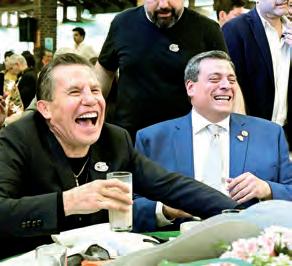
10 Evander Holyfield con Isaac "el Pitbull" Cruz, su papá y Mauricio Sulaimán Jr.
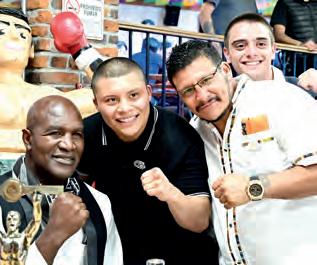
The legacy left by José Sulaimán Chagnón after taking over the WBC presidency in 1975 endures, and his influence continues to shape the thrilling world of boxing.
To commemorate this significant occasion, relatives and friends from various nations gathered at the impressive Arroyo Banquet Center in the southern part of Mexico City for a grand celebration.
Roberto Durán, Evander Holyfield, Julio César Chávez, Humberto "Chiquita" González, Pipino Cuevas, Rafael Márquez, José Luis Castillo, Carlos Zárate, Alfonso Zamora, Ana María Torres, Rubén Olivares, César Bazán, and Devin Haney, among many others, were some of the protagonists at the celebration.
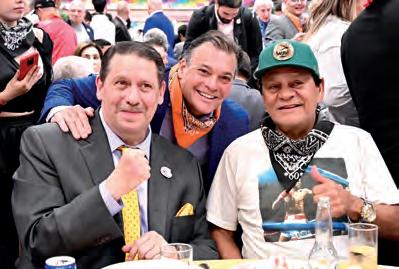
Mariachi bands and marimba played joyfully during the event. The musical highlight was tenor José Manuel Chu performing a medley of favorites, with "My Way" – Don José Sulaimán's all-time favorite song – standing out. This moving event was held in his honor.
Lucy Sulaimán summarized her father's influence by highlighting how, as president, he banned South Africa until apartheid was eradicated, exemplifying his courage, commitment, and consistency between thoughts, beliefs, and actions. "This time, it's just a big party, and I love that the WBC family is celebrating".
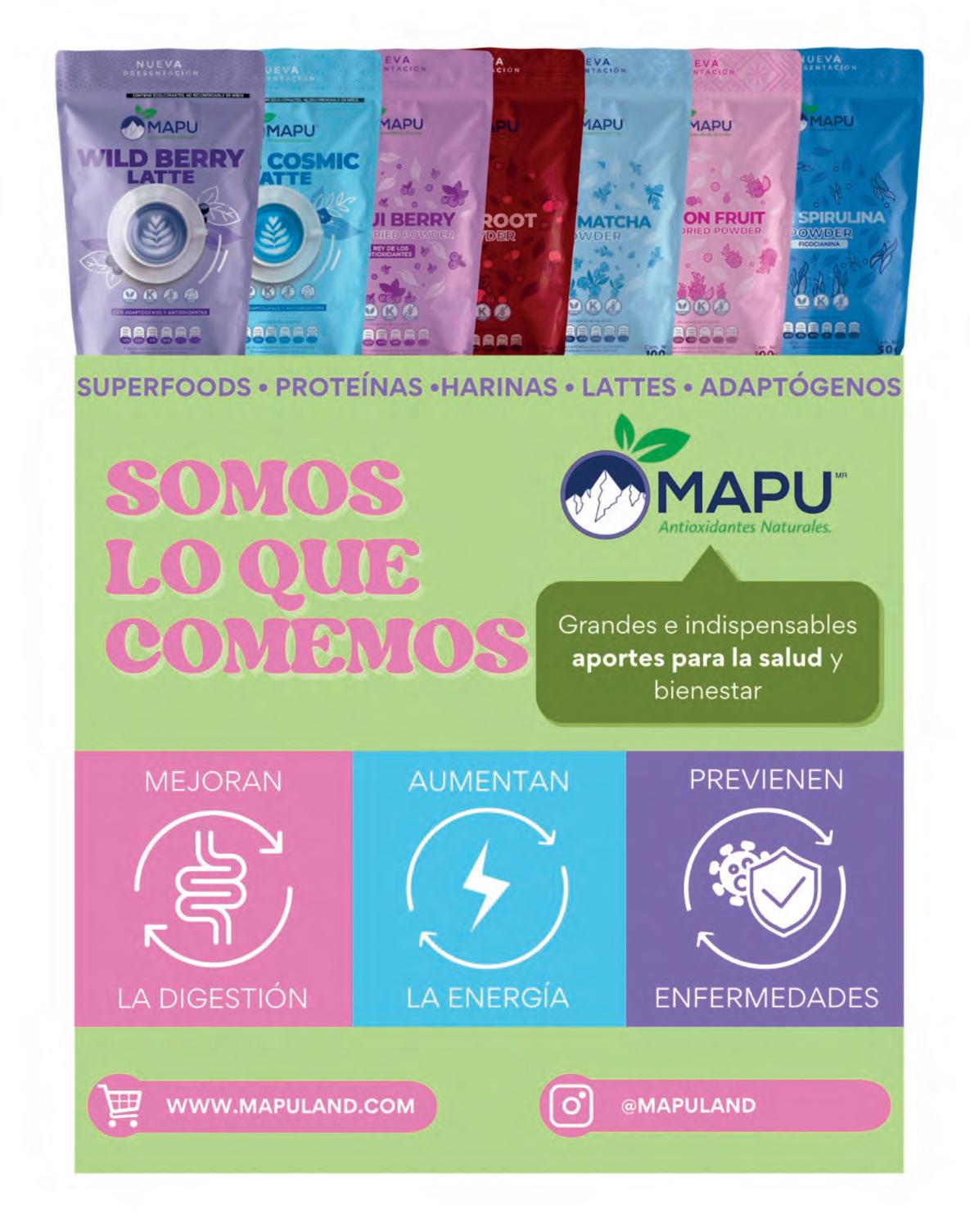
“Esta vez, es solo una gran fiesta y me encanta que la familia WBC celebre”.
El actual presidente del WBC, Mauricio Sulaimán, dijo: “Hoy es el sexagésimo aniversario del Consejo Mundial de Boxeo y lo celebramos en el cumpleaños de mi padre. Estamos muy felices de estar con tantos amigos de todo el mundo. Es una gran celebración”.
Mauricio destacó los cambios e innovaciones del WBC en sus 60 años, tales como la reducción de los rounds de pelea de título mundial de 15 a 12 para disminuir riesgos.
“La resistencia al cambio es un denominador común. Mi padre y el WBC pudieron poner y colocar los cambios que realmente se necesitaban para salvar tantas vidas”, comentó Mauricio.
También comentó que se necesitarán cambios en la ceremonia de pesaje y su procedimiento, incluido el enfrentamiento y mencionó que la reciente multa de 400 mil dólares por el incidente del empujón es un primer paso.
En un tono más optimista, Mauricio destacó una lista impresionante de legendarios campeones de todos los tiempos del WBC, desde Muhammad Ali y Mike Tyson hasta Marvin Hagler, Roberto Durán, Julio César Chávez, Oscar De La Hoya, Floyd Mayweather, Alexis Argüello, Ricardo López y Saúl "Canelo" Álvarez. ¡La enumeración es simplemente inagotable!
The current WBC president, Mauricio Sulaimán, stated, "Today is the 60th anniversary of the World Boxing Council, and we celebrate it on my father's birthday. We are delighted to be with so many friends from around the world. It's a great celebration."
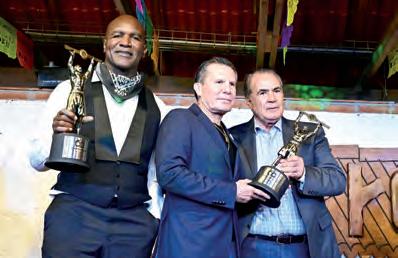
Mauricio highlighted WBC's changes and innovations over 60 years, such as reducing world title fight rounds from 15 to 12 to minimize risks. "Resistance to change is a common denominator. My father and the WBC managed to implement the changes that were truly needed to save so many lives", Mauricio commented.
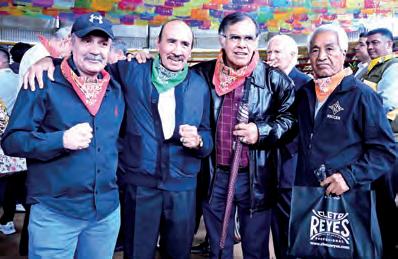
In a more optimistic tone, Mauricio listed an impressive array of legendary WBC champions throughout history, from Muhammad Ali and Mike Tyson to Marvin Hagler, Roberto Durán, Julio César Chávez, Oscar De La Hoya, Floyd Mayweather, Alexis Argüello, Ricardo López, and Saúl "Canelo" Álvarez. The enumeration is simply inexhaustible!
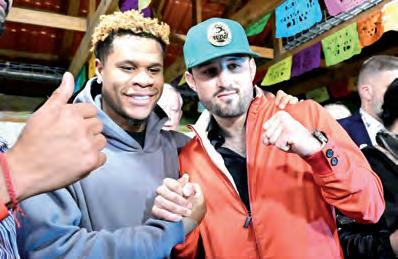
Julio César Chávez expressed his gratitude to Don José for giving him his first championship opportunity and said he would always consider him a father figure. Don José stood by his side during his most brutal battle against drug addiction, providing support during rehabilitation. Driven by this experience, Julio has established treatment clinics to help countless people overcome this disease.


17
Julio César Chávez, expresó su gratitud a Don José por otorgarle su primera oportunidad de campeonato y afirmó que siempre lo consideraría como un padre. Don José estuvo a su lado durante su batalla más difícil contra la adicción a las drogas, proporcionando apoyo durante la rehabilitación. Impulsado por esta experiencia, Julio ha establecido clínicas de tratamiento para ayudar a innumerables personas a superar esta enfermedad.
“El mejor recuerdo que tengo de Don José es este. Una semana antes de morir lo visité en el hospital y me dijo: ‘puedo morir en paz porque sé que estás limpio y no volverás a caer’. ¡Y hasta la fecha y al día de hoy lo he logrado!”, dijo Julio César.
Víctor Cota, Historiador y Director de Prensa del WBC, fue galardonado por su distinguida trayectoria y dedicación al Consejo Mundial de Boxeo. Es el único testigo, actualmente, de la histórica reunión inaugural del WBC en el Hotel Prado Alffer de Ciudad de México, en 1963.
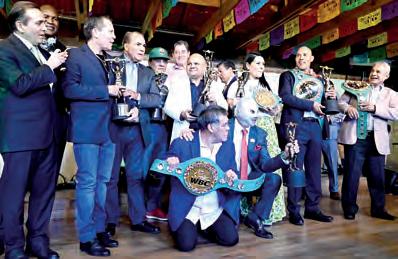
“Rafael ‘Cobrita’ Mendoza y yo estuvimos allí en esa reunión. Entonces todavía éramos casi adolescentes entre los gigantes y titanes del boxeo. Y el WBC se ha convertido desde entonces en la principal organización de boxeo. Siempre sirve y se preocupa por la salud y el bienestar de los boxeadores. Estoy muy feliz por este sexagésimo aniversario”, comentó Cota.

"The best memory I have of Don José is this. A week before he died, I visited him in the hospital, and he told me, 'I can die in peace because I know you're clean and won't fall again'. And to this day, I have achieved that!" Julio César exclaimed.
Víctor Cota, Historian and Press Director of the WBC, was honored for his distinguished career and dedication to the World Boxing Council. He is currently the sole witness to the historic inaugural meeting of the WBC at the Prado Alffer Hotel in Mexico City in 1963.
"Rafael 'Cobrita' Mendoza and I were there at that meeting. We were still almost teenagers among the giants and titans of boxing. Since then, the WBC has become the main boxing organization. It always serves and cares for the health and well-being of boxers. I'm very happy for this 60th anniversary", Cota remarked.
The grand champion Rubén Olivares, who also received a special award, said, "I'm grateful, happy, and delighted to win this award and to be at this memorable event".
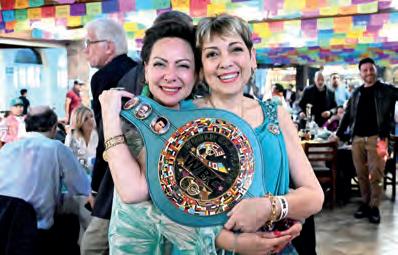
Former champion Evander Holyfield, with titles in cruiserweight and heavyweight divisions and an honored guest, commented, "Hey, I'm 60 years old too, and it's easier to maintain than to rebuild... Being heavyweight champion was the toughest because even though the boxers weren't as fast, they hit very hard, and it only took one punch".
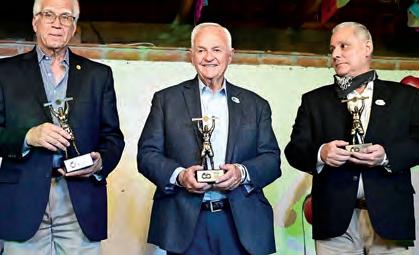
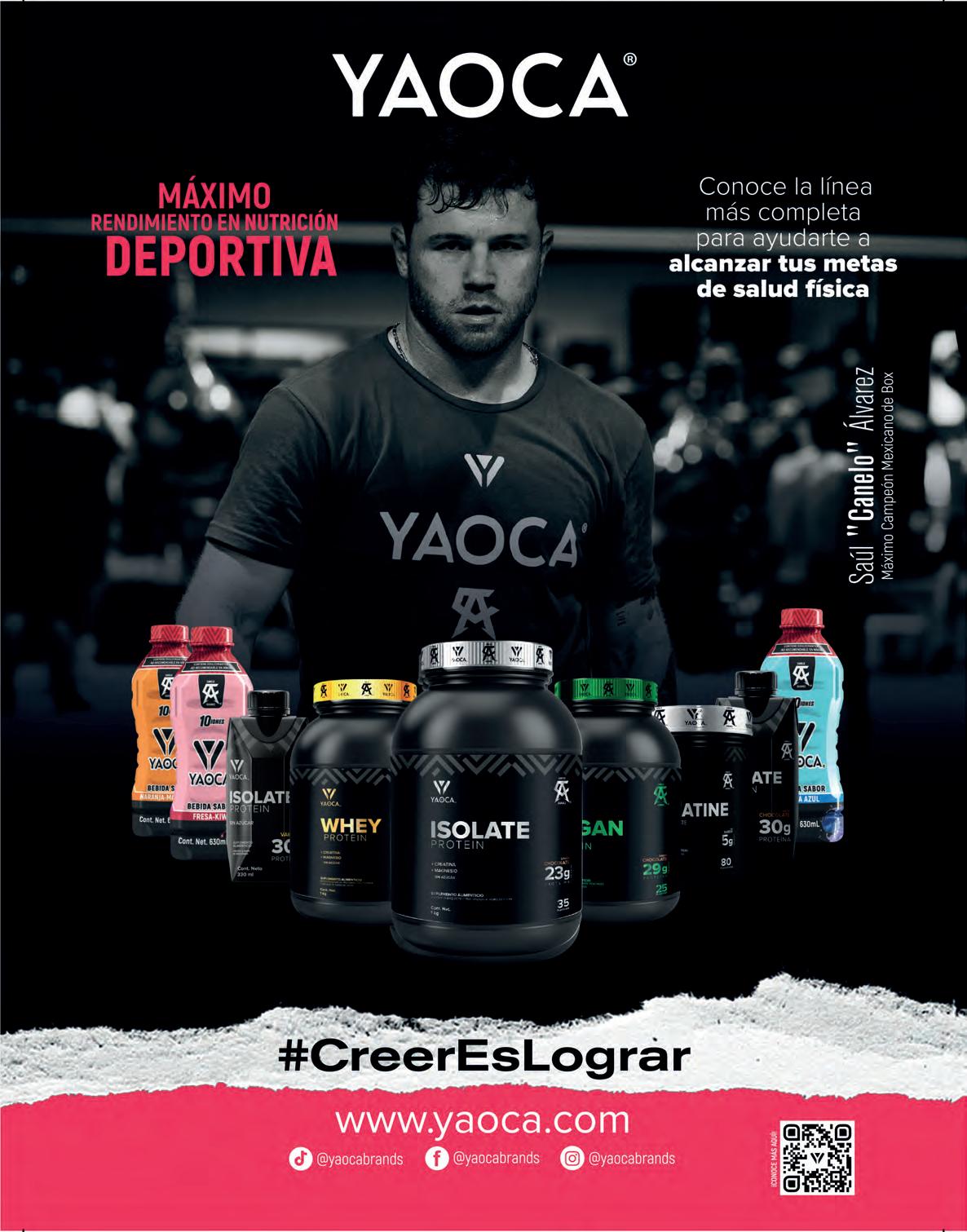
El gran campeón Rubén Olivares, quien también recibió un premio especial, dijo “Estoy agradecido, feliz y encantado de ganar este premio y de estar en este memorable evento”.
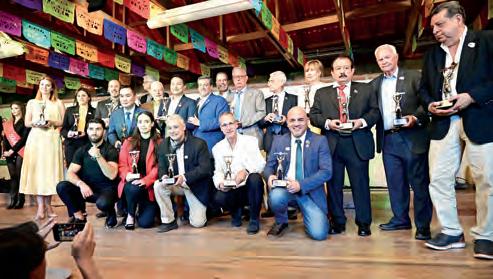
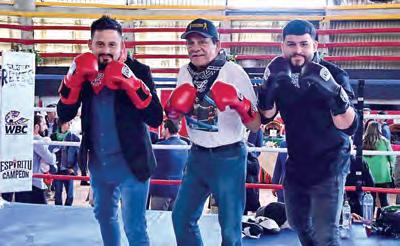
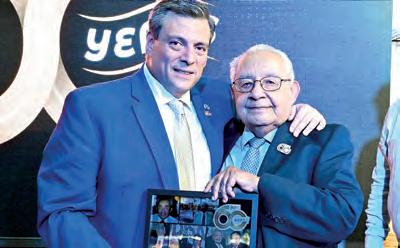
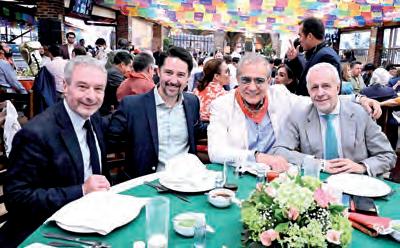

El ex campeón Evander Holyfield, con títulos en peso crucero y peso completo, y que fue invitado de honor, comentó: “Oye, también tengo 60 años y es más fácil mantener que reconstruir… Ser campeón de los pesos pesados fue lo más difícil, porque, aunque los boxeadores no eran tan rápidos, pegaban muy fuerte y solo se necesitaba un golpe”.
Evander elogió la claridad del WBC y dijo: “Cuando llegas a las organizaciones, en el WBC trabajan más duro. Se enorgullecen de lo que hacen y eso significa mucho”.
Para finalizar, Christiane Manzur, esposa de Mauricio Sulaimán y copresidenta del WBC Cares, desafía el antiguo adagio que relega a la mujer a un segundo plano detrás del hombre, optando en cambio por estar a su lado de manera activa. Su compromiso constante a lo largo de los años es destacable, una dedicación que tuvo inicio con Don José y que ahora perdura con Mauricio.
“Yo sé que cuando corre en la sangre y viene en familia, hay que hacerlo. Me gusta Mauricio ahí representando a su padre y todo lo que ha aprendido. Así que estoy muy contento, feliz y orgulloso de estar aquí a su lado”.
Evander praised the clarity of the WBC and said, "When you come to organizations, the WBC works harder. They take pride in their work, which means a lot".
To conclude, Christiane Manzur, wife of Mauricio Sulaimán and co-president of WBC Cares, defies the adage that relegates women to a background role behind men, instead choosing to stand by his side actively. Her consistent commitment over the years is remarkable, a dedication that began with Don José and now continues with Mauricio.
"I know that when it's in the blood, and it's in the family, you have to do it. I like Mauricio representing his father and everything he's learned. So I'm thrilled, proud, and pleased to be here by his side".
